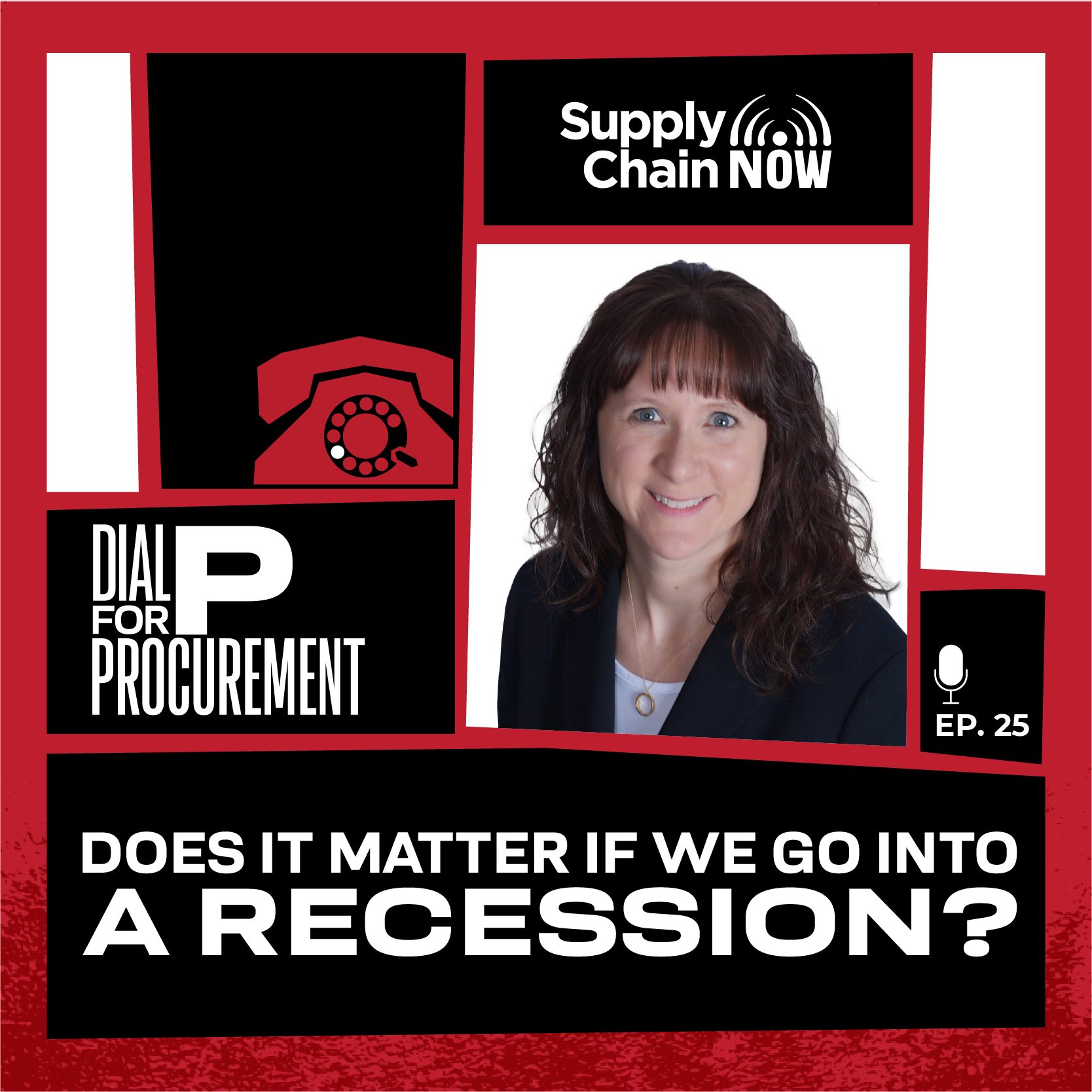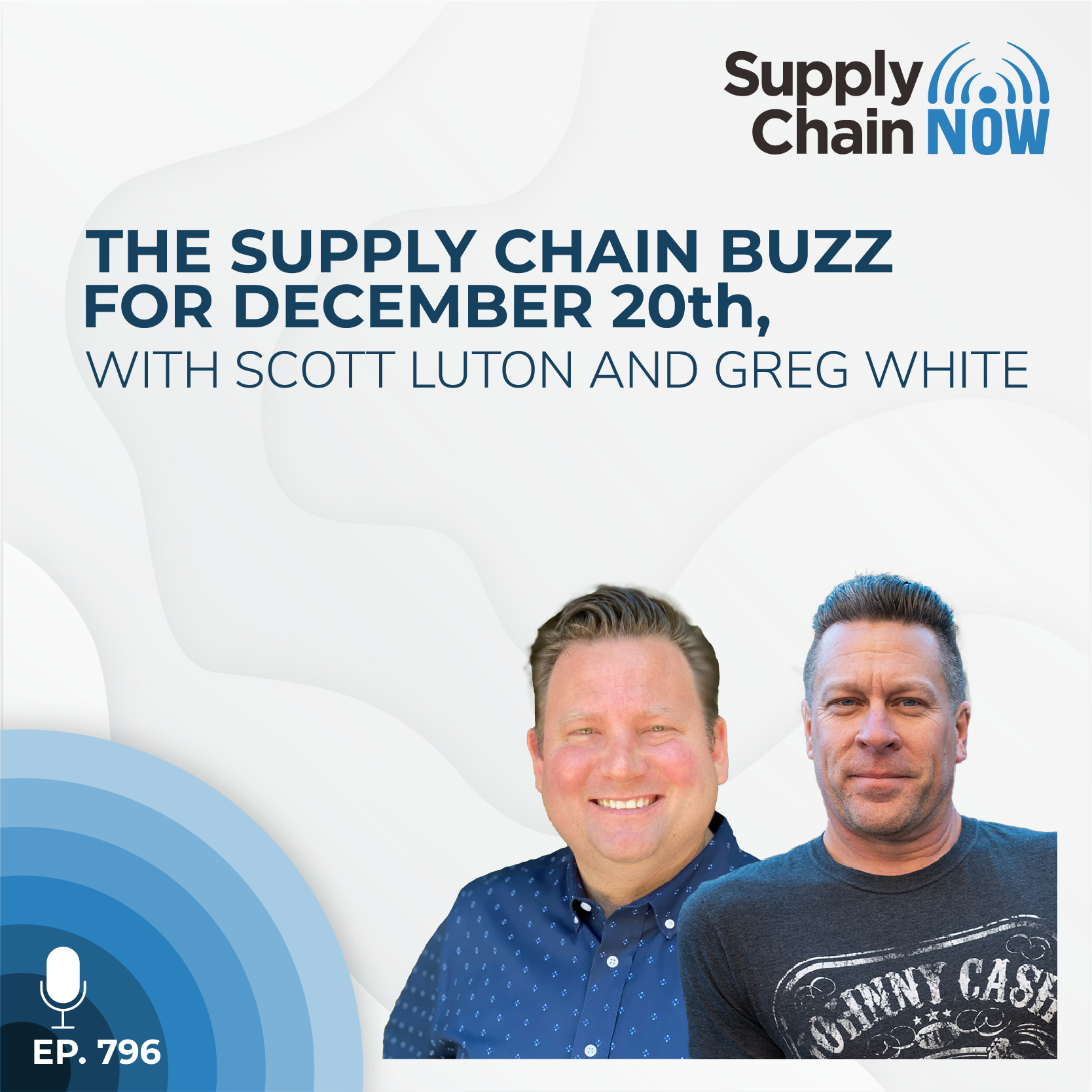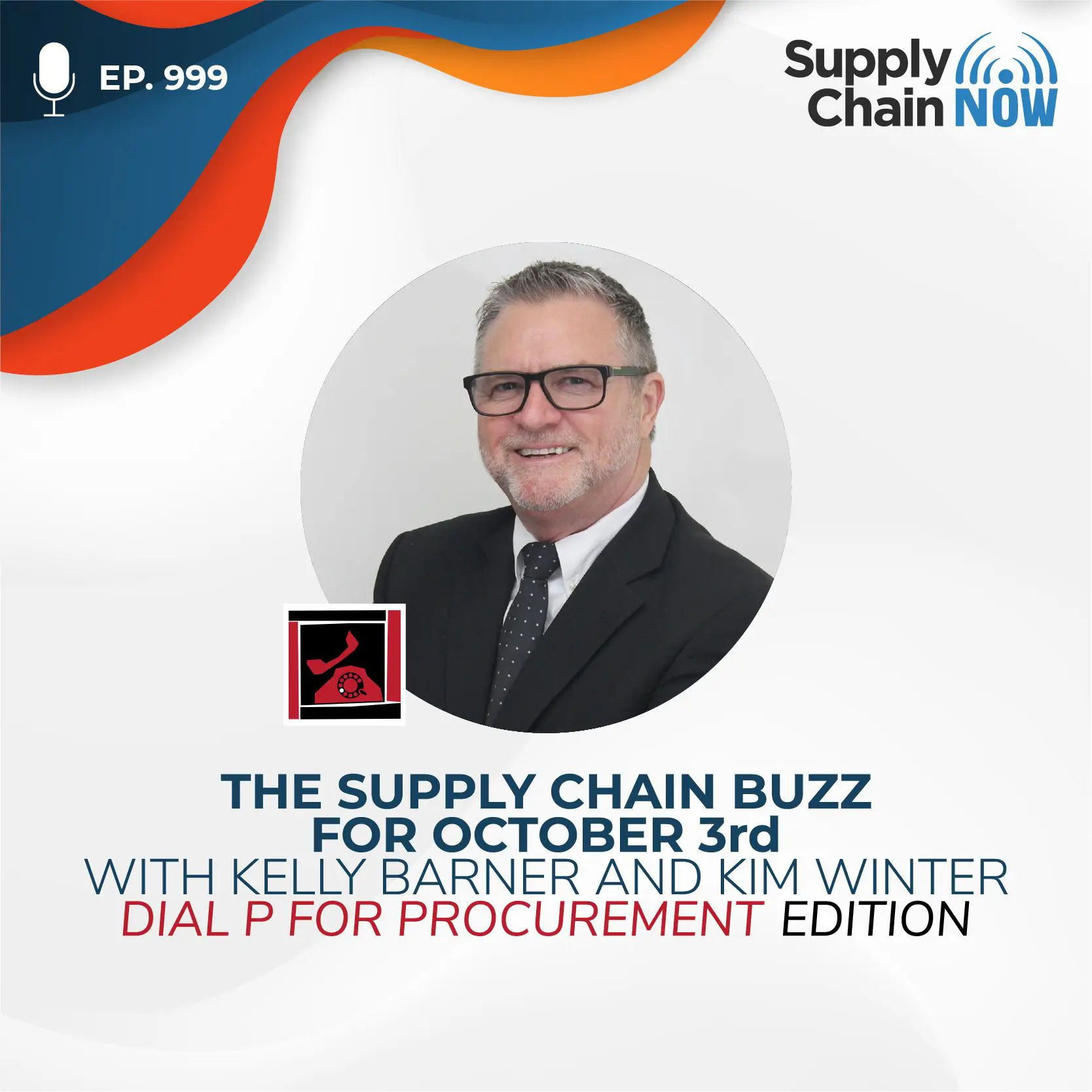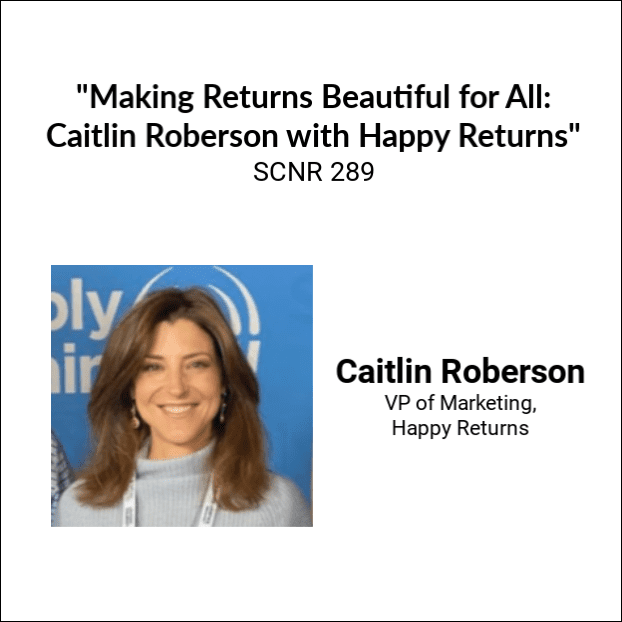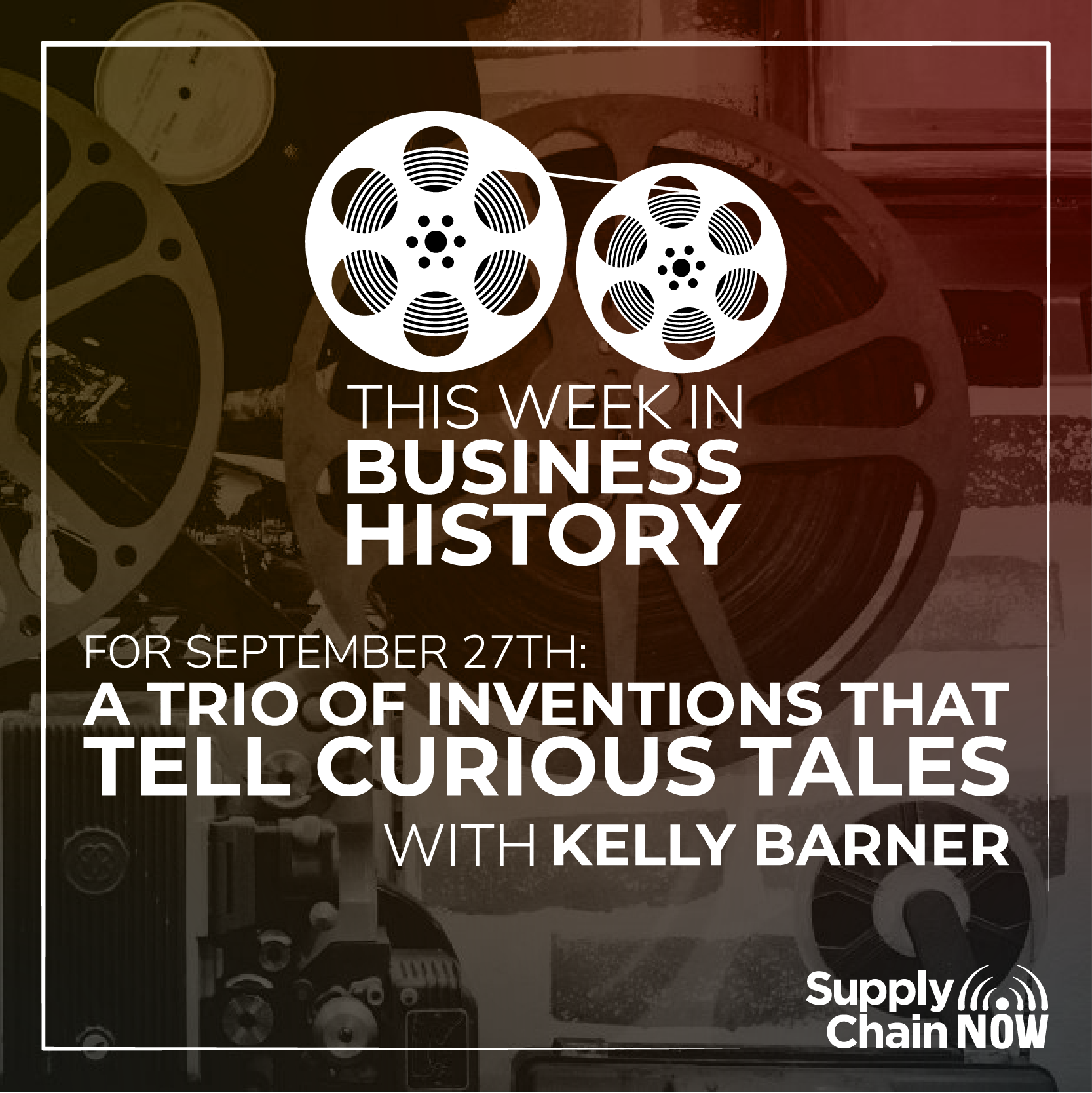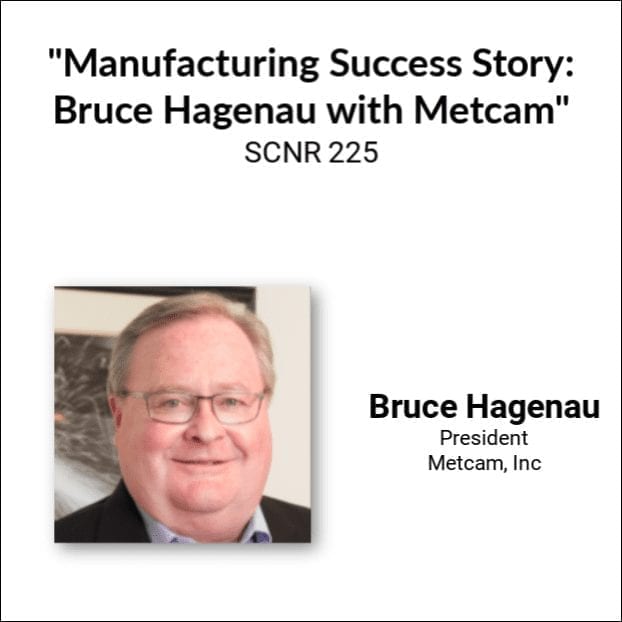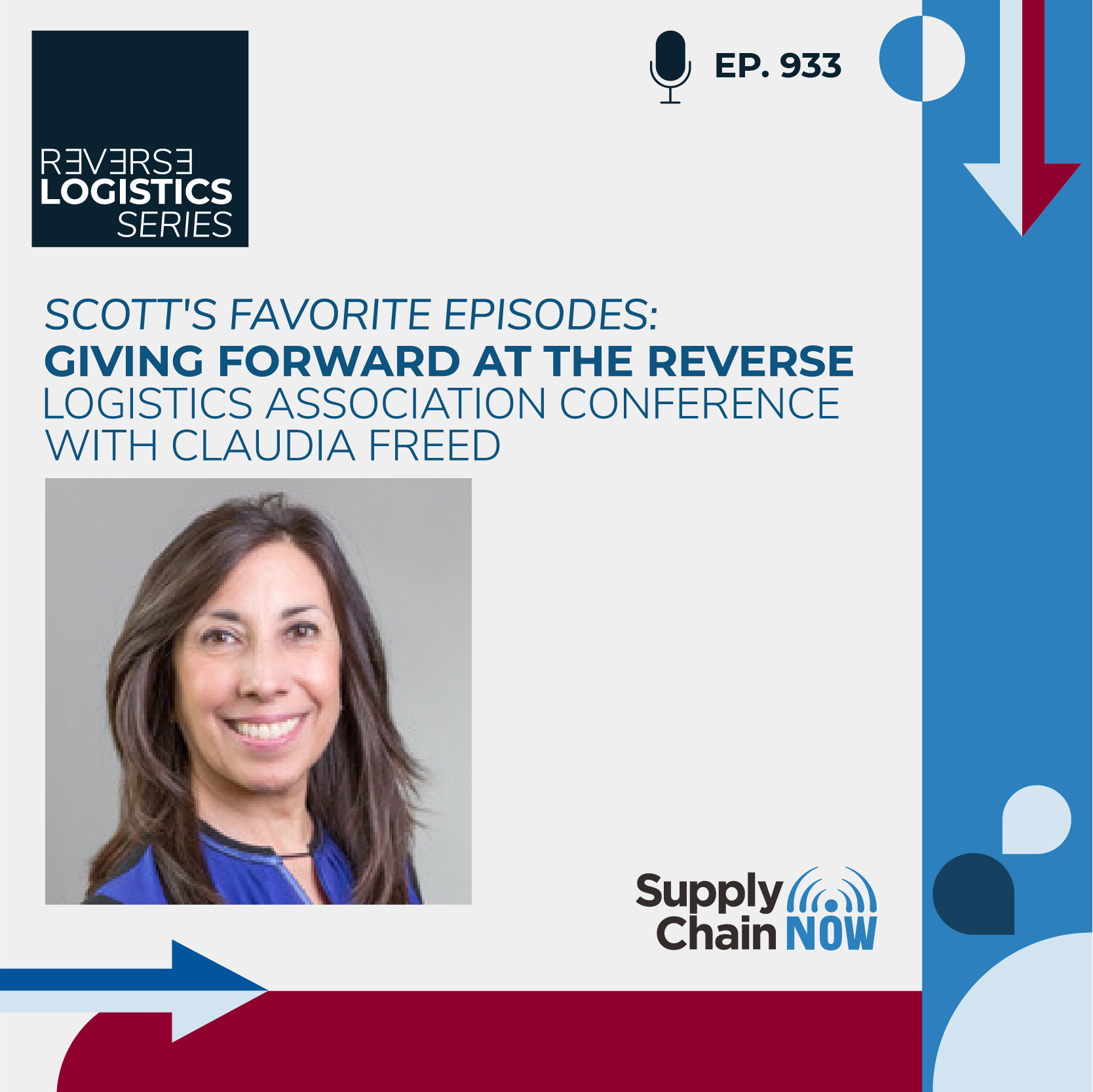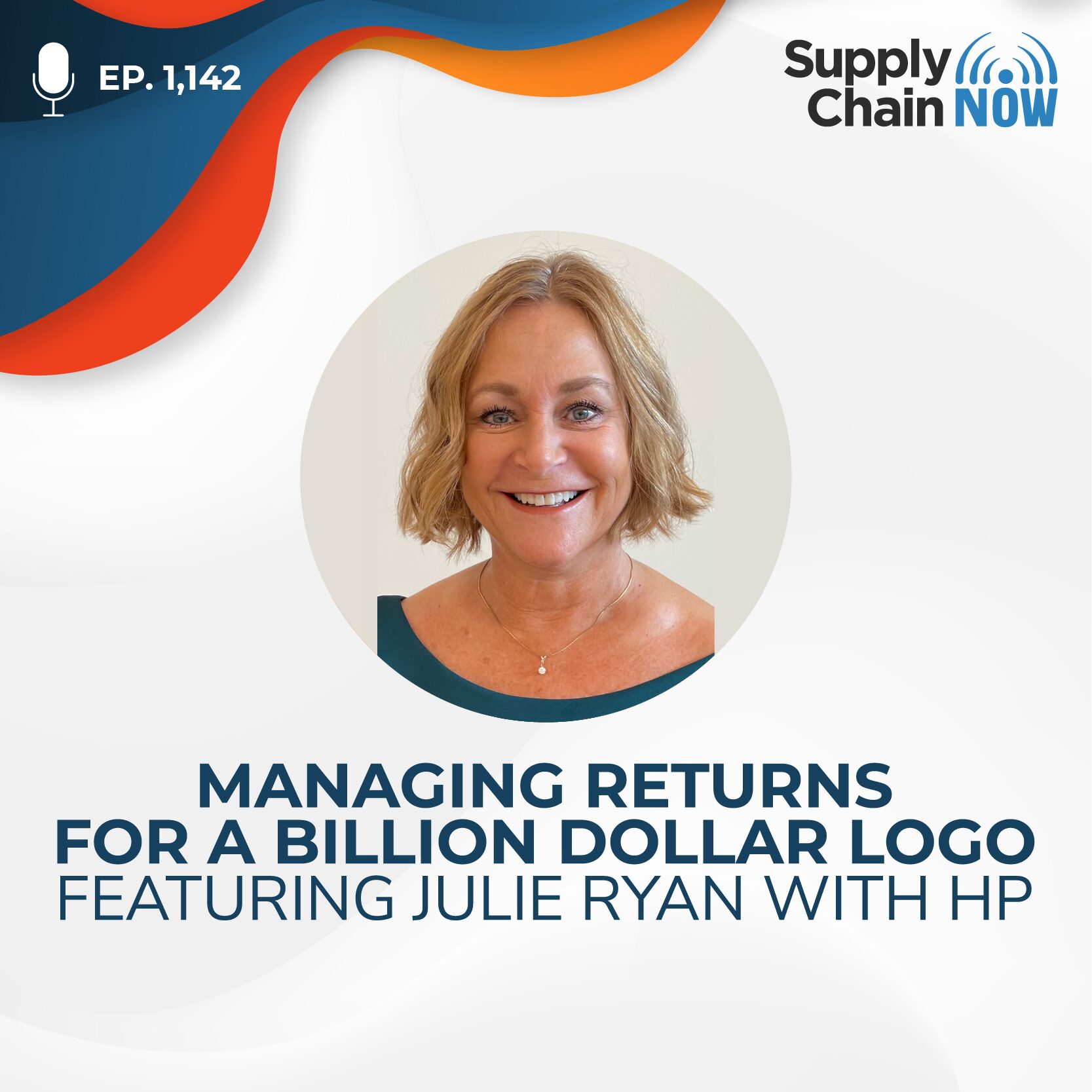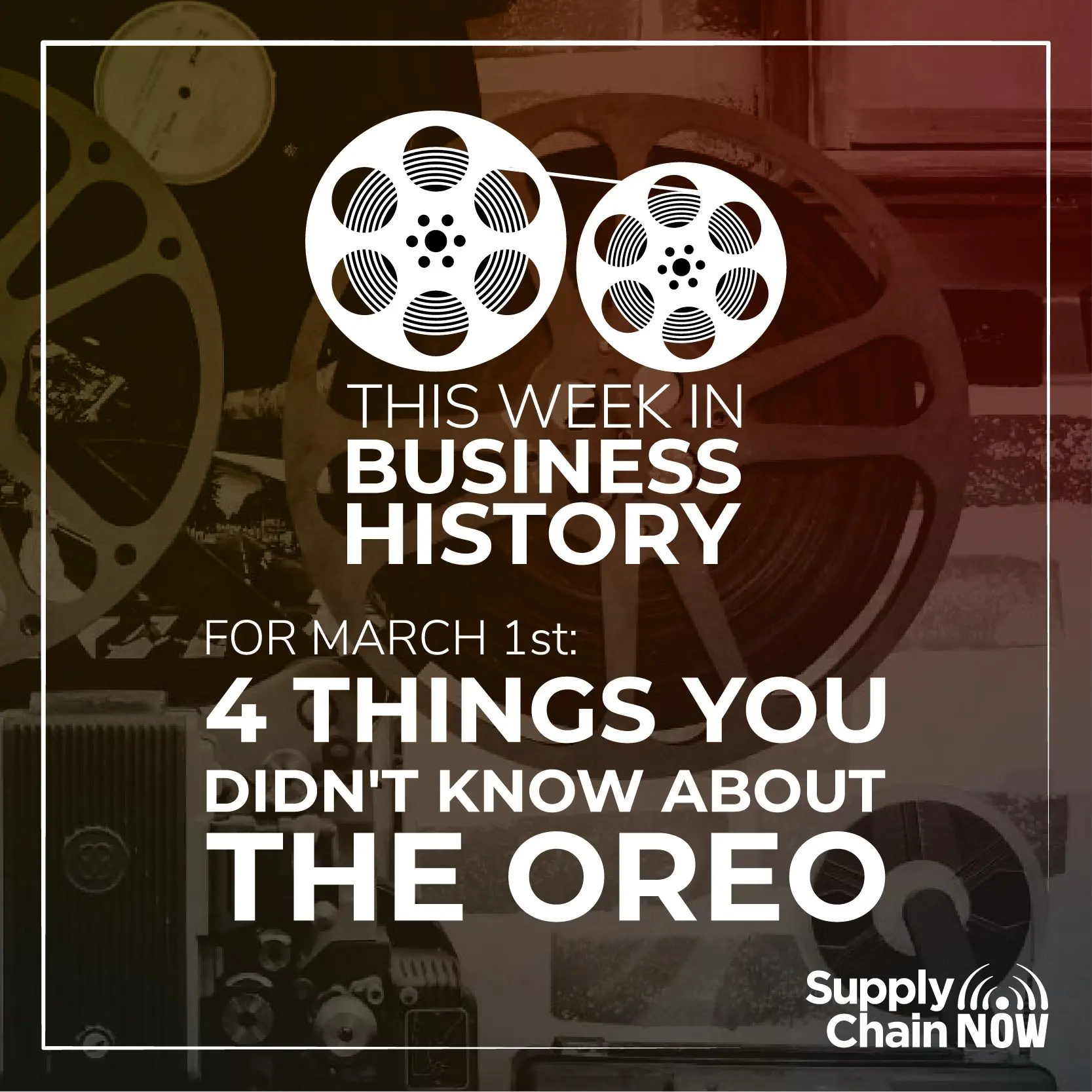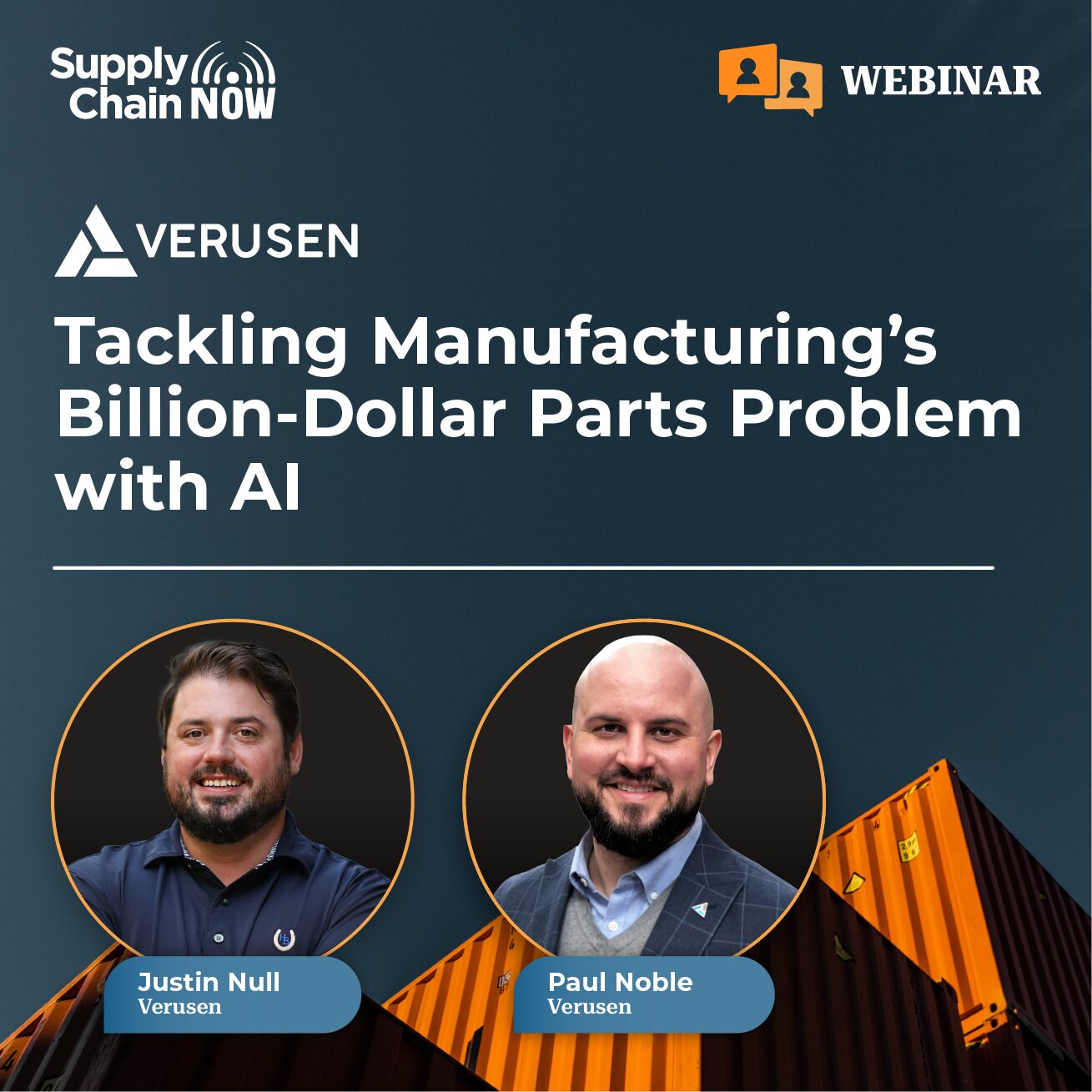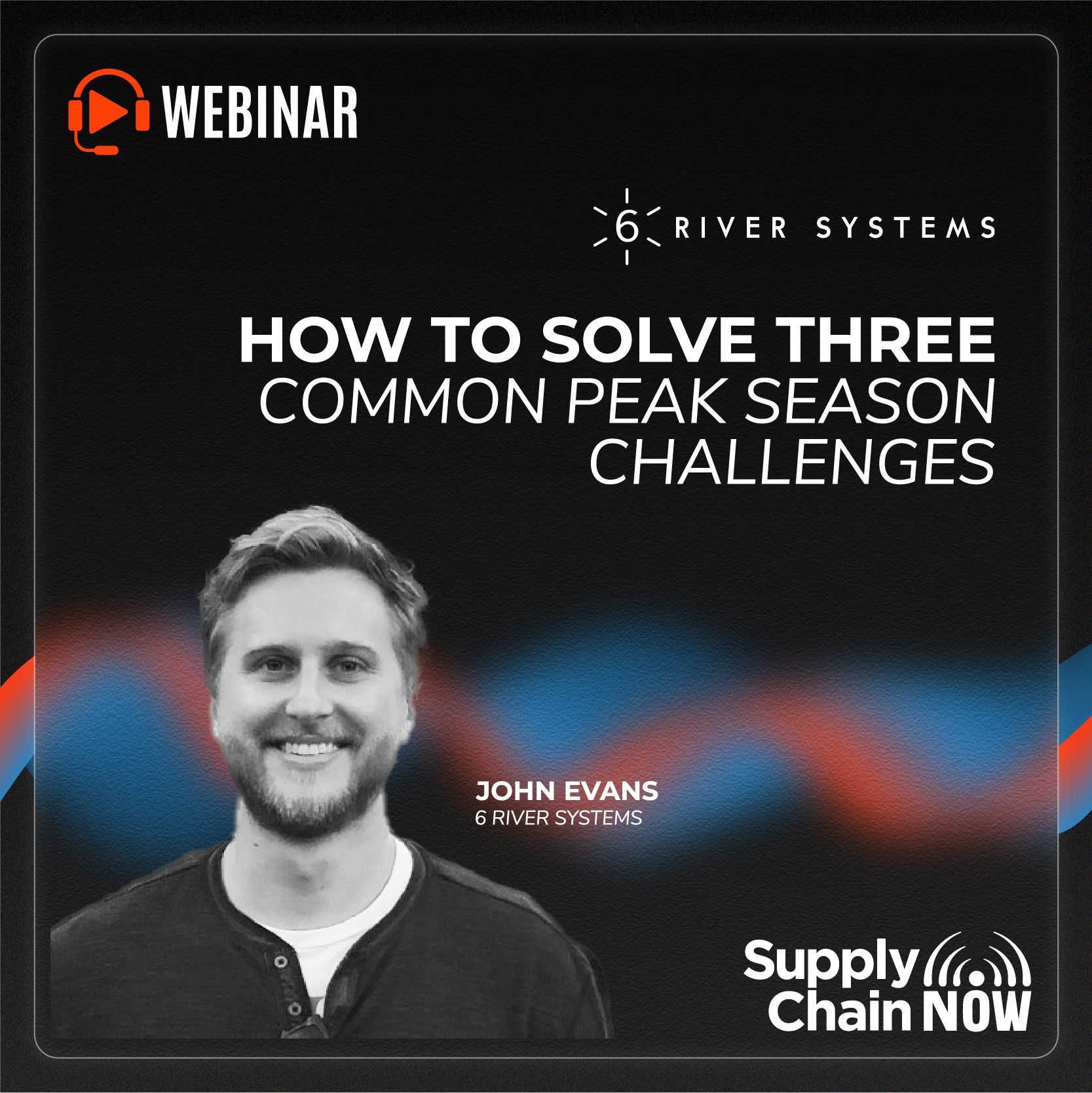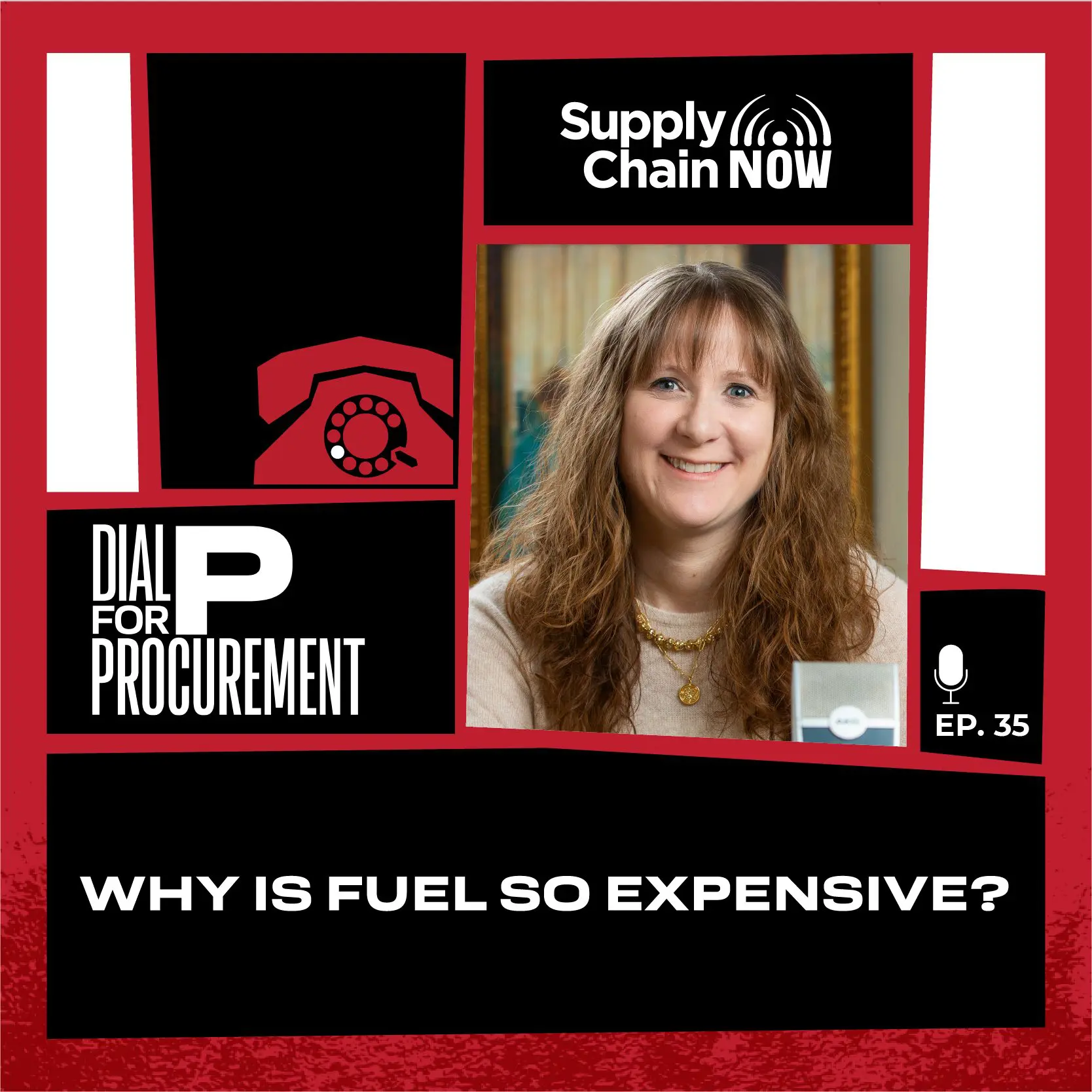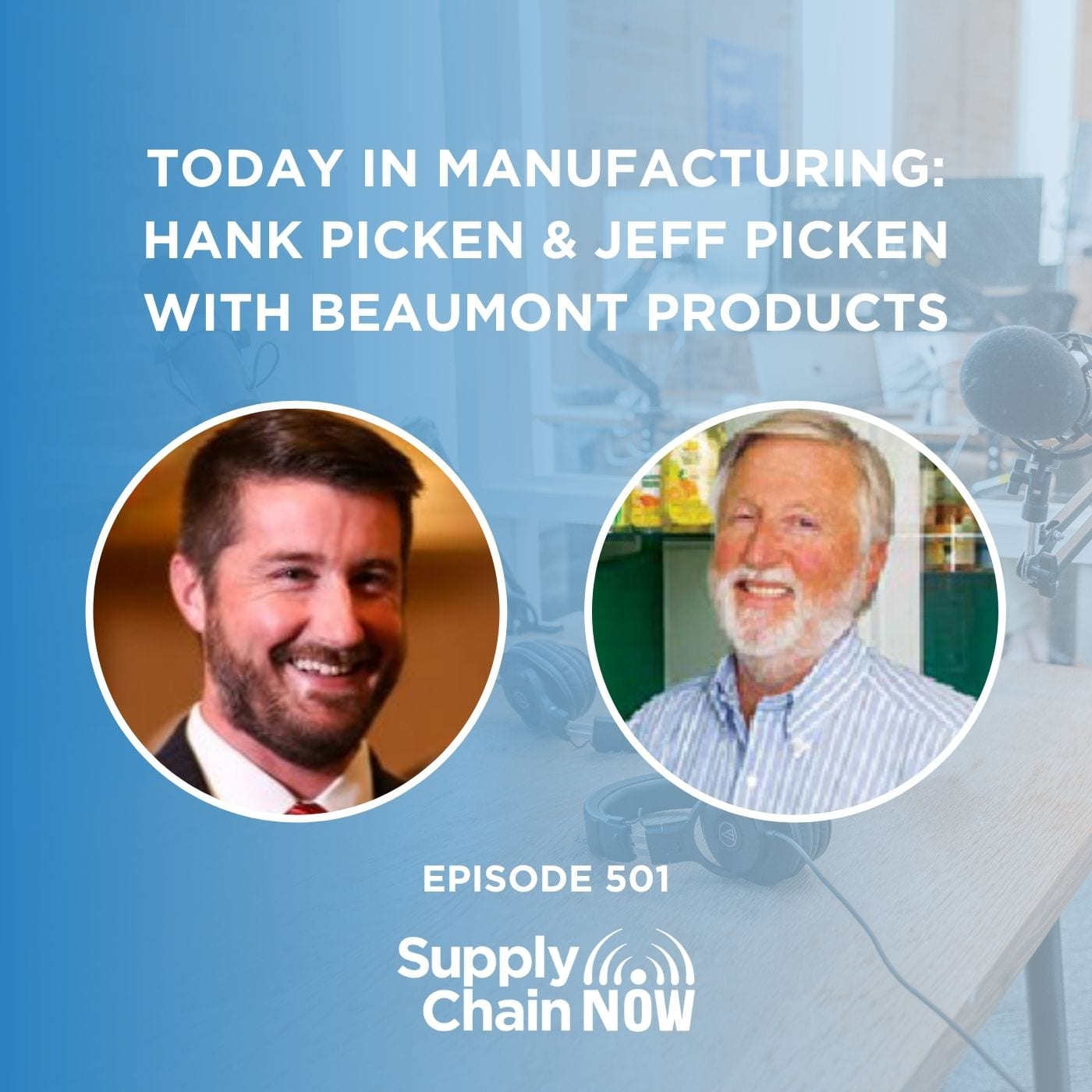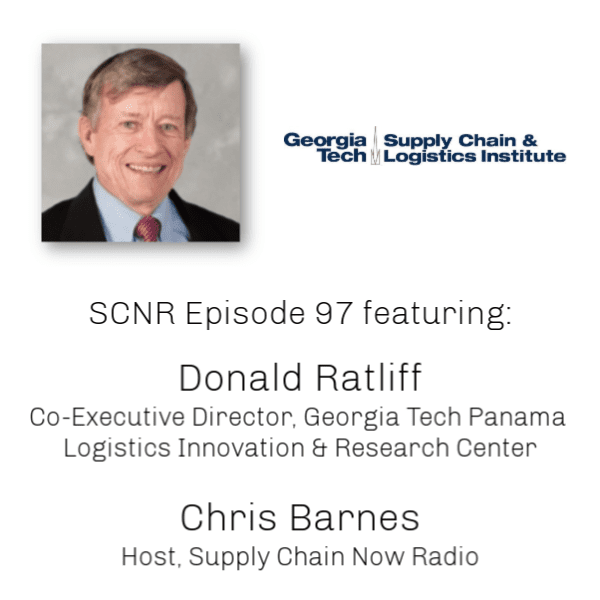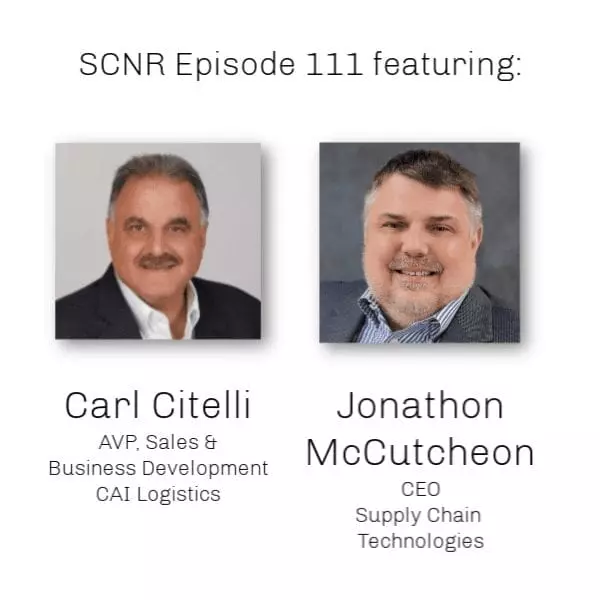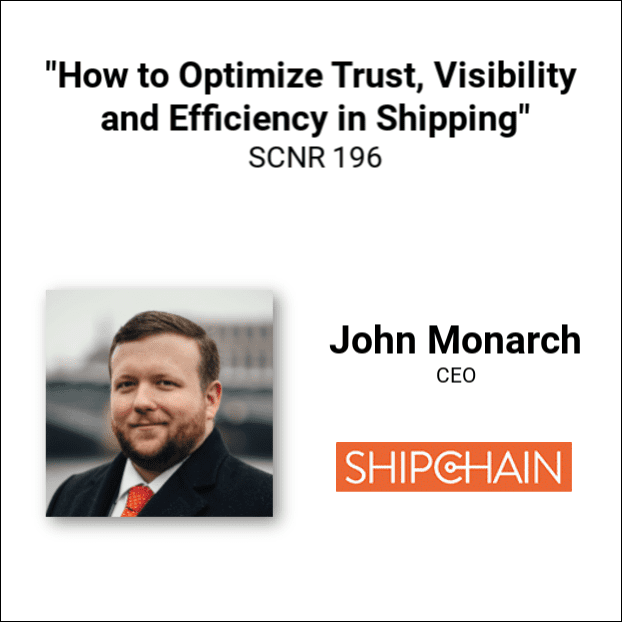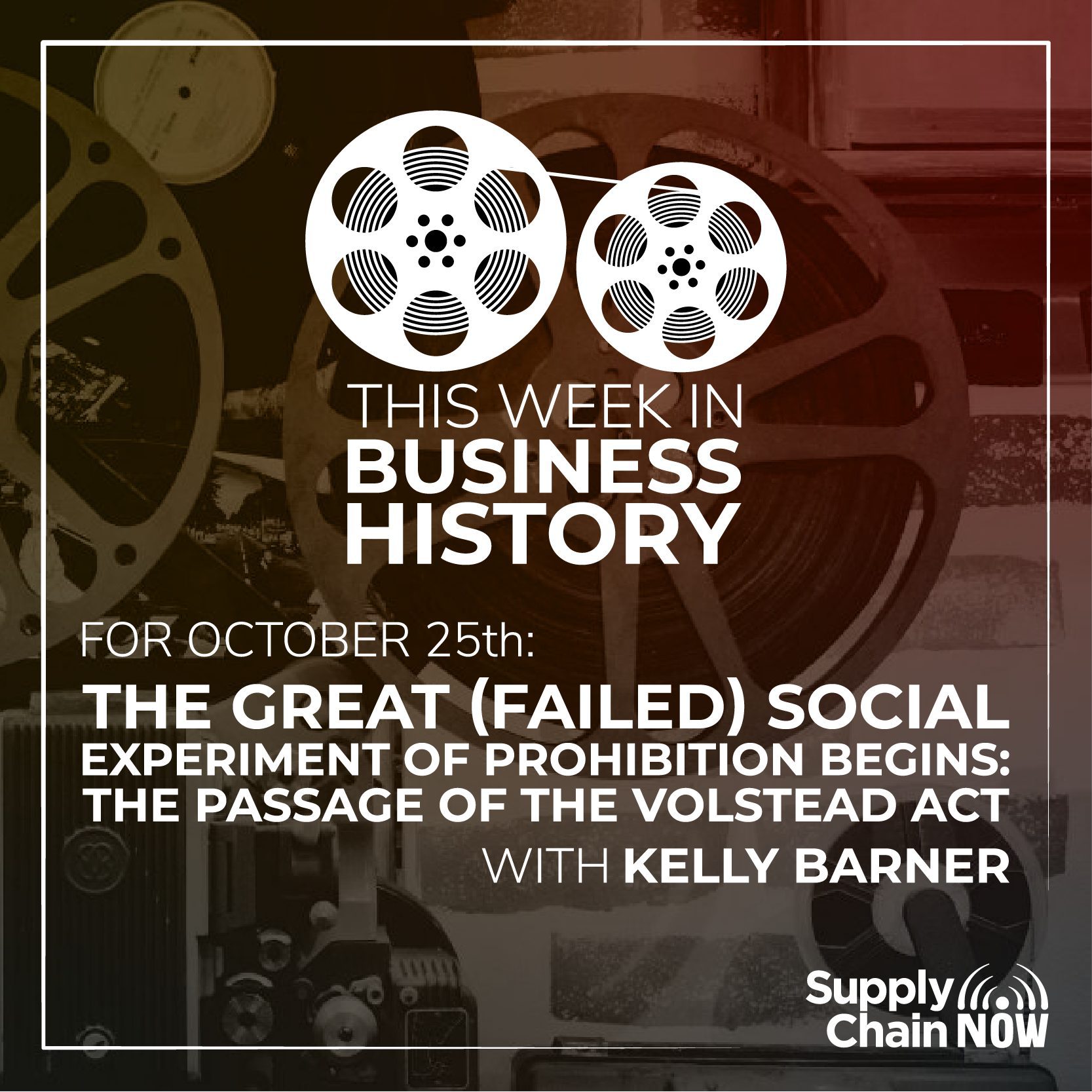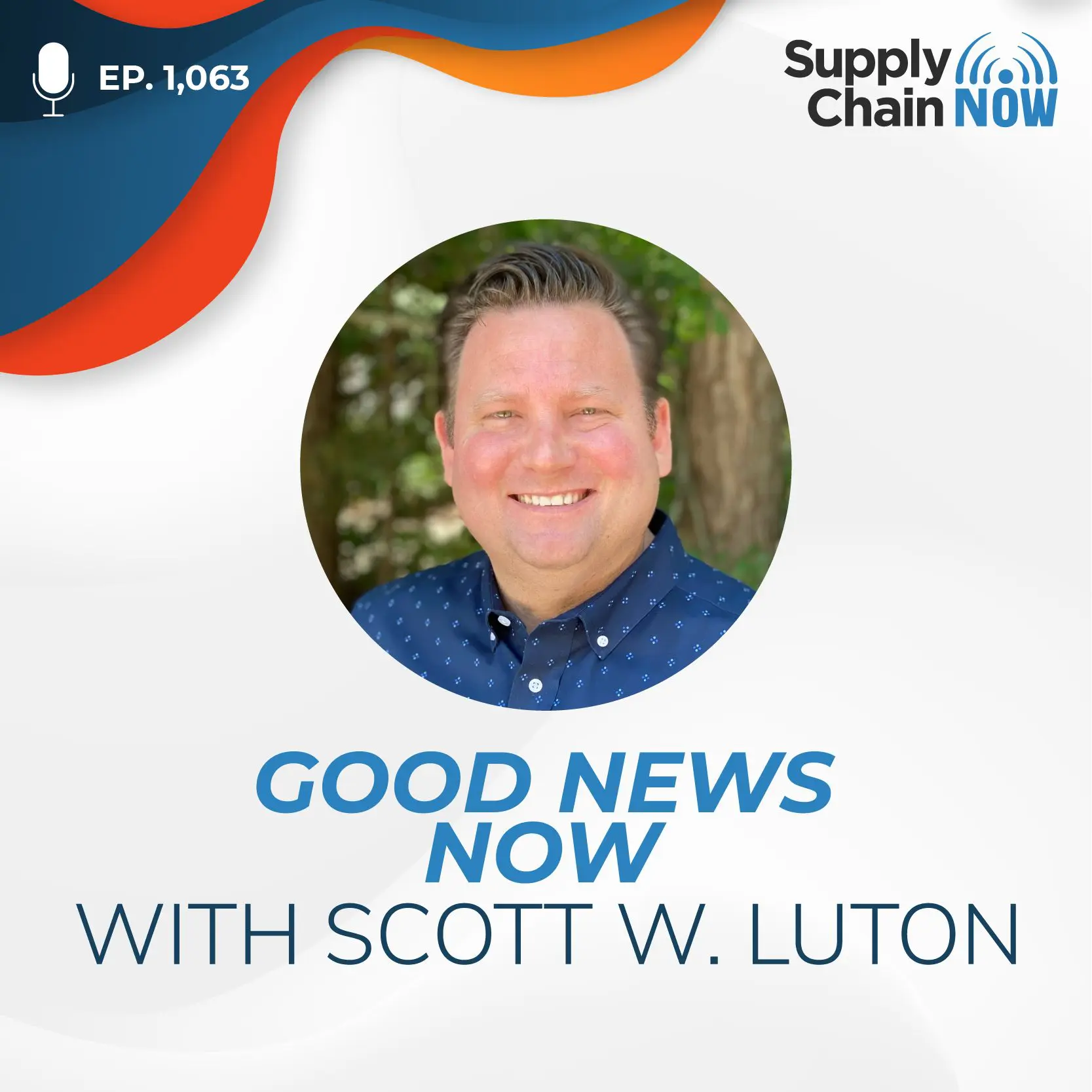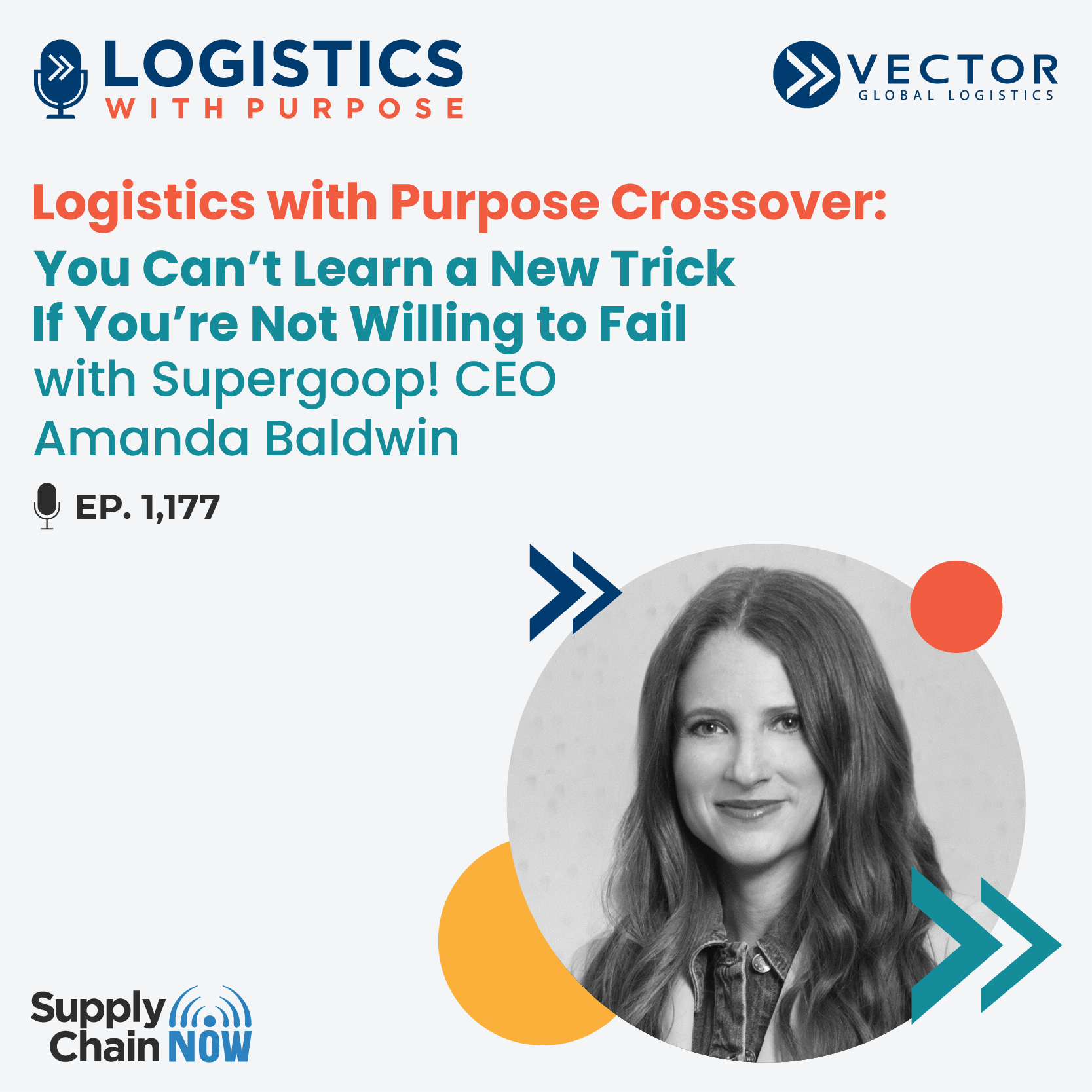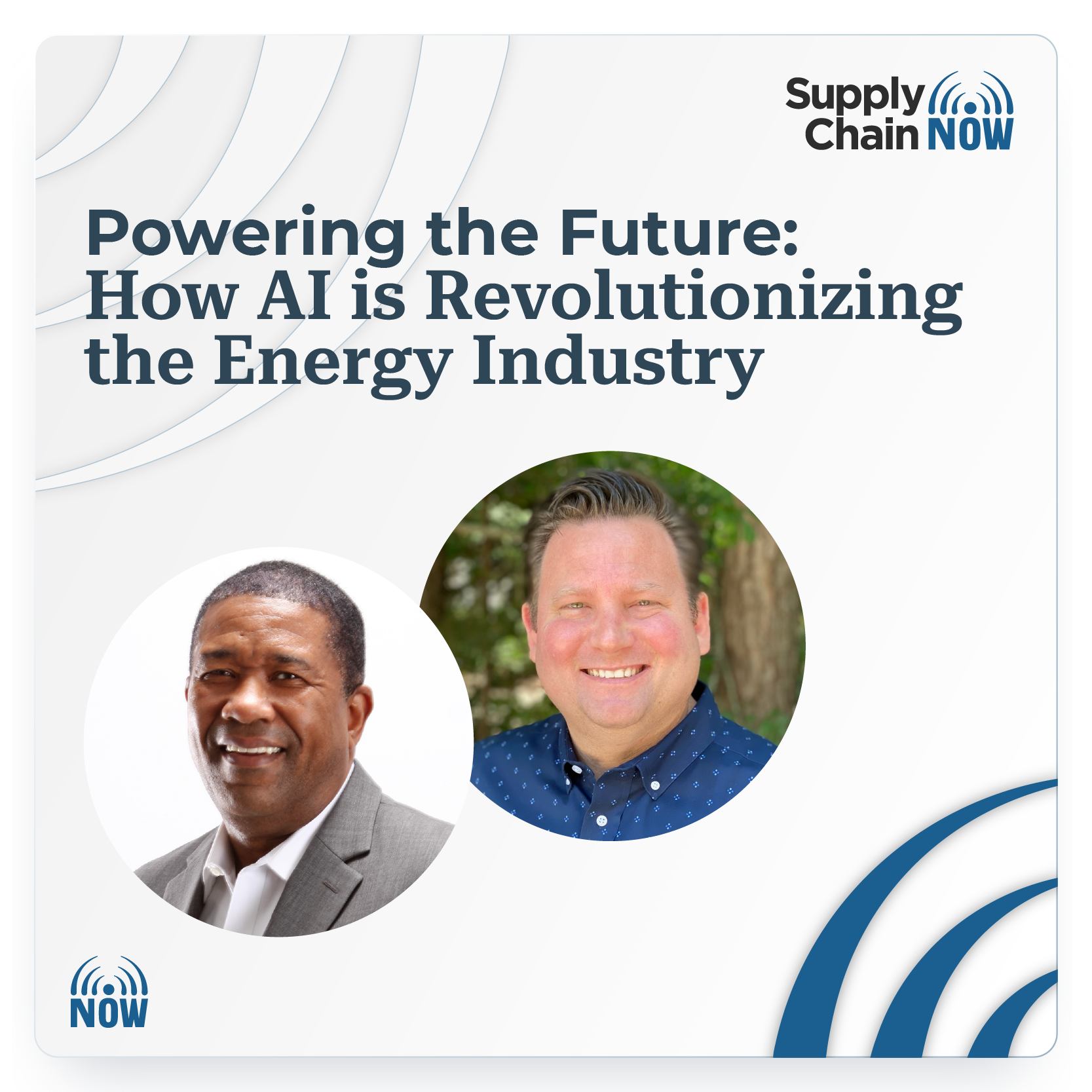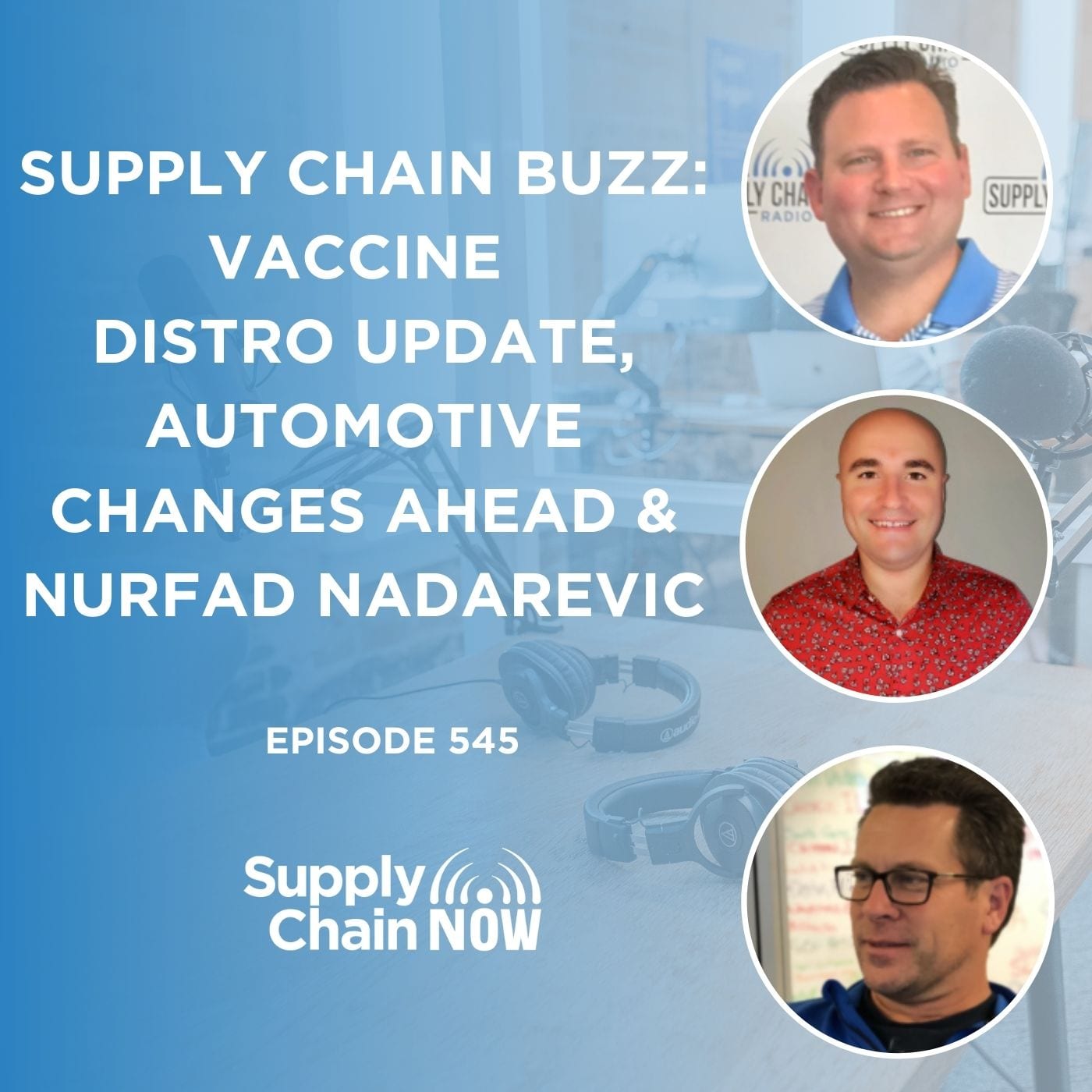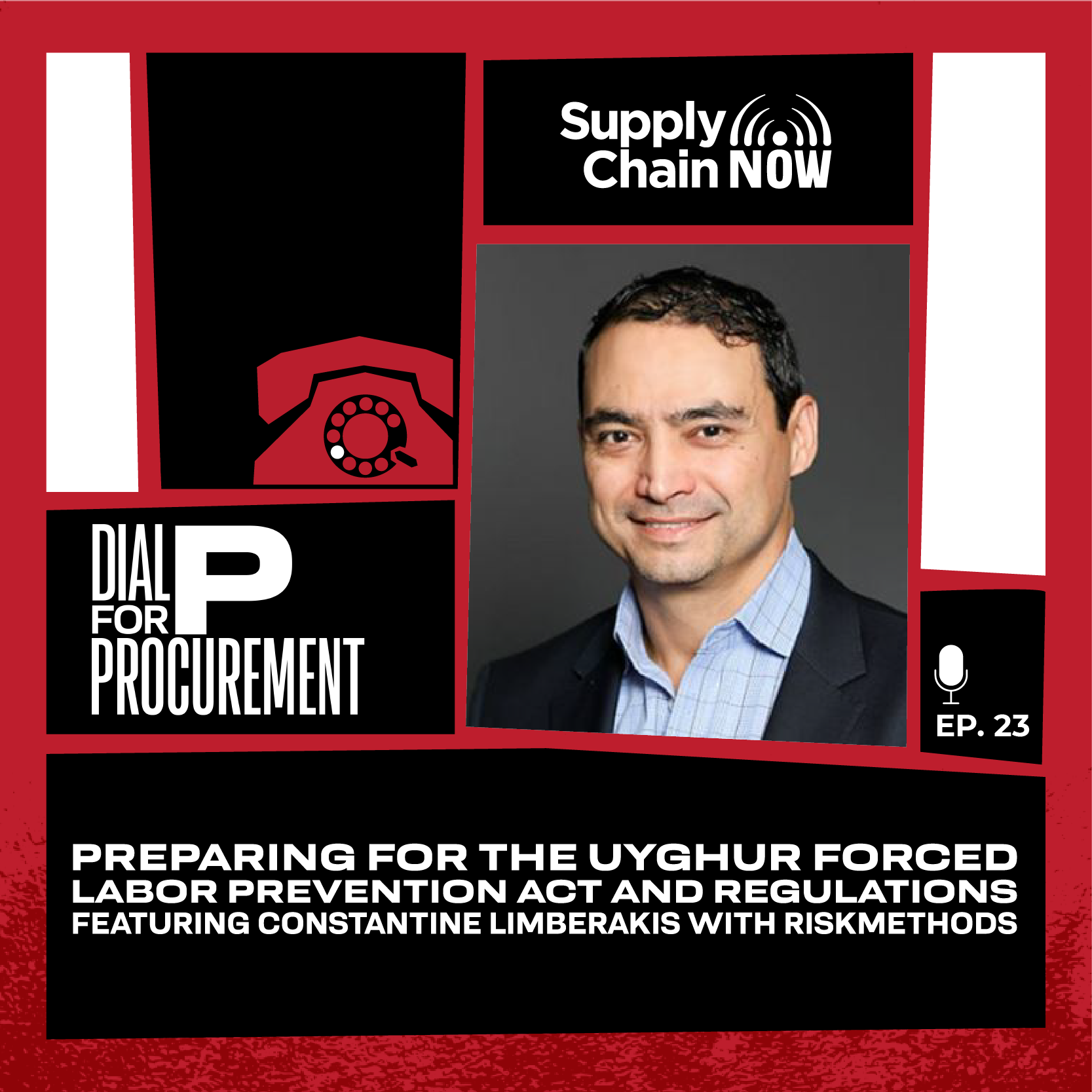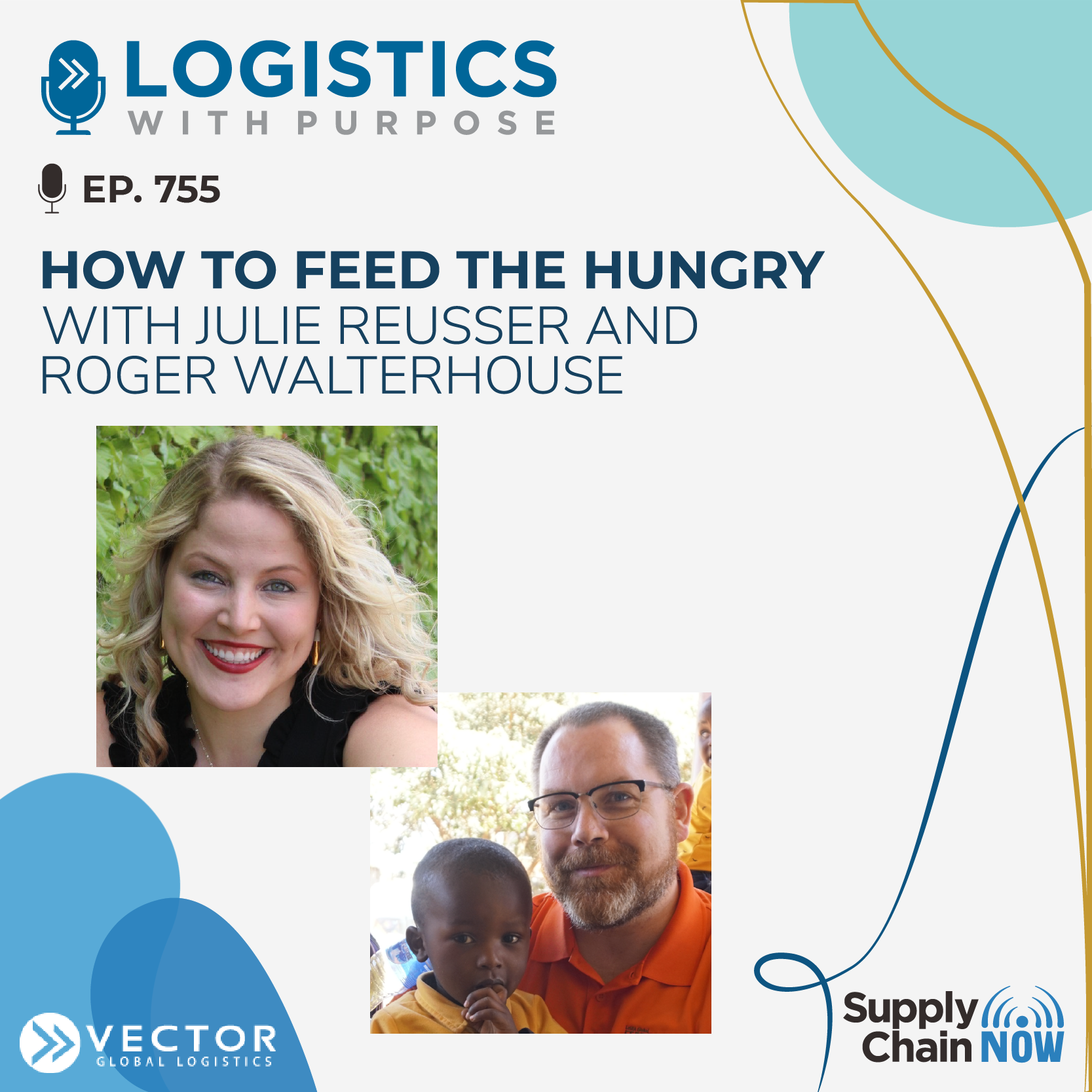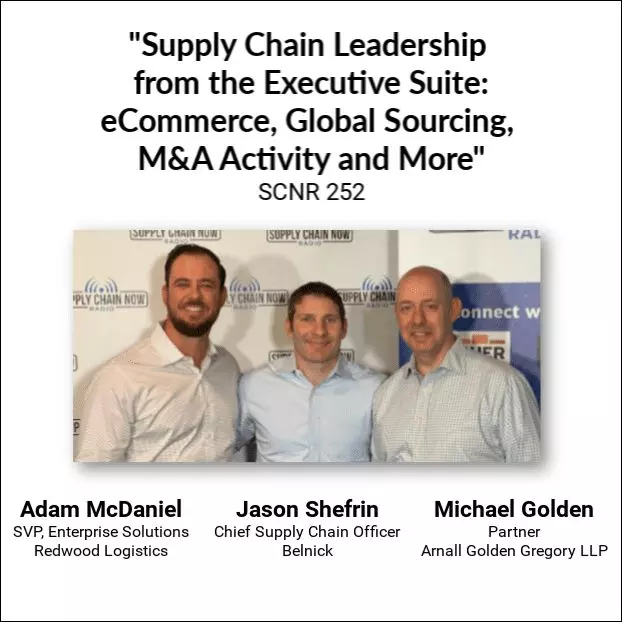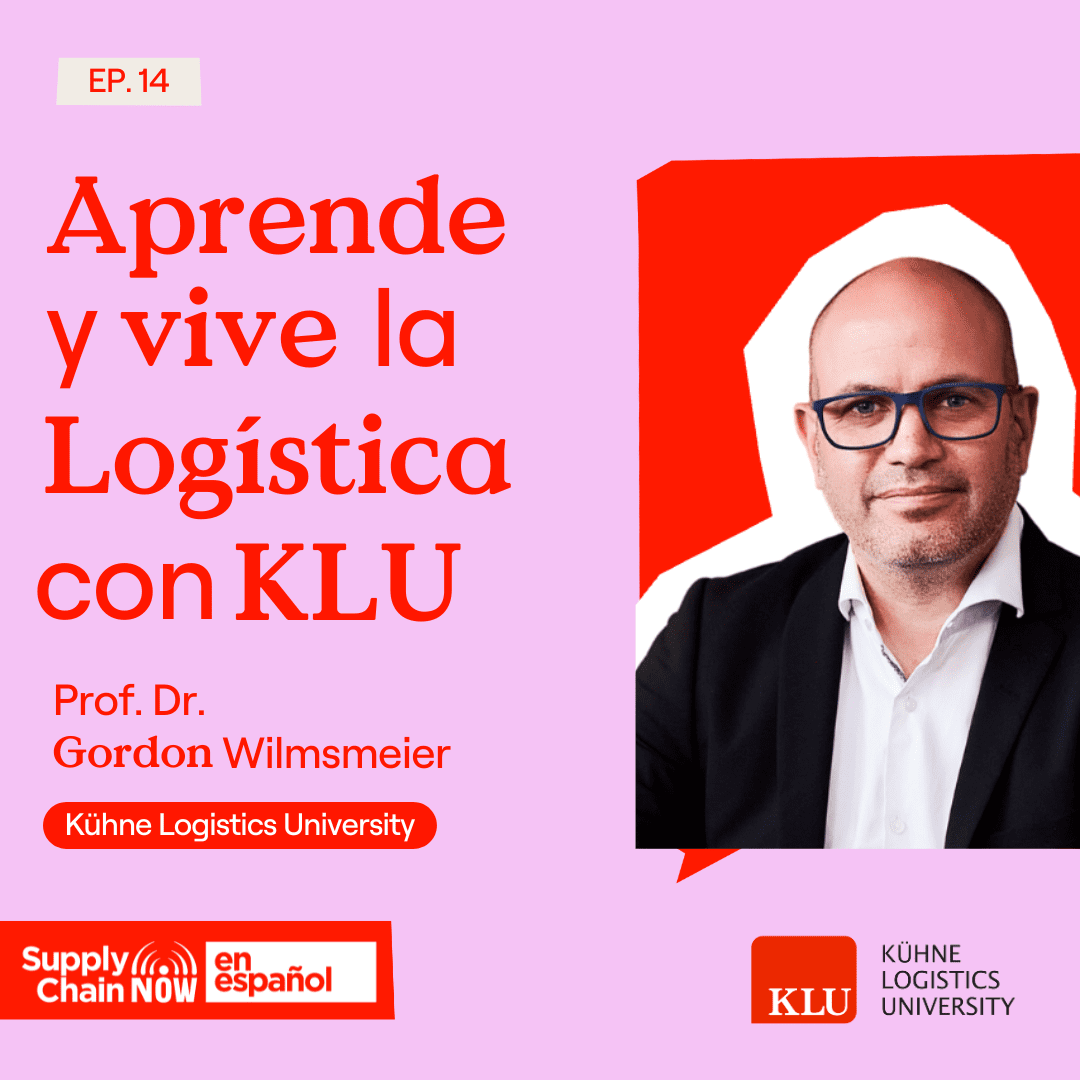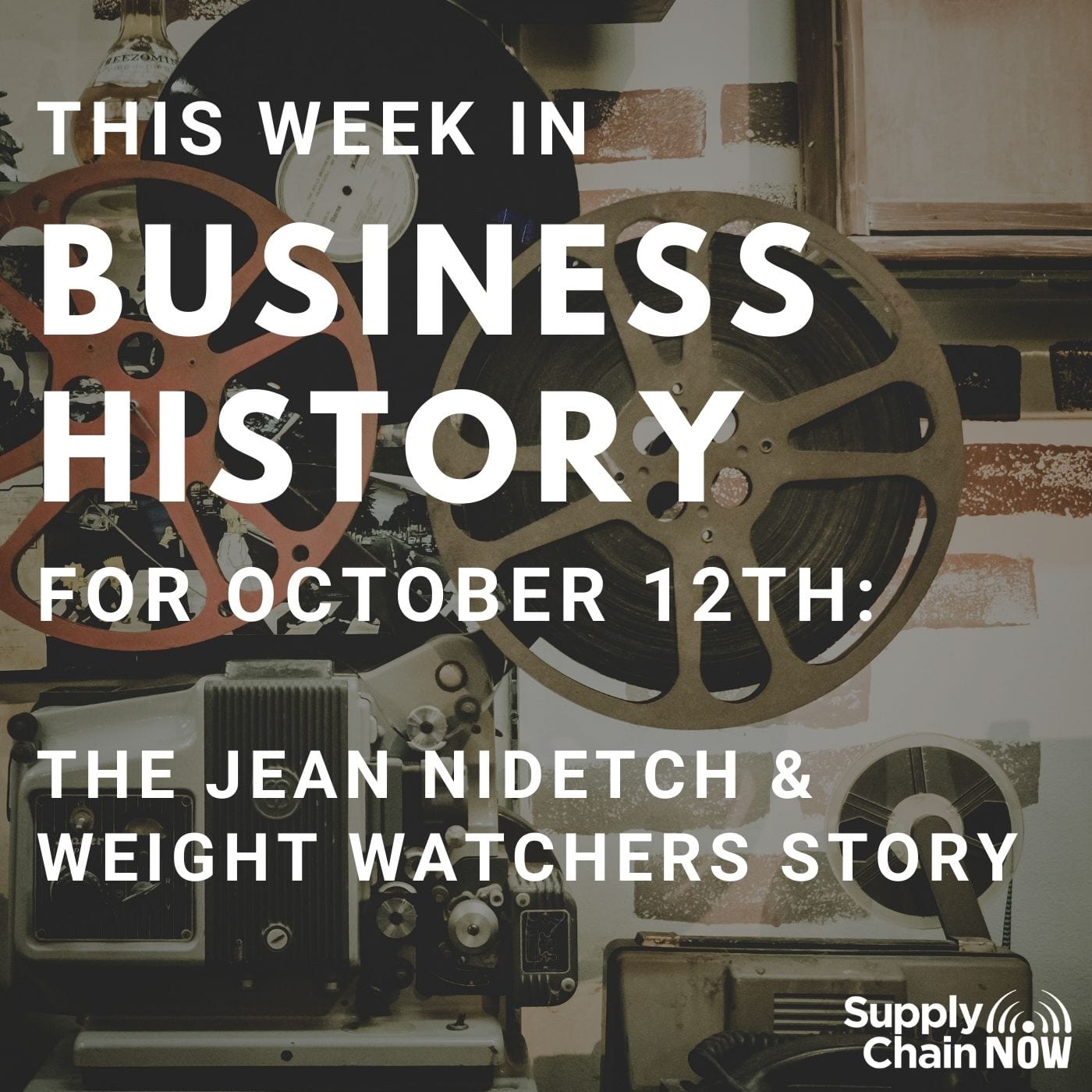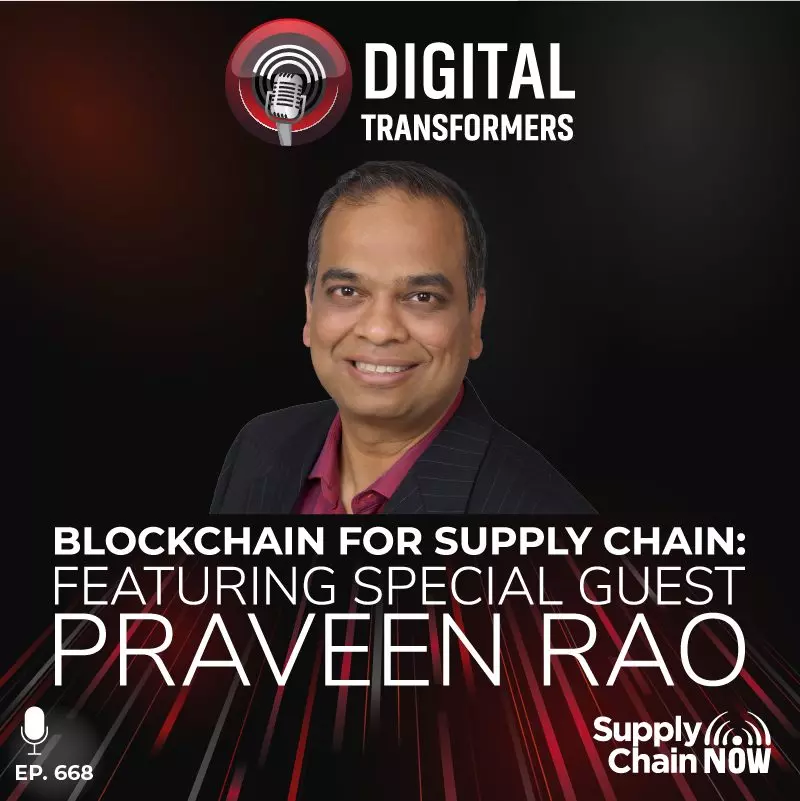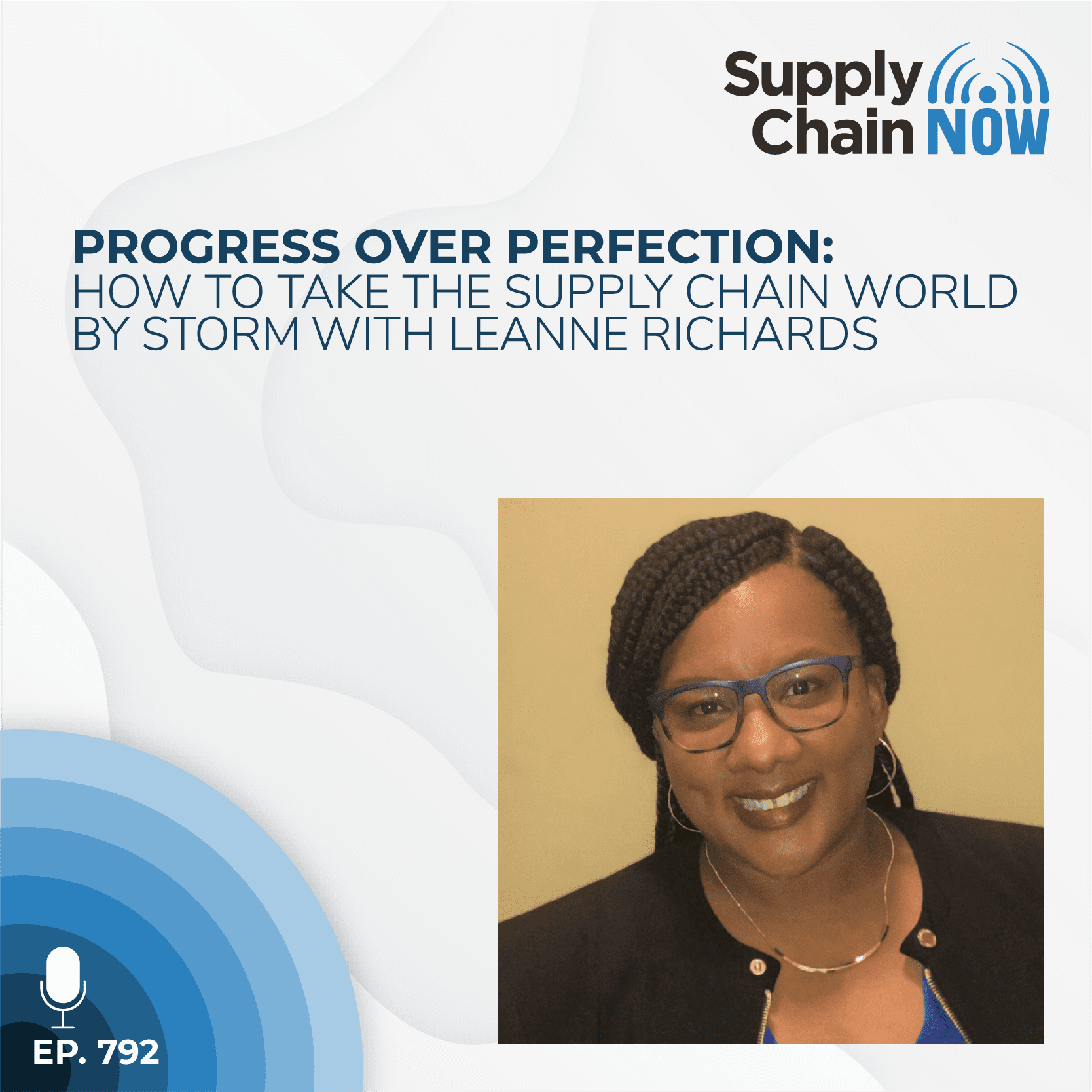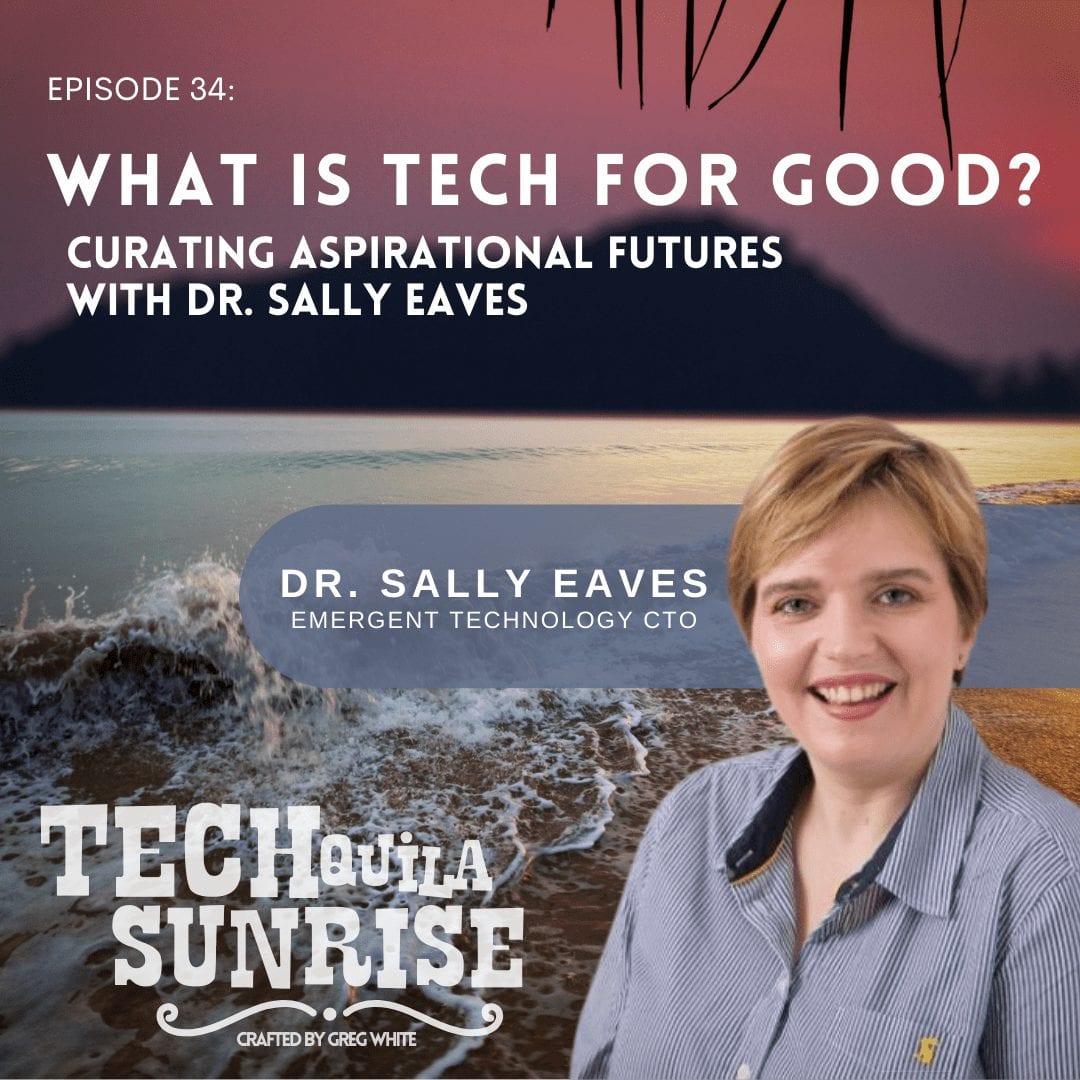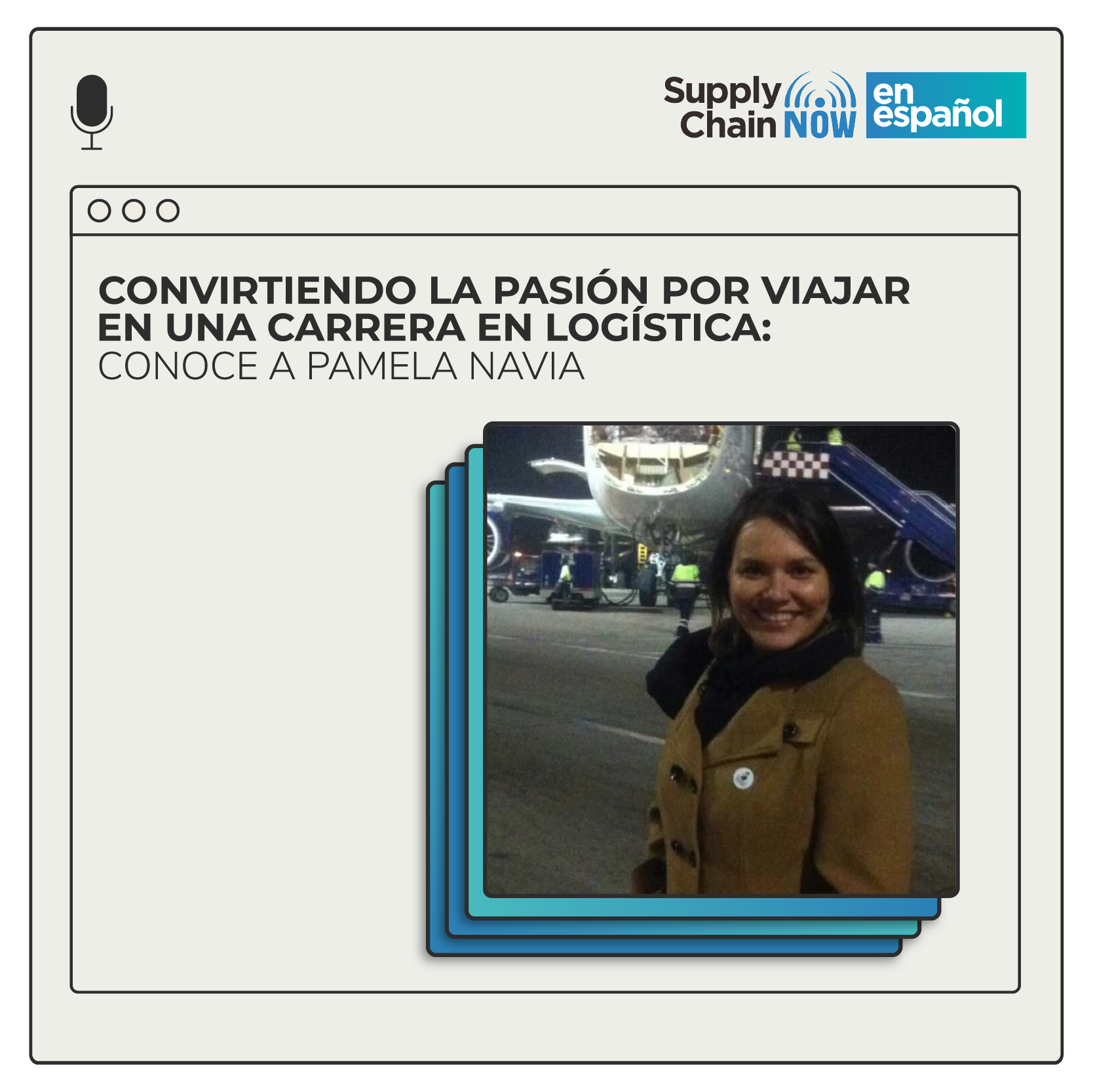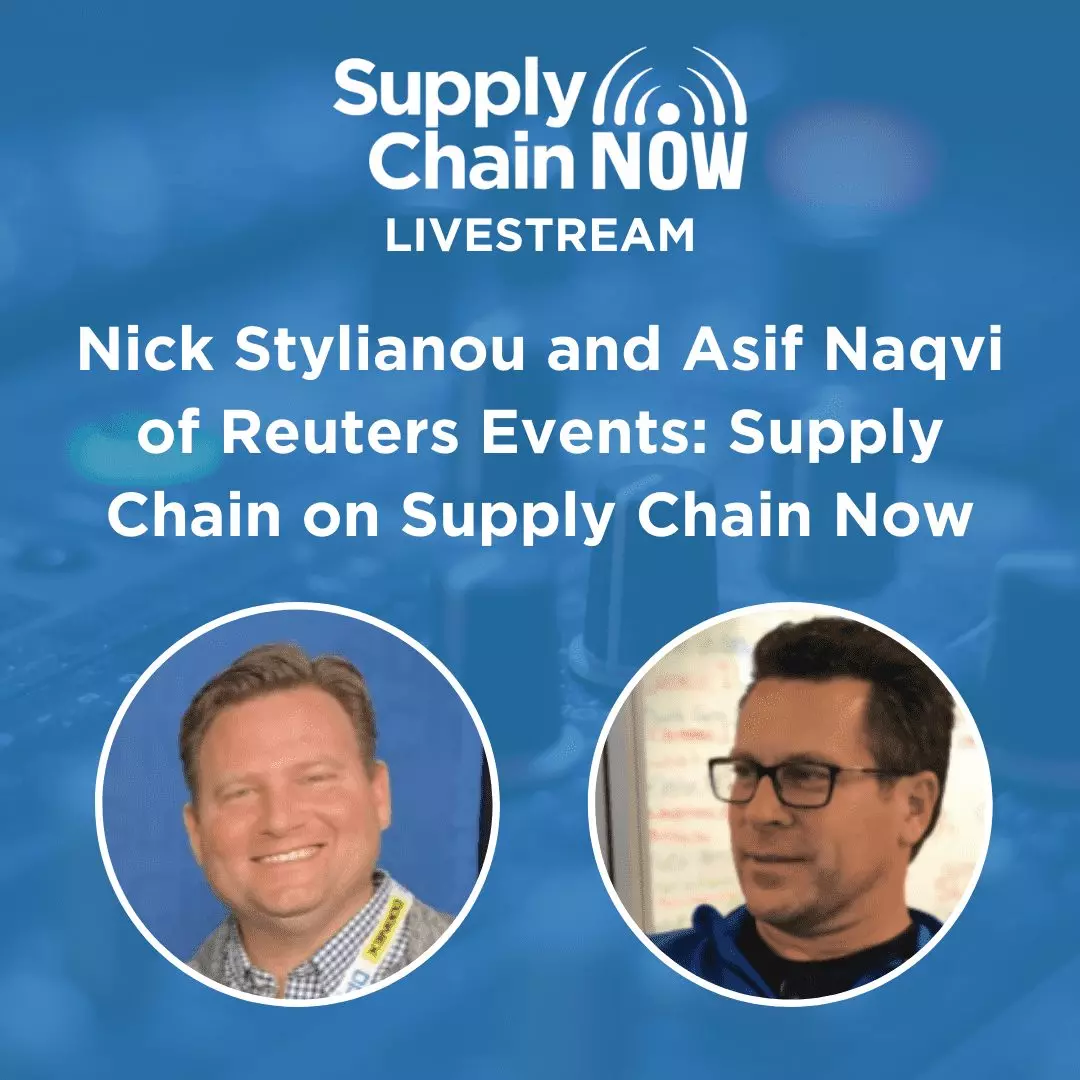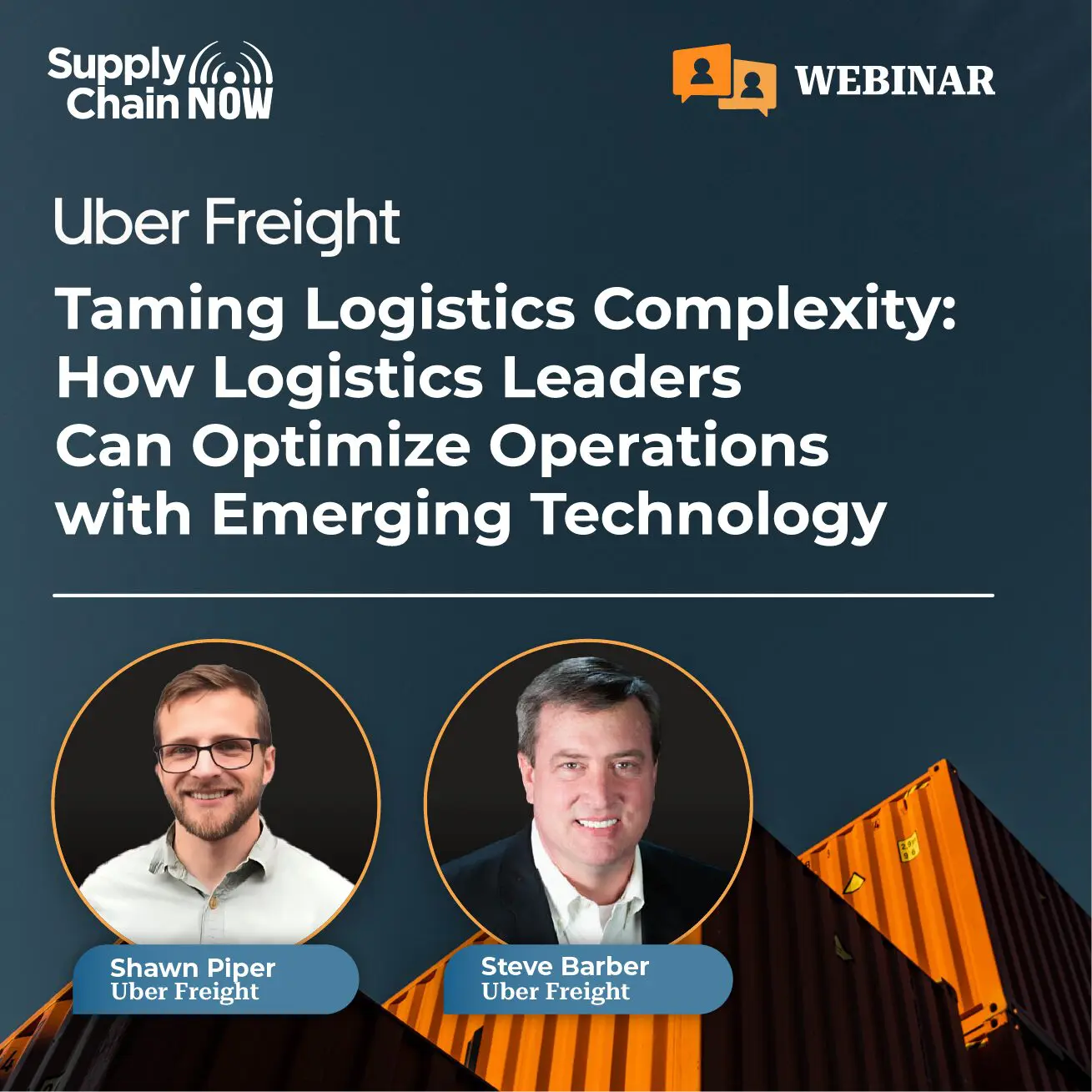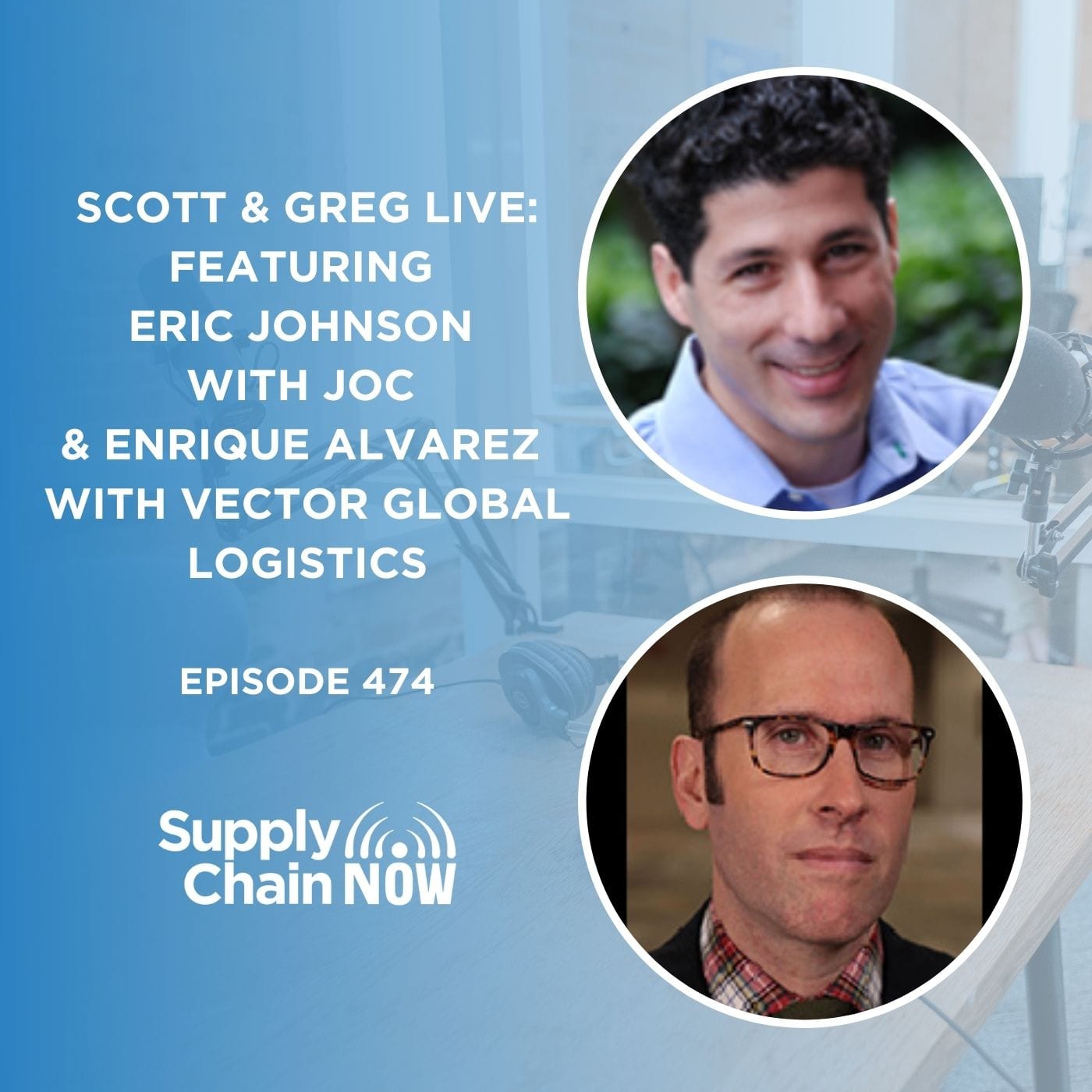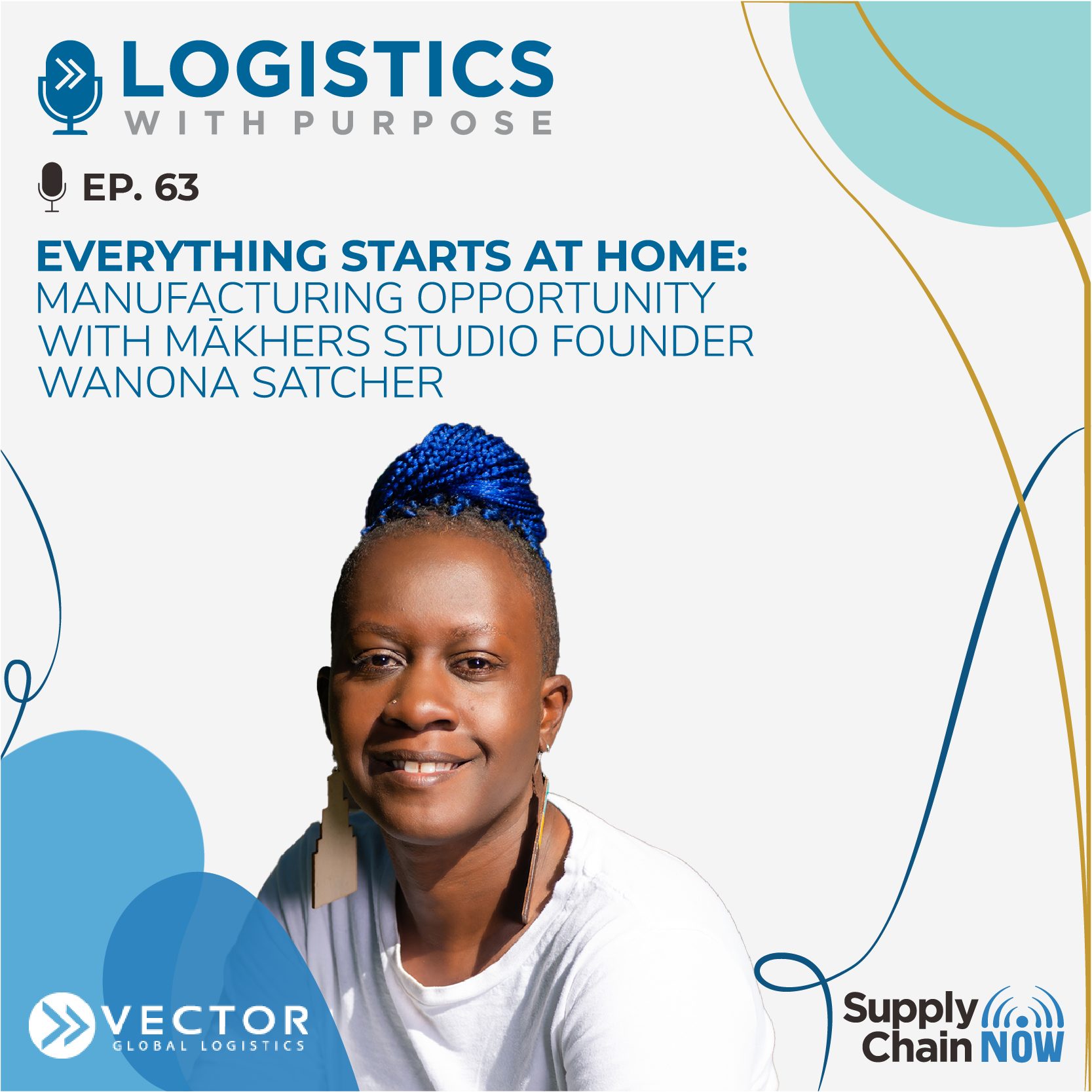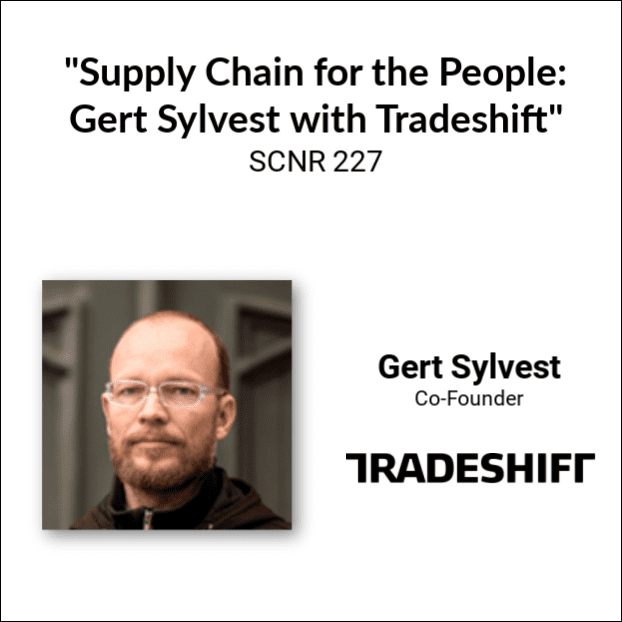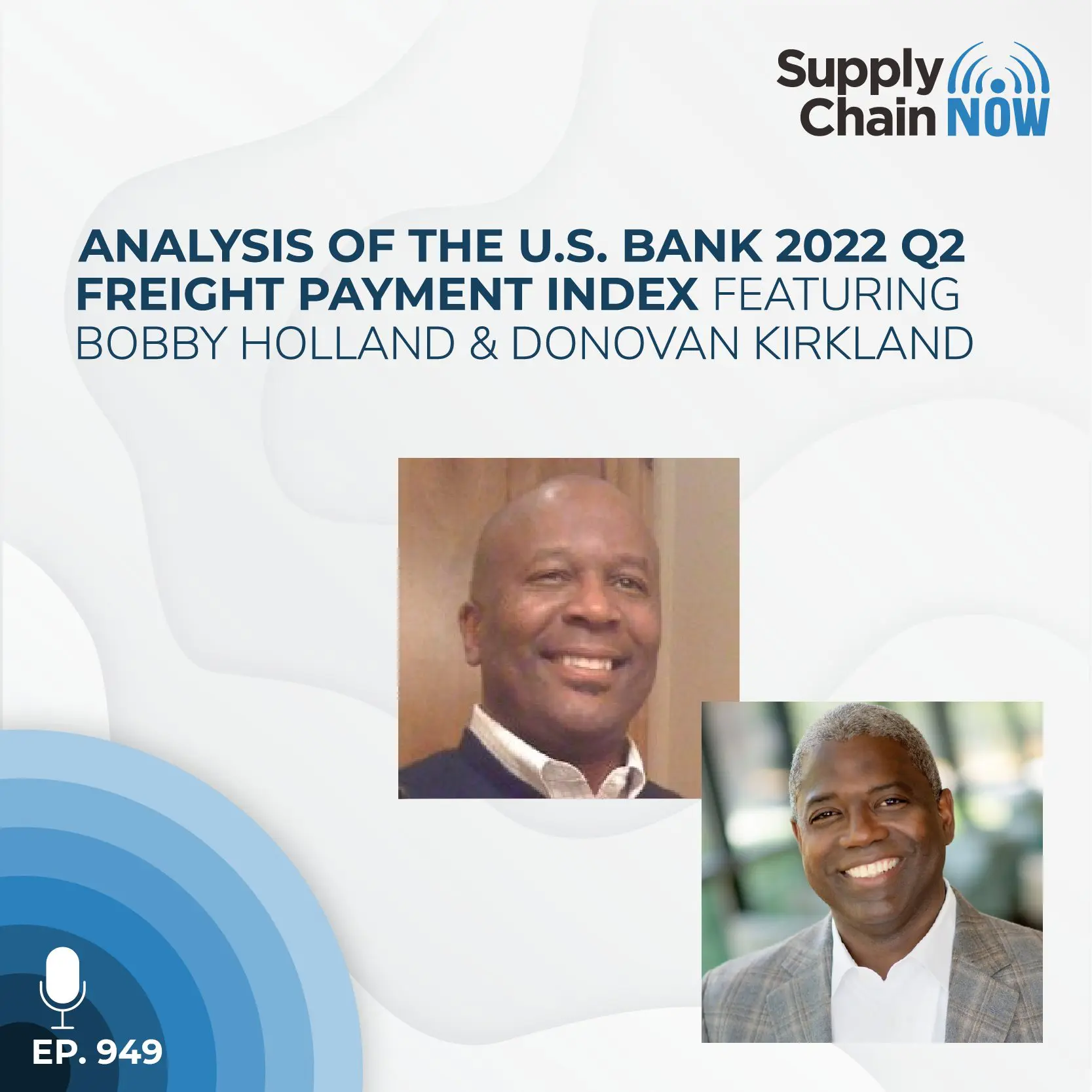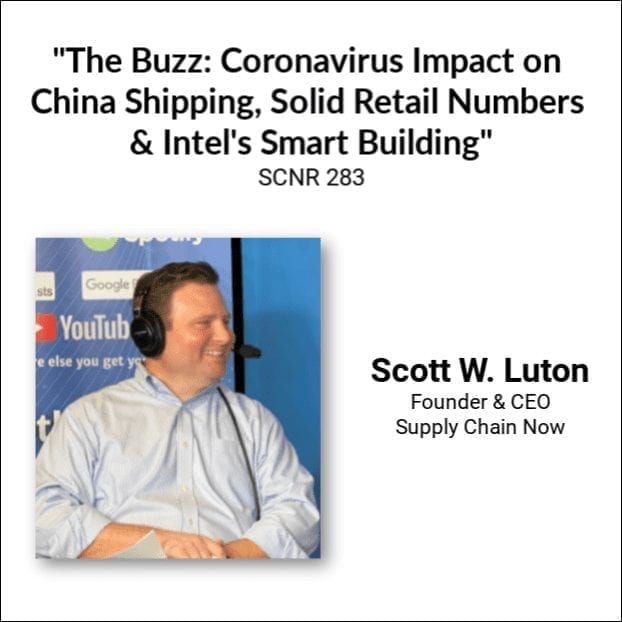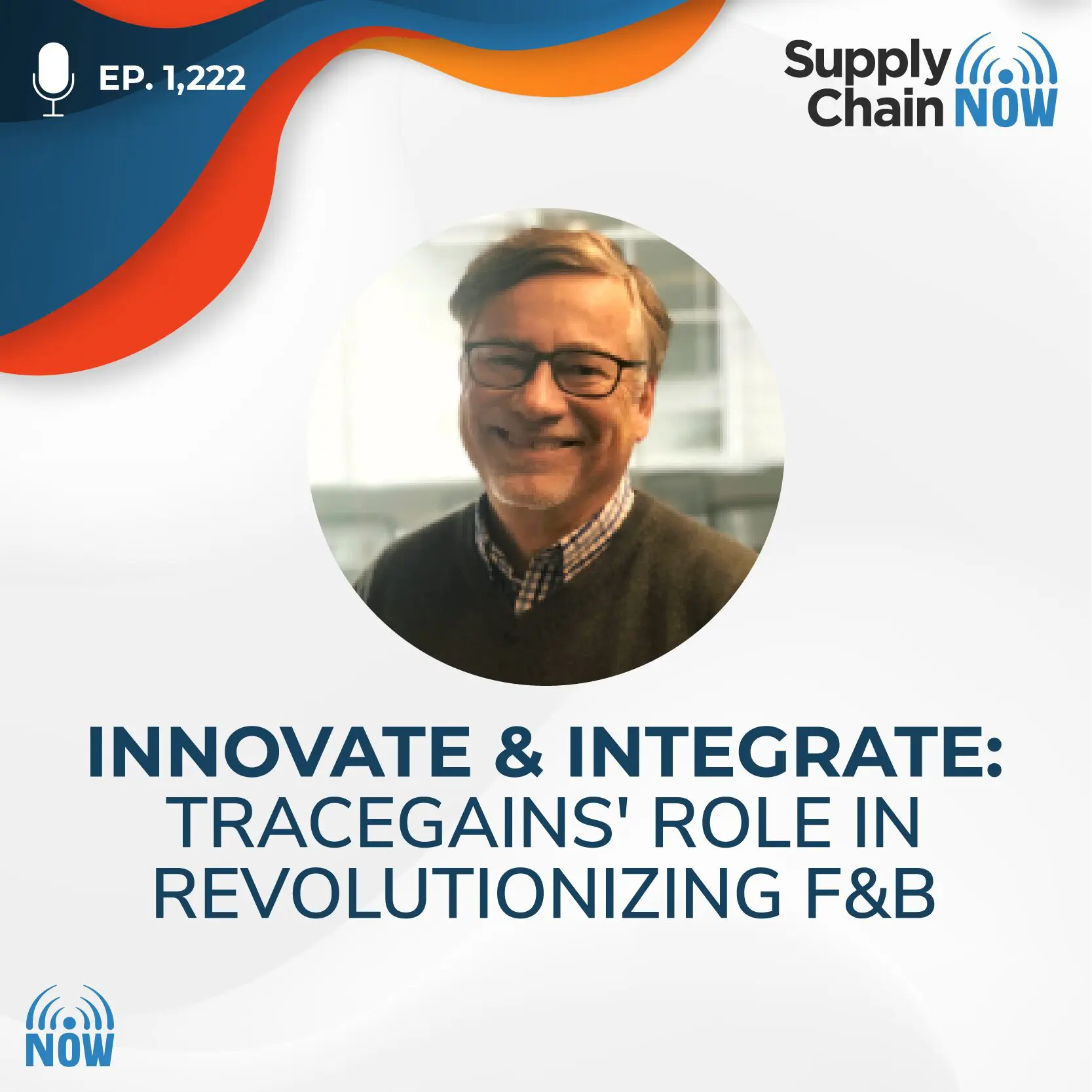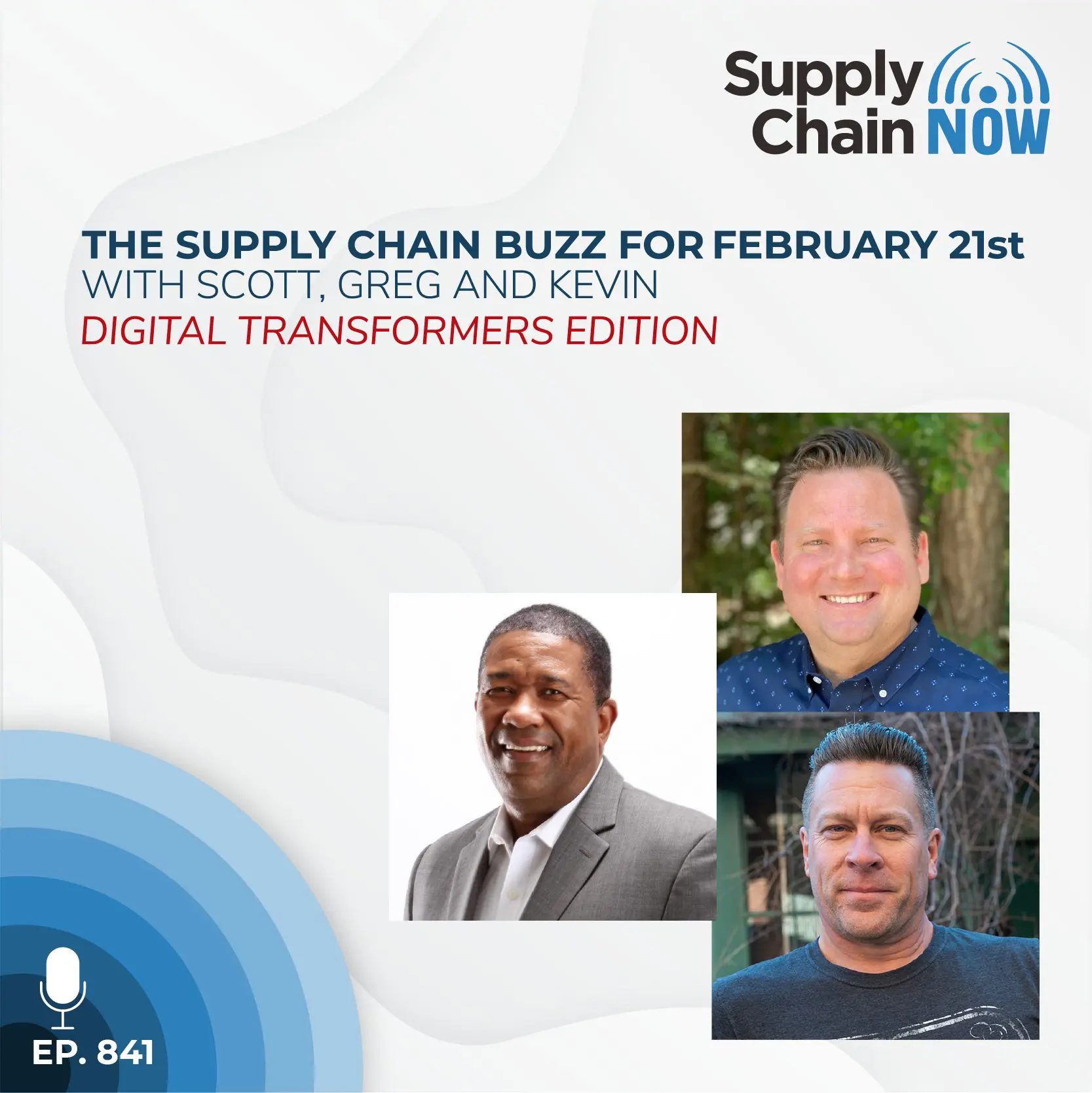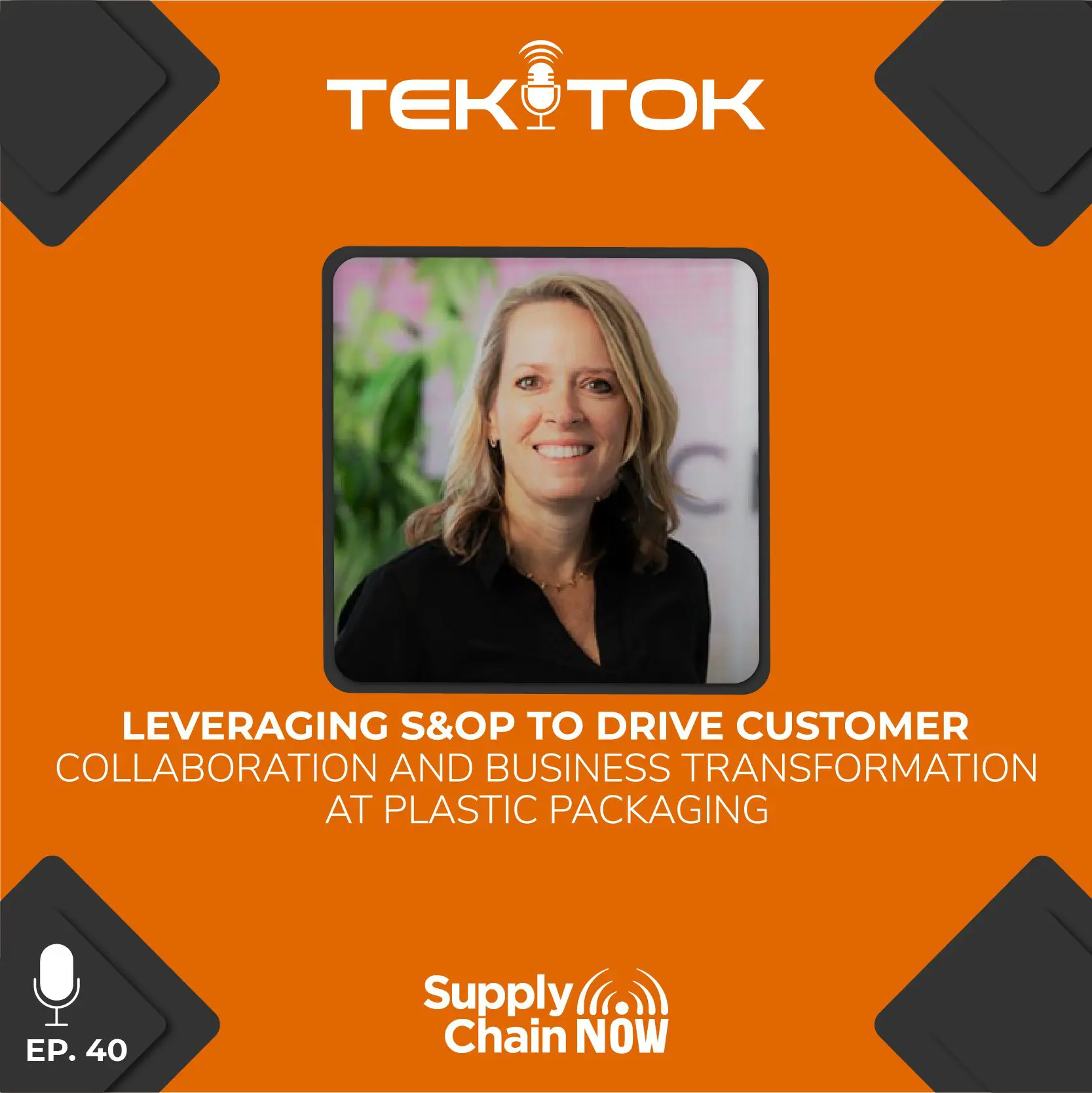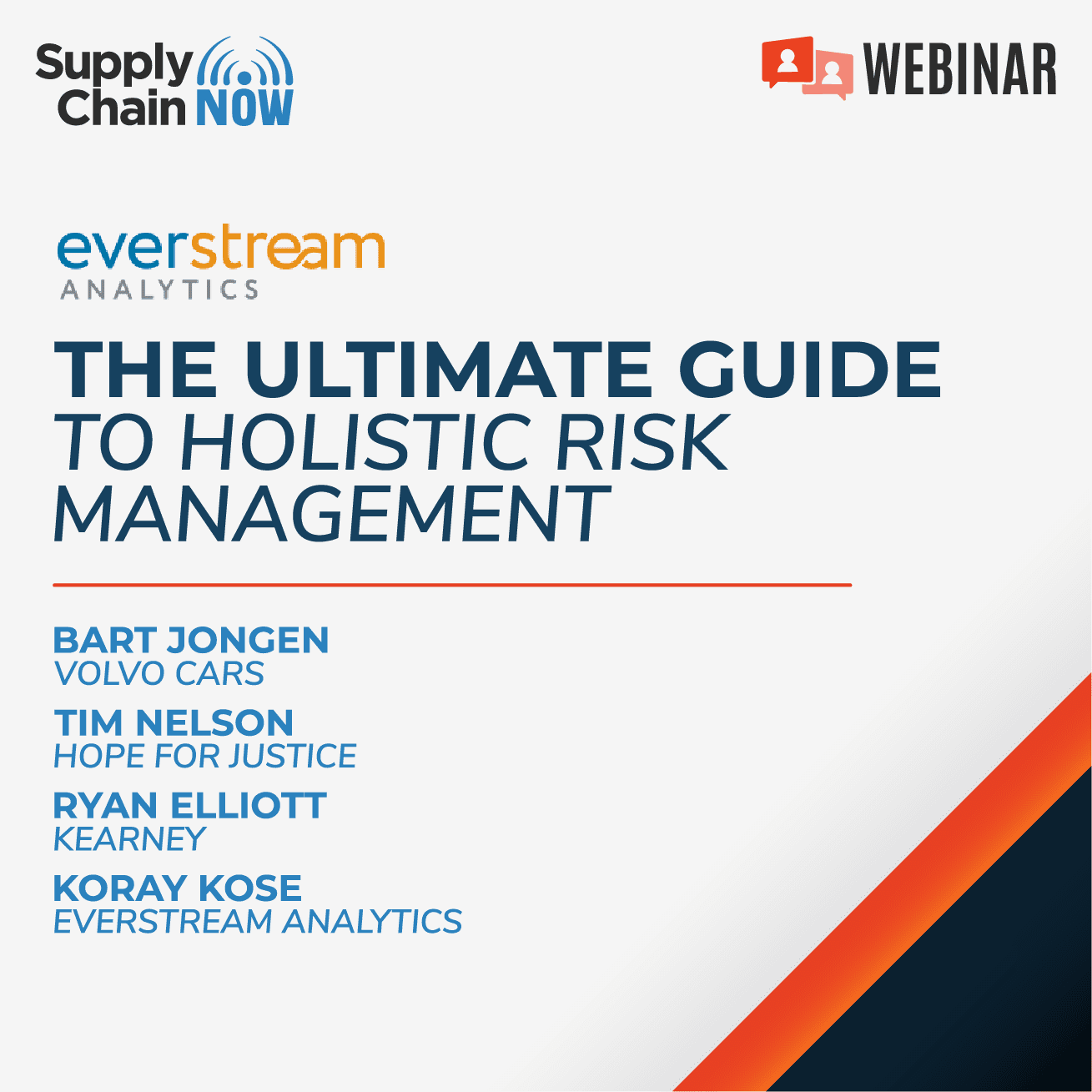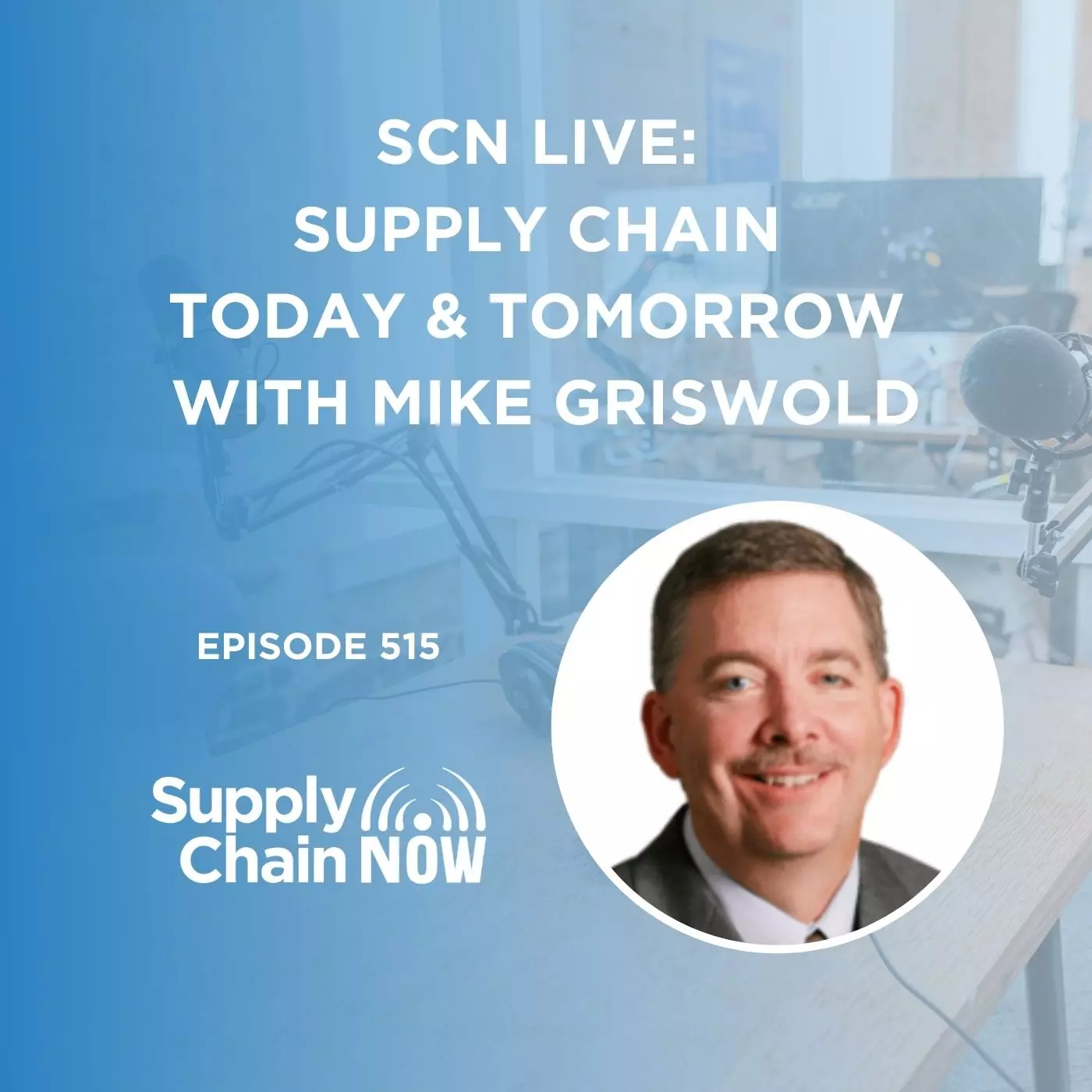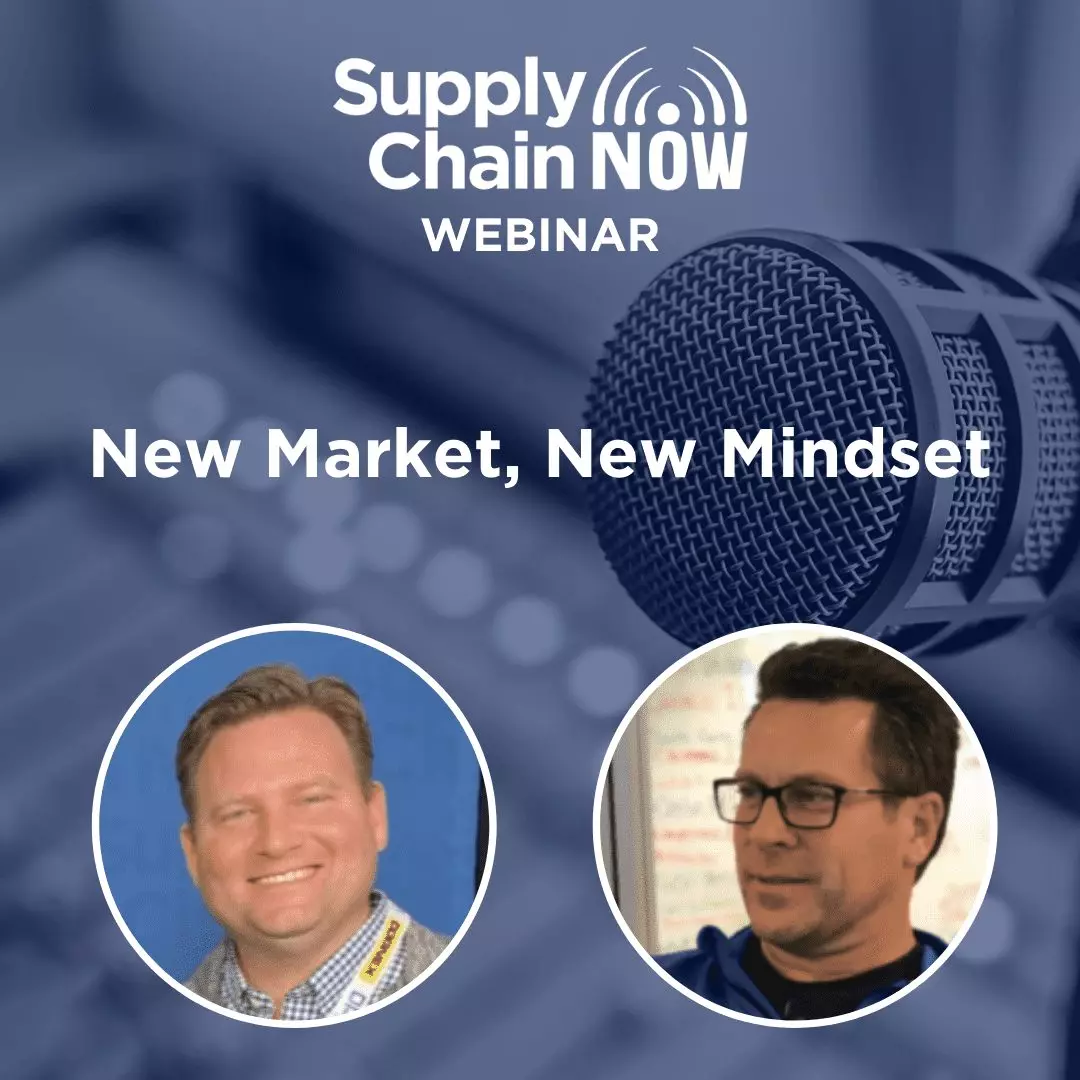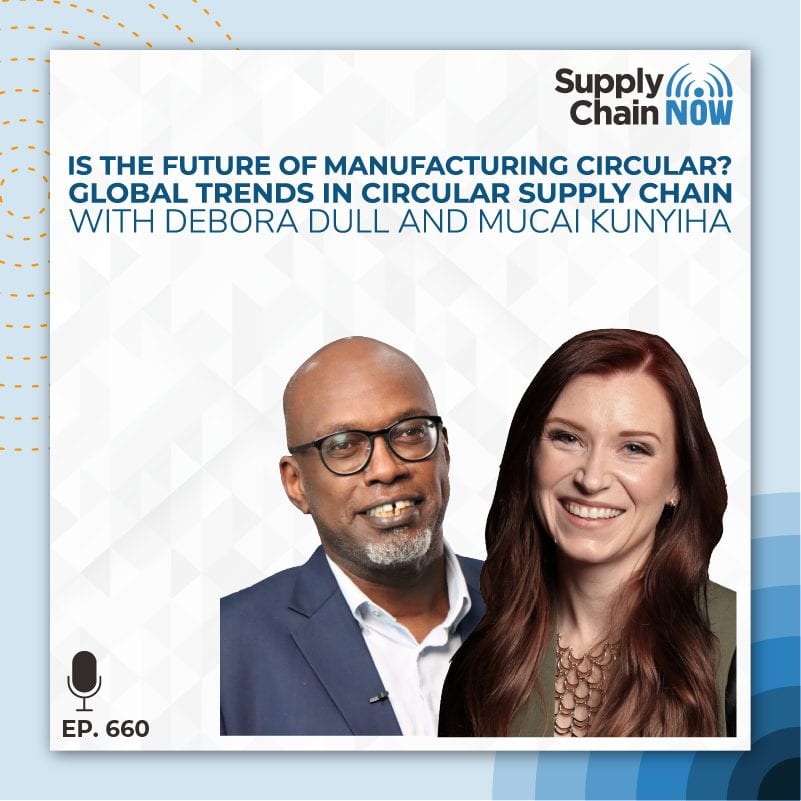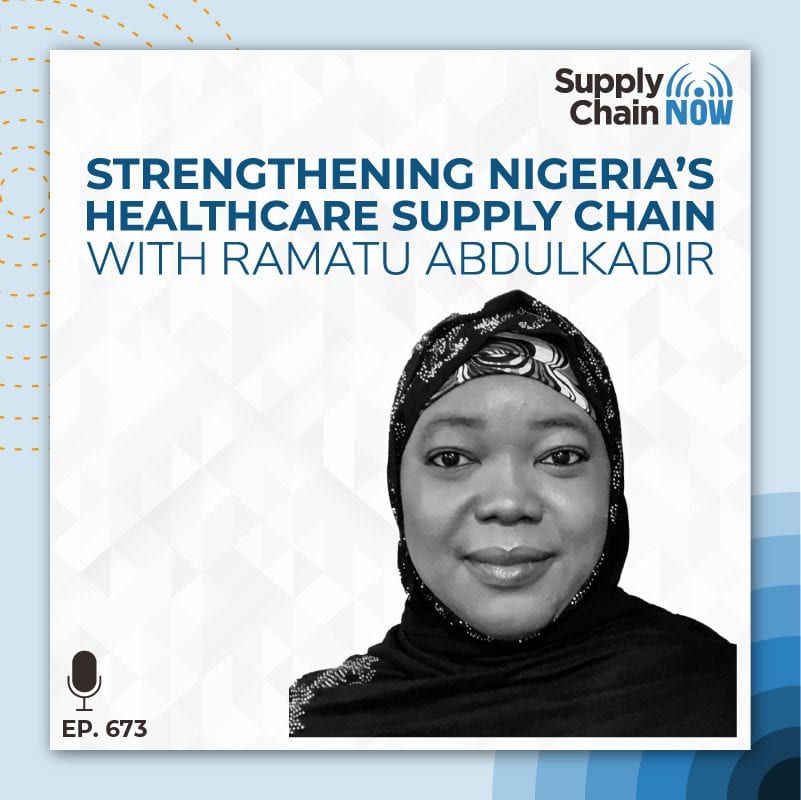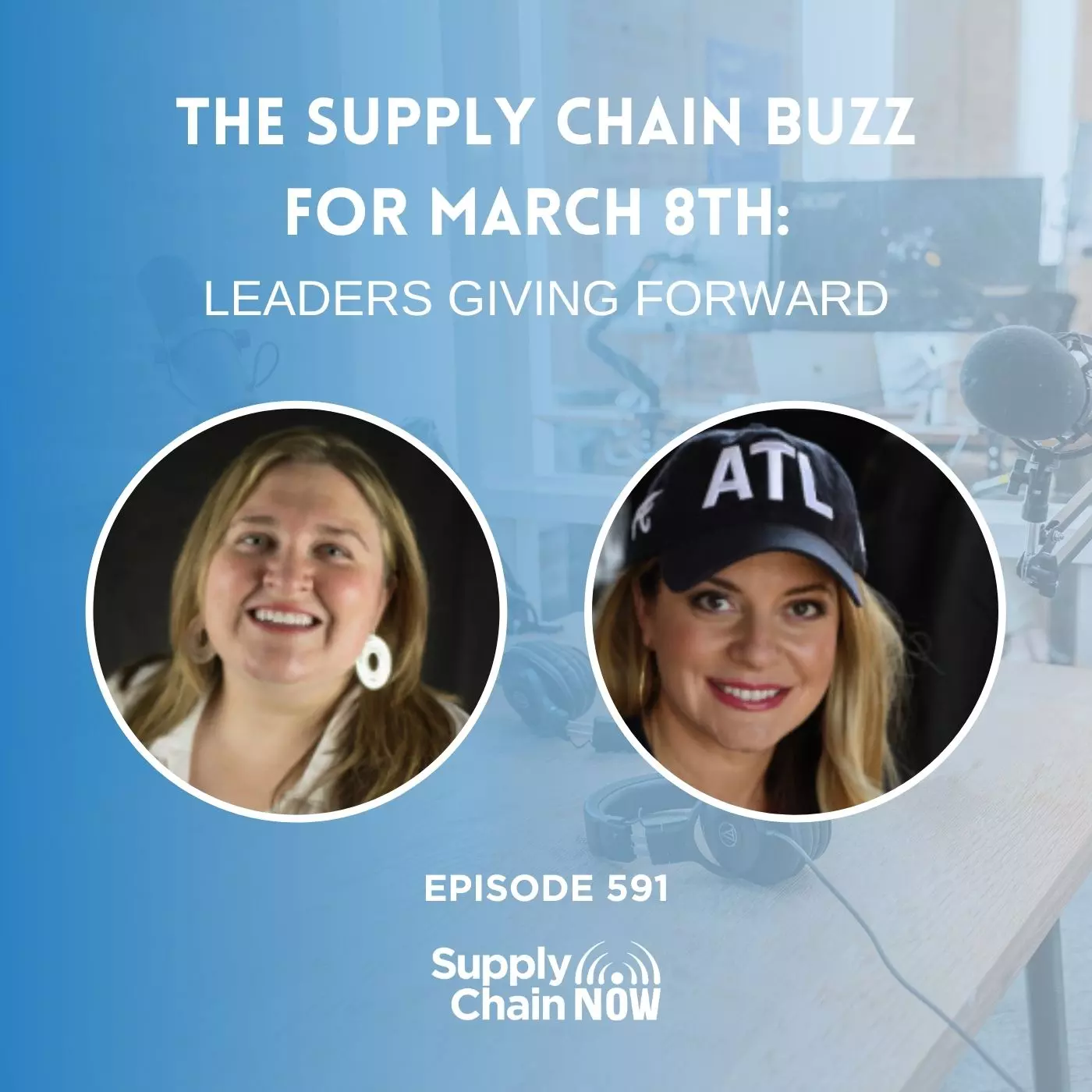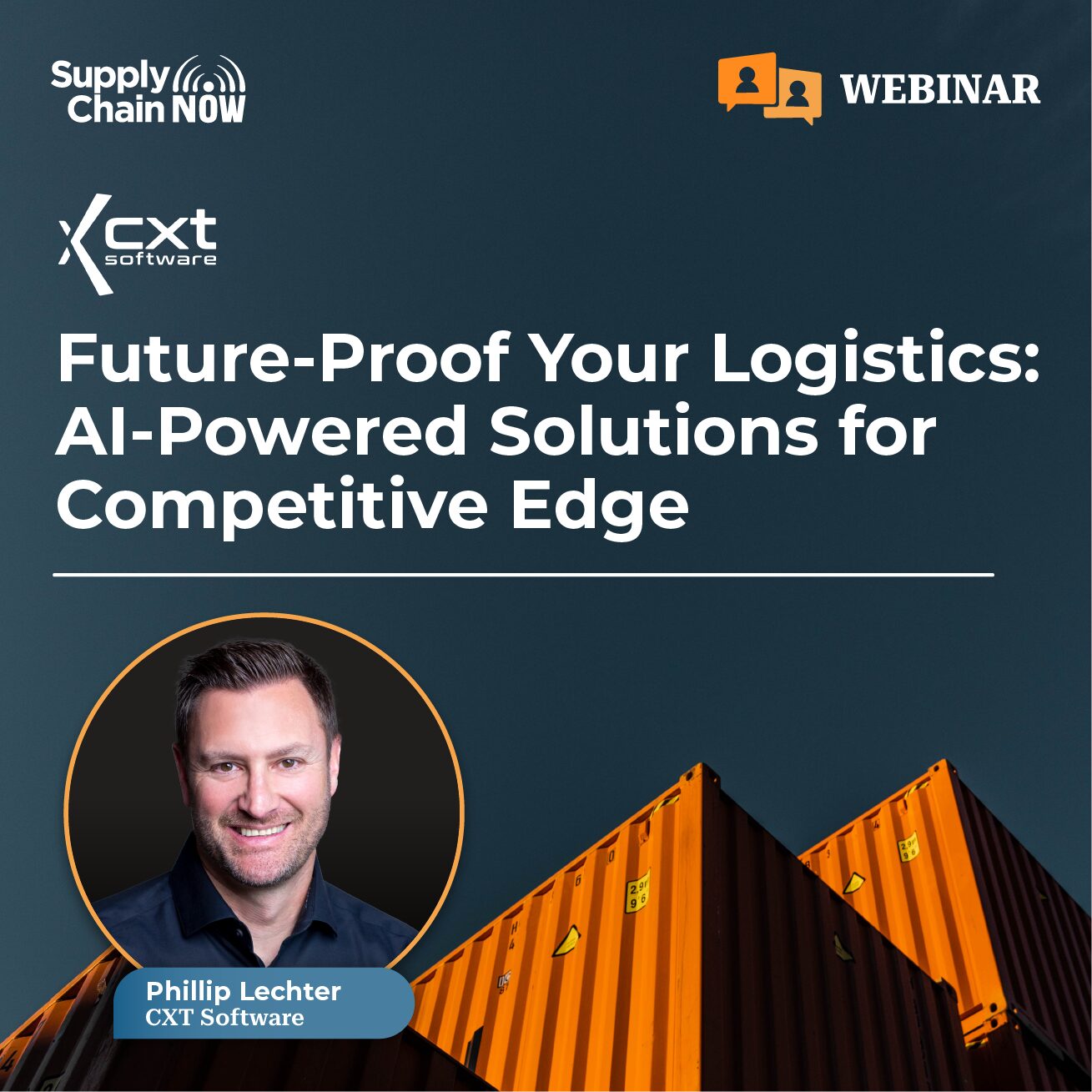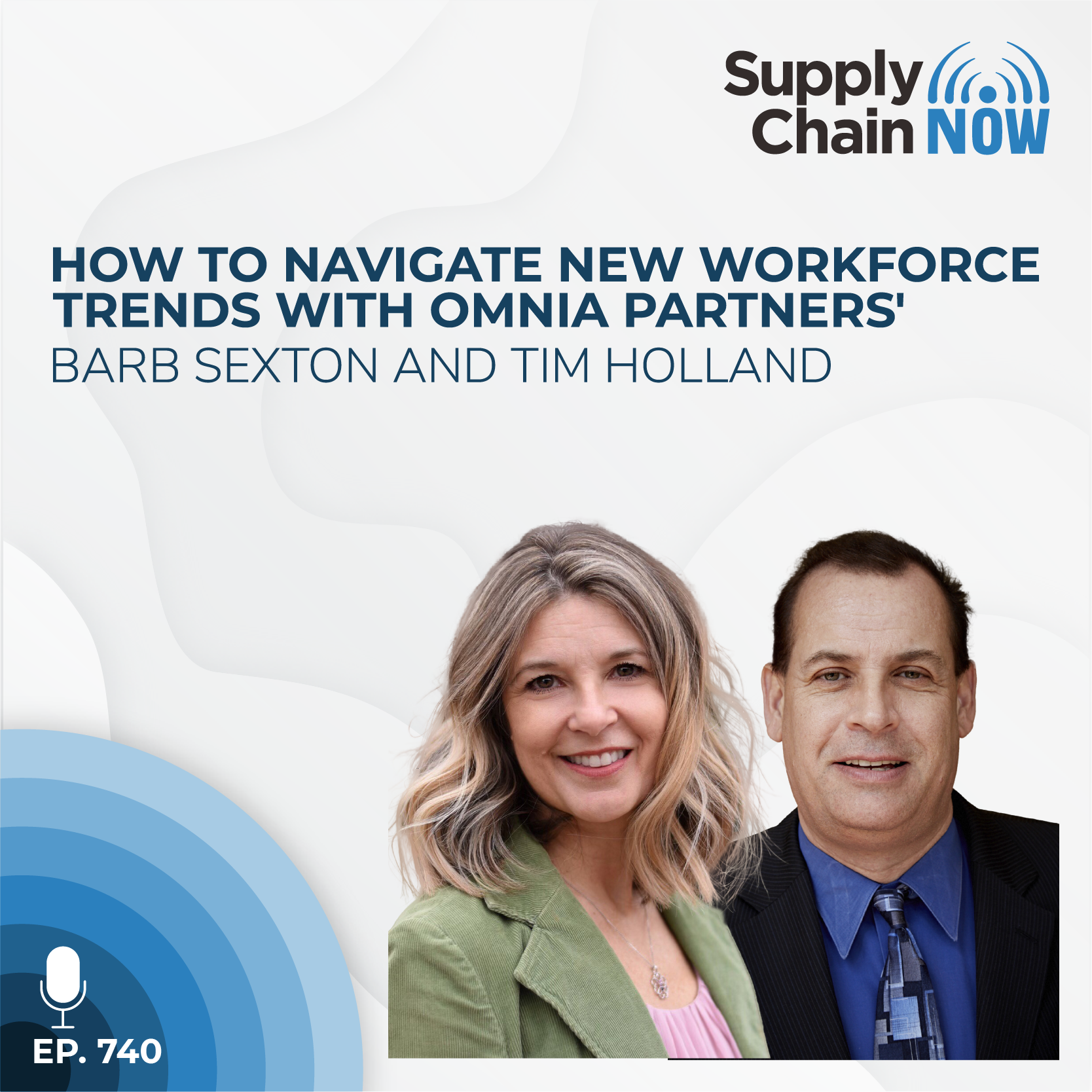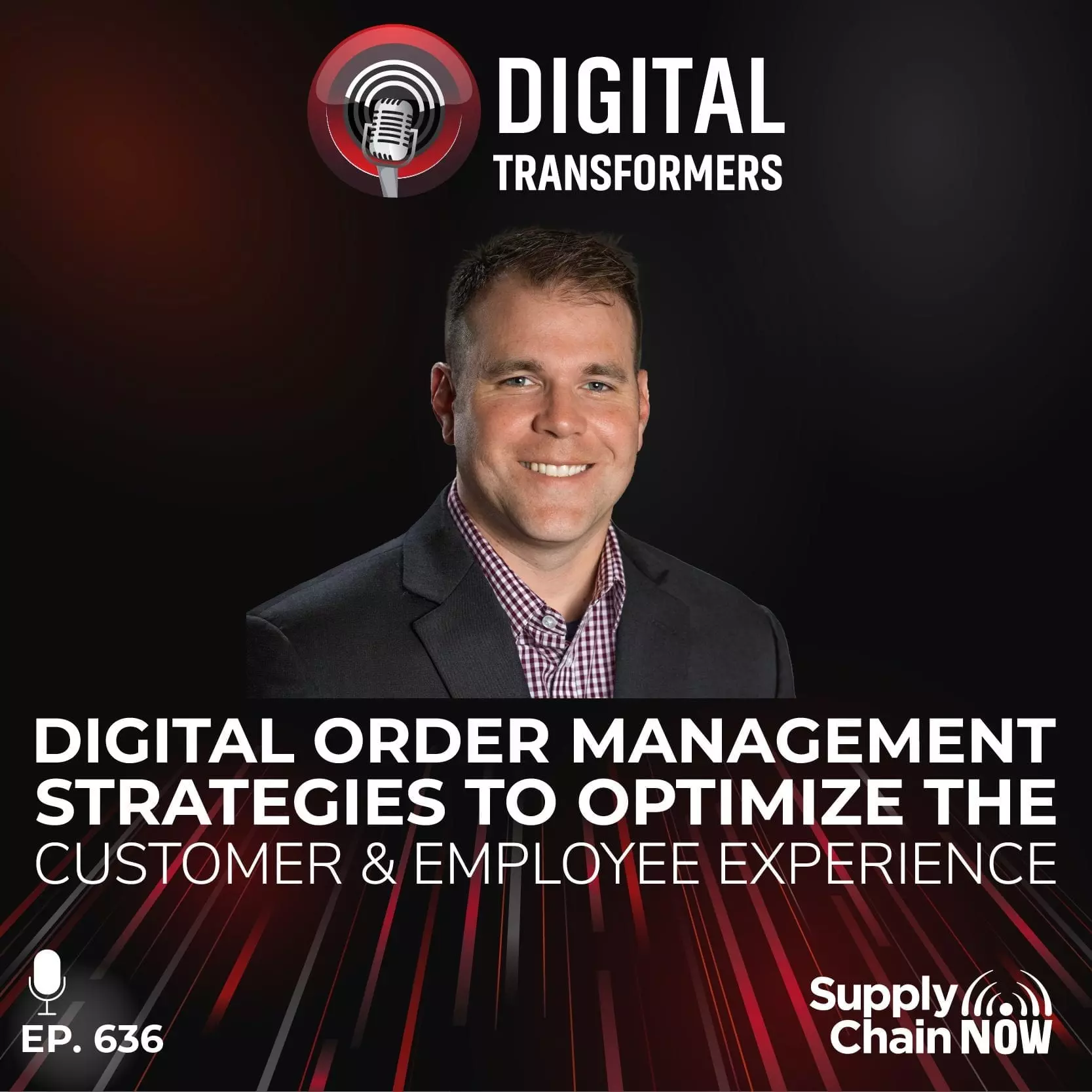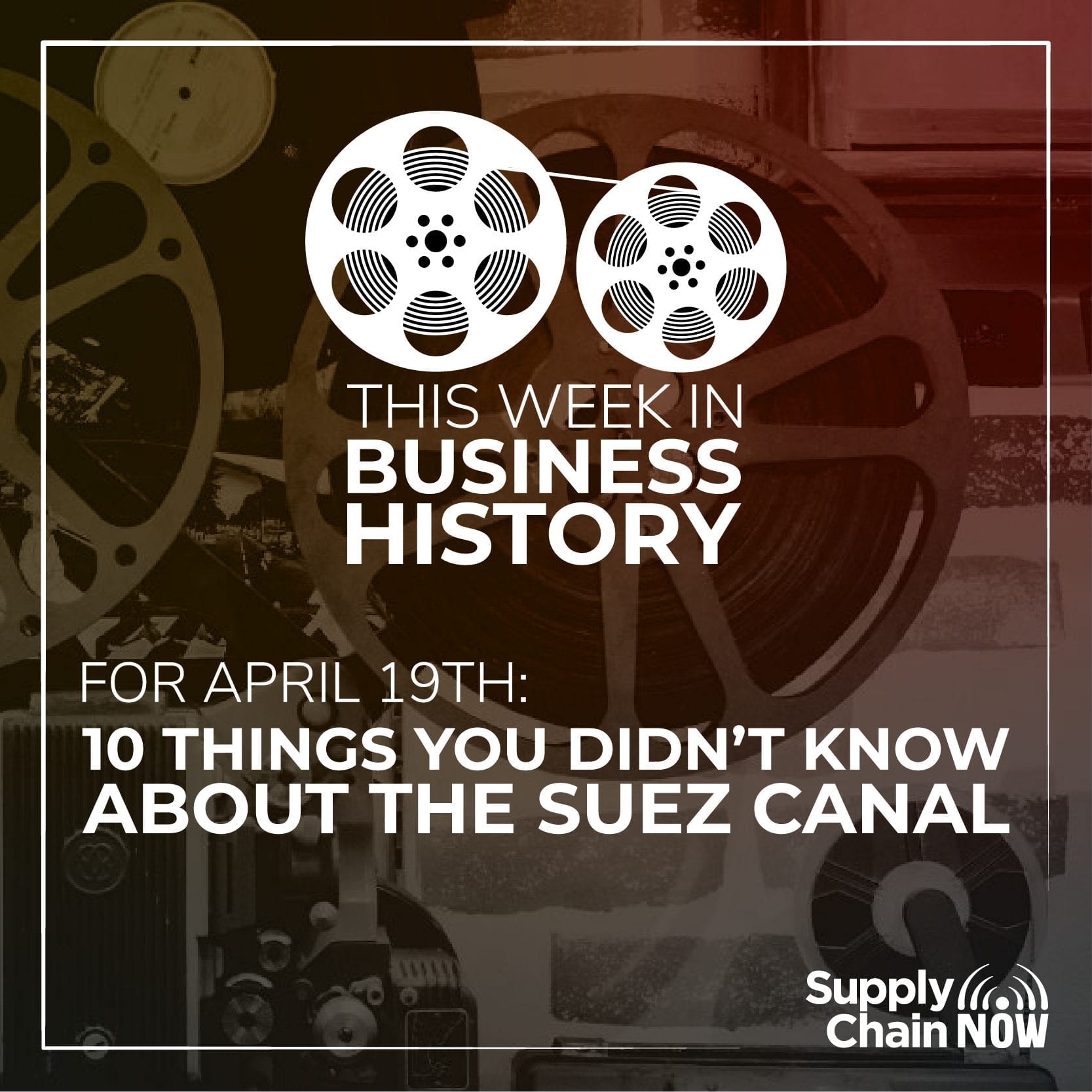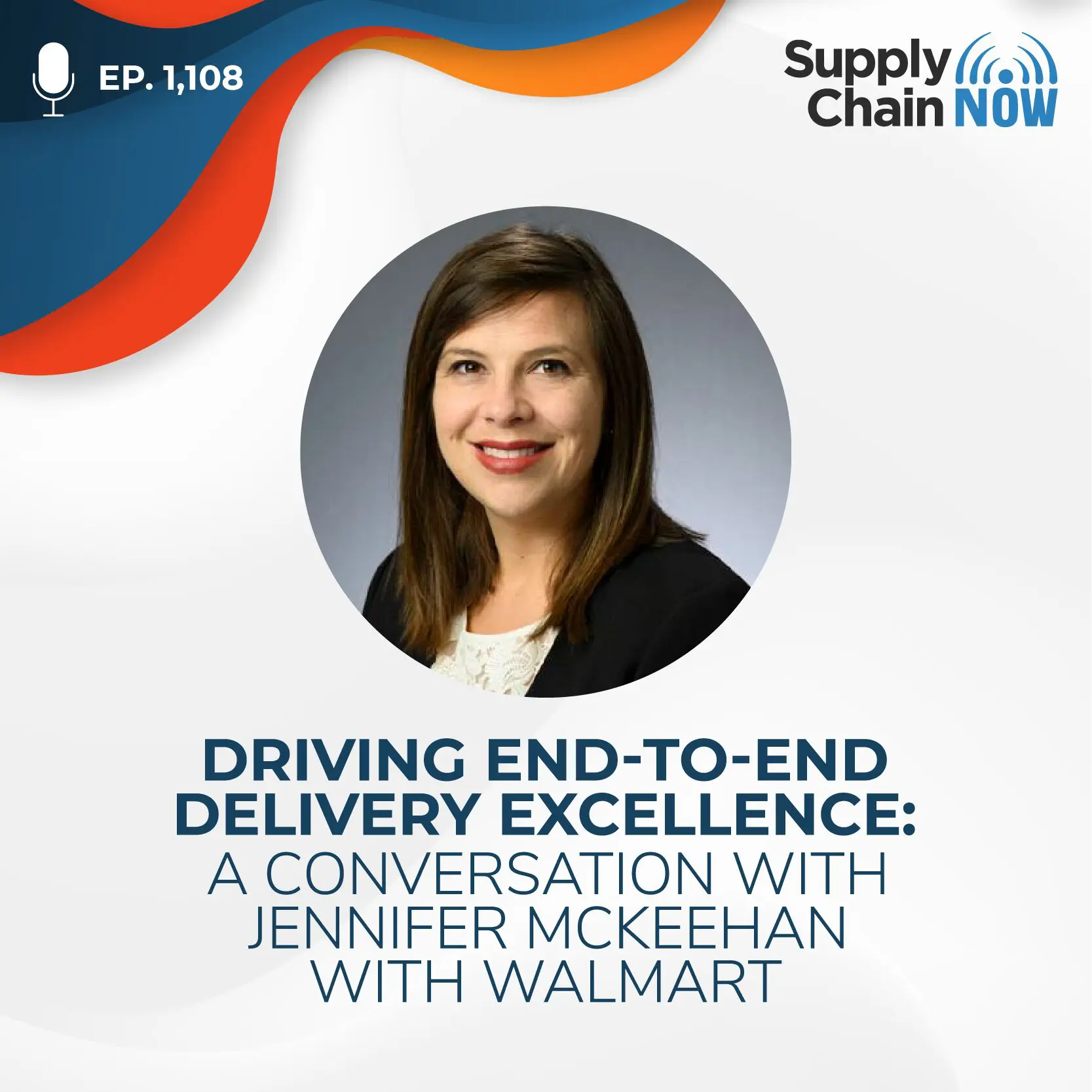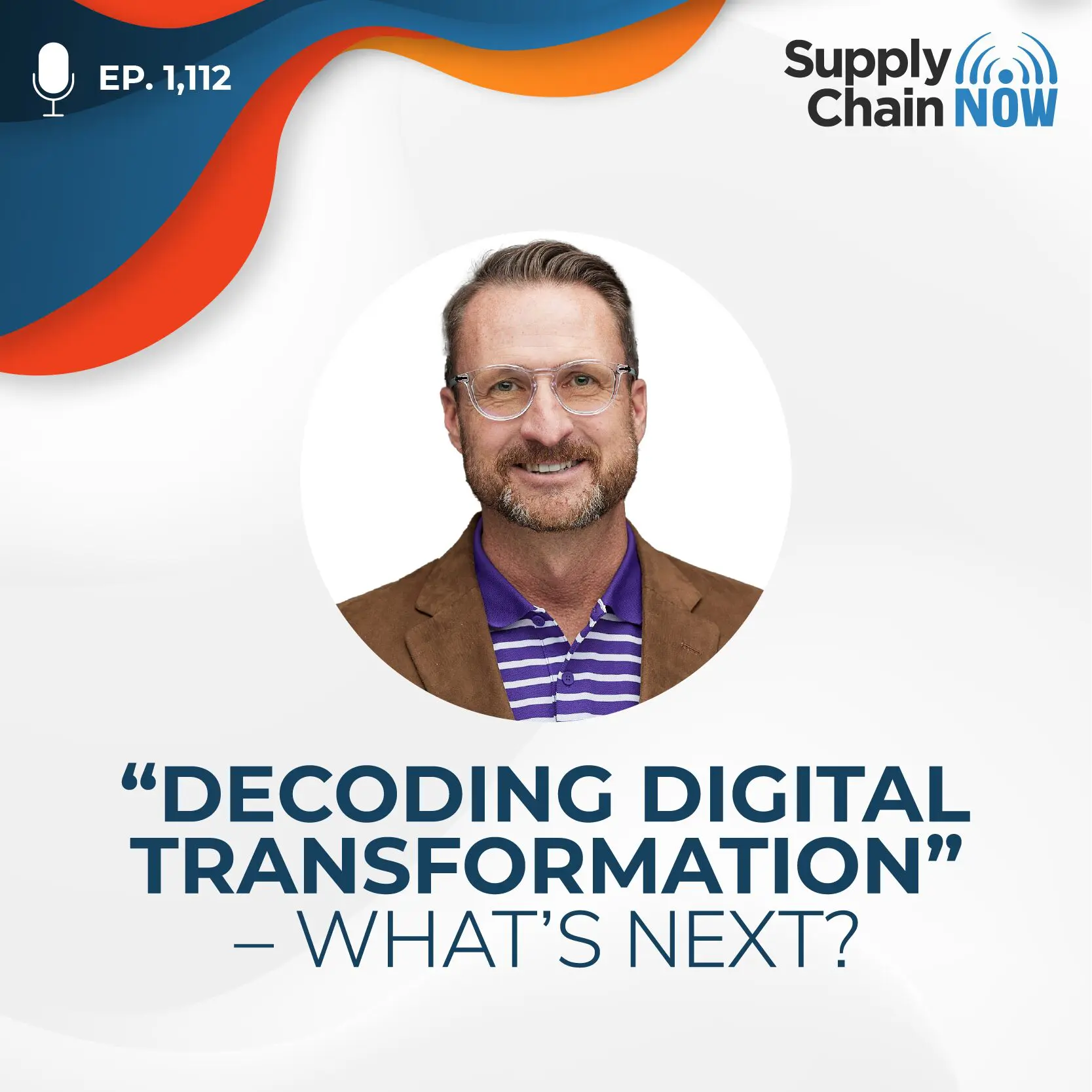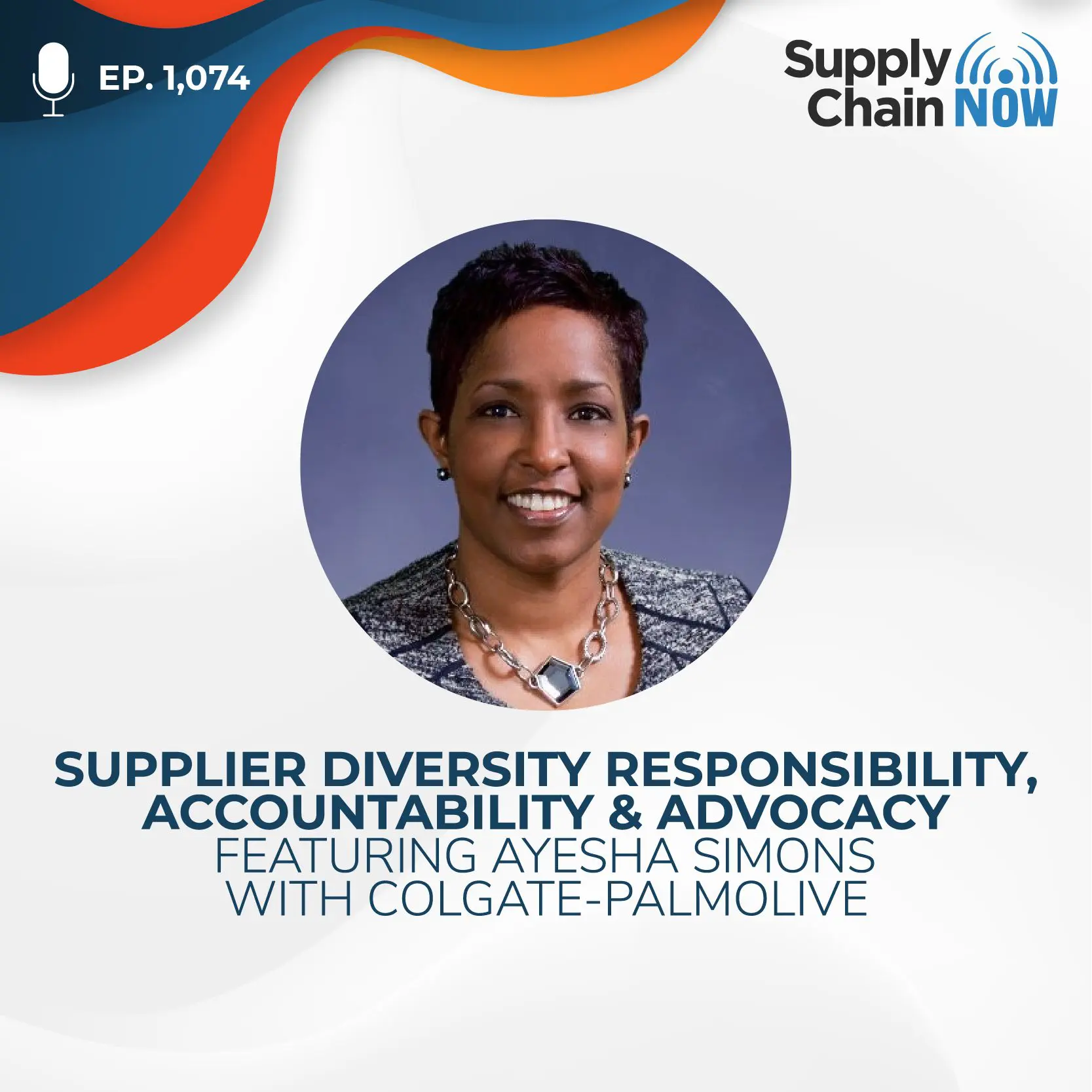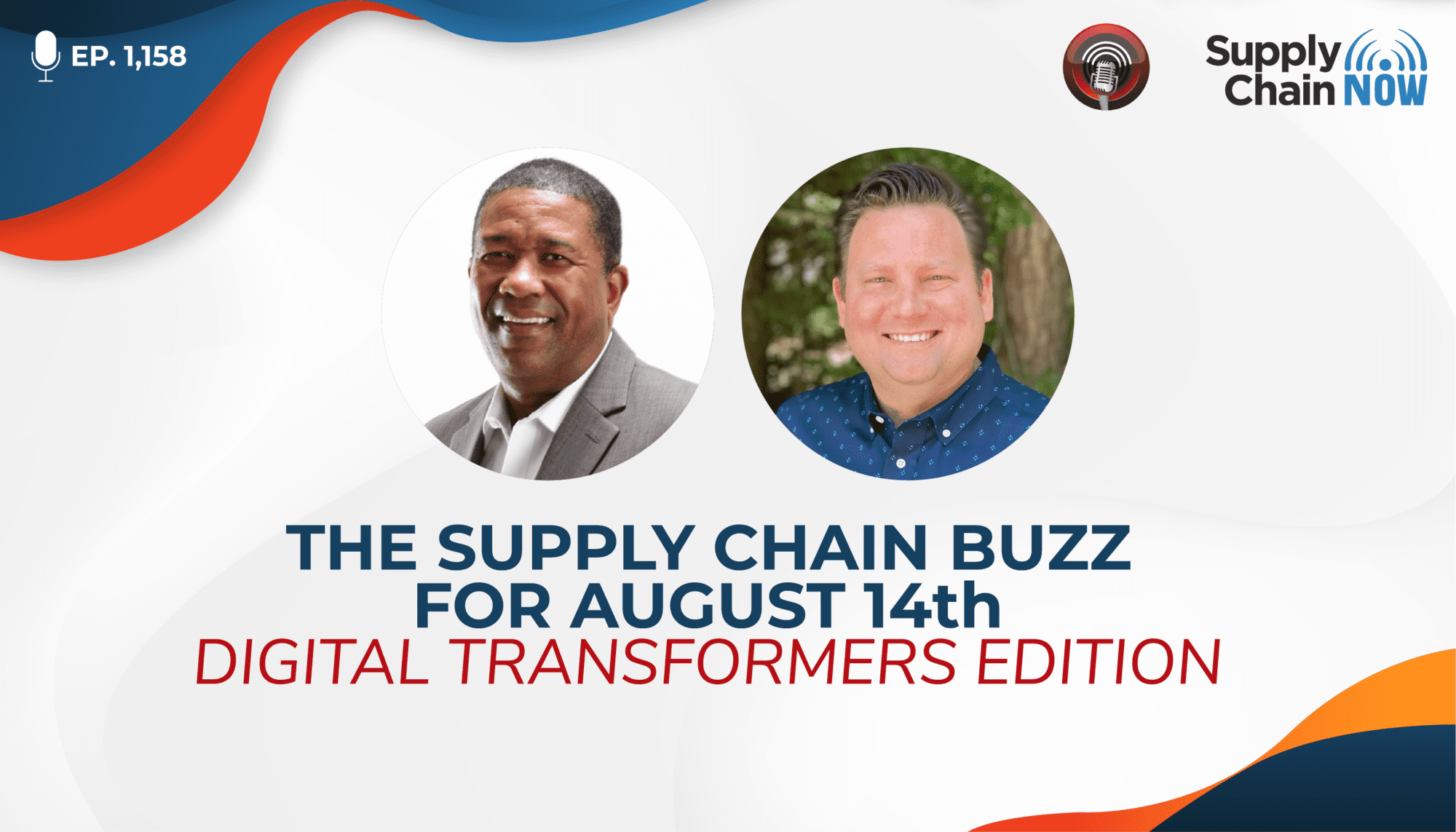
You need champions who understand the benefits of data-driven transformation and are prepared to advocate strongly for it; you need those leaders, those champions, to bring everyone else along.
- Kevin L. Jackson, Host of Digital Transformers
Episode Summary
The Supply Chain Buzz is Supply Chain Now’s regular Monday livestream, held at 12n ET each week. This show focuses on some of the leading stories from global supply chain and global business, always with special guests – the most important of which is the live audience!
This week’s edition of The Buzz was a Digital Transformers edition, and it featured hosts Scott Luton and Kevin L. Jackson. In addition to discussing recent news stories, Scott and Kevin shared their favorite business books, including “Chip War” by Chris Miller and “Quitless: The Power of Persistence in Business and Life,” an anthology of insights from some of the most successful entrepreneurs in the world – including Kevin L. Jackson!
In this livestream, created in collaboration with a live Supply Chain Now audience, Scott and Kevin discussed:
• Why business leaders in the food industry are leaning on digital transformation to enable them to increase accountability, traceability, and visibility in the supply chain
• How supply chain managers are investing in digital transformation to help them reduce risk
• Why it is important to give as much thought to the information in a company’s value chain as the physical goods in its material supply chain
Episode Transcript
Intro/Outro (00:03):
Welcome to Supply Chain. Now, the voice of global supply chain Supply chain now focuses on the best in the business for our worldwide audience, the people, the technologies, the best practices, and today’s critical issues, the challenges and opportunities. Stay tuned to hear from Those Making Global Business happen right here on supply chain now.
Scott Luton (00:32):
Hey, good morning, good afternoon, good evening, wherever you’re Scott Luton and Kevin L. Jackson with you here on Supply Chain now, Kevin, how you doing today?
Kevin L. Jackson (00:39):
Hello? Hello. It’s a grand Monday morning. You know, I, I looked out and it was fricking August. I know, I know. It’s August 14th. It’s been like almost two weeks of August, but it just happened, man. Didn’t, it just happened. Where did the summer go? People in school? I mean, you guys have been in school for two weeks. Uh, I think I here up in Virginia. It just starts, uh, this week. Yeah, it’s amazing.
Scott Luton (01:05):
It is. Well, if y’all lost Summer and can’t, don’t know where it went, we caught it down here for you because it is hot. <laugh> hot, hot. And hey, if, if y’all can’t tell, it’s raring to go. I didn’t even get a chance to welcome everybody to today’s live stream. As y’all can tell, it’s a special edition of the Supply Chain Buzz. It’s the Digital Transformers edition of the Buzz today. Kevin, this is one of our favorite conversations, uh, on the second Monday of each month, right?
Kevin L. Jackson (01:32):
Yes, absolutely. I can’t wait. I mean, I, it’s on my calendar every month, man. <laugh>, I gotta do this more often.
Scott Luton (01:39):
We got, we go through your agent every month to make sure <laugh>, uh, you’re back from your world tour. But hey, folks, we’re gonna be discussing a variety of news and developments here across global business and with an extra helping of all things technologies today. For sure. Uh, we wanna hear from you though, so give us your take in the comments throughout the show. We’ll be sharing those and commenting on those. And, hey, if you’re listening to the podcast, replay y’all to consider joining us live on LinkedIn or YouTube, or some other social media channel of your choosing. We’re live every Monday at 12 noon Eastern time, which Kevin, I think right now mm-hmm. <affirmative> is 6:00 PM Central European time. Does that sound right?
Kevin L. Jackson (02:17):
Uh, yes. That’s, that’s, that’s right. But wait a second. I think that it didn’t have daylight savings in Central two. Ah,
Scott Luton (02:25):
Well, you know what? So it may
Kevin L. Jackson (02:26):
Be five.
Scott Luton (02:28):
Okay. Well, let’s ask the experts. So I met
Kevin L. Jackson (02:31):
<laugh>, we got people in Europe on the line, don’t we? That’s
Scott Luton (02:34):
Right. Uh, I met Kia, uh, in Cape Town at the Saex Conference. Great to see ya. And she says she is ready to shed off <laugh> for the Winter <laugh>. Uh, and so, uh, I’ll
Kevin L. Jackson (02:46):
Try <laugh> some people in winter right now, don’t they? <laugh>
Scott Luton (02:50):
Evan’s confirming a force via YouTube. So yes, it’s, uh, just after 6:00 PM Central European standard time. And Evan is in, uh, Germany. How do you say that? Rootling? Kevin, do you see that? Rootling?
Kevin L. Jackson (03:04):
Uh, yeah, I saw Root. Yeah. Rootling, I guess. Okay.
Scott Luton (03:08):
Well, welcome, welcome, Evan, uh, Vishnu from India and Sole from Jordan. Great to see you all via LinkedIn, except Evan is on YouTube. I
Kevin L. Jackson (03:16):
Really love, I really love this international, uh, flavor. Our audience. I mean, it is, this is awesome. Thank you.
Scott Luton (03:24):
Definitely the brightest, the brightest audience in all the, the globe, I should say. I almost said the Land <laugh>, but it’s, it’s the globe <laugh>. It’s bigger, it’s the globe than the land. Um, hey, and our, our dear friend Alan Jacques from Canada is back with us here today. Great to see you, Alan. Looking forward to collaborating with you again soon. And Greg is back from Milwaukee, Wisconsin.
Kevin L. Jackson (03:47):
Oh, not the country. Wisconsin. <laugh>.
Scott Luton (03:49):
Kevin, you’ve been to, uh, Milwaukee. Oh, I
Kevin L. Jackson (03:53):
Had been to Milwaukee. Yeah. I’ve, uh, you know, uh, home of the Brewers, right?
Scott Luton (03:58):
That’s right. Home of the former home of the Atlanta, uh, of the Braves franchise. Of course, the Braves were in Boston, and then Milwaukee, and then Atlanta, and still the Braves were the only franchise to win a World Series in three different cities. How about that? Kevin
Kevin L. Jackson (04:13):
<laugh>. That’s amazing. You kind of, you, you, I, I, I see the transition. I see the transit. Don’t go there.
Scott Luton (04:20):
So, <laugh> with that said, perfect segue with that said folks, Kevin and I, and really the whole team here at Digital Transformers and supply chain. Now we’re here to offer up resources to help you in your journey ahead. And Kevin, I want to, uh, share mm-hmm. My screen here. And we’re gonna talk about, um, the, with that said digital newsletter that we dropped over the weekend. Now, Kevin, are you as big of a manufacturing fan as I am?
Kevin L. Jackson (04:48):
You know, you gotta, in order to buy stuff, someone has to manufacture it. You know, I like buying <laugh>, of course. <laugh>.
Scott Luton (04:58):
Well, I’m a big, uh, big manufacturing fan. In fact, I wish I had discovered it much earlier in life. I, I made it all through high school and college, Uhhuh, <affirmative>, and outta the Air Force before I ever set foot in a manufacturing plant, Kevin. And had that been different, I believe had I, uh, uh, gotten a student tour back when I was a middle school or high school, I think my whole career path would’ve been different. I love the manufacturing industry. So Kevin did, you know, and we’ll talk about it more on with that said, but manufacturing day manufacturing, which a, they set aside for probably the last 10 or 11 years to really lift up and amplify what goes on the manufacturing industry. That is October 6th every year. Did you know that?
Kevin L. Jackson (05:38):
No, no. That’s coming up here. Soon. We gotta go out and manufacture something. Oh, maybe what we should do is dress up like, uh, a manufacturing line, right? <laugh>, <laugh>,
Scott Luton (05:48):
Absolutely. Let’s do it all. Let’s do it all.
Kevin L. Jackson (05:50):
That’s your favorite product. Yeah,
Scott Luton (05:52):
<laugh>. But the cool thing is, we want to give folks lots of lead time to get prepared. First off, to become aware of manufacturing day and all the, I mean, there’s slew, there’s a slew events, uh, really probably across the globe, but certainly across the country here in the us. And so y’all check out. With that said, we dive into that, some manufacturing factoids and some other things. So check that out and be ready, Kevin, for all of you out there, be ready to, to strike up the band, the parades, whatever it takes to really celebrate all the wonderful people that make up the manufacturing industry. Kevin, your last word here, and we’re gonna move on.
Kevin L. Jackson (06:28):
Yeah. My last word is on manufacturing day. All the assembly lines shut down. That’s a problem.
Scott Luton (06:35):
<laugh>. That’s an excellent, that is an excellent question. Uh, well, kidding aside, what I do know happens, and one of the reasons they’ve gotta keep those lines going is they have hundreds of plant tours. Hmm. Uh, in fact, our dear friend, Allison Creche Giddens, who is a, a special co-host here and who leads a, uh, manufacturing operation in metro Atlanta, she loves bringing students in and get, get a, uh, uh, uh, put their eyes and ears on what a production environment is like. That’s, we need to do more of that, don’t we, Kevin?
Kevin L. Jackson (07:04):
Yeah, yeah. Absolutely. I think, you know, uh, bringing the, uh, students, you know, college, high school, even elementary and, and to the, uh, uh, environment, real life environment, so they can actually envision what they can do in this world, how they can contribute to society. All that is critical. I was so happy when they do the, you know, uh, bring your child to Workday. Yes. Uh, I think, you know, a lot of children really don’t know what their parents do or, uh, how, um, uh, they, they, they don’t see how their parents link to the rest of society. I think that’s all, that’s all critical. It’s part of the learning.
Scott Luton (07:47):
Absolutely. Kevin. And you know what, it’s been proven time and time again, anecdotally and through research that the, uh, younger generations, they want to see the system level, where they fit in, where they contribute, where they can move the needle, and how it all rolls up into the greater, um, strategy and the, the greater system. Um, absolutely. So, excellent point, Kevin. Uh, so folks, we dropped the link again to, with that said, uh, check it out. If you haven’t subscribed, uh, be sure to do that. We release, uh, this newsletter, uh, usually, uh, every weekend, either Saturday or Sunday, because we like flexibility. Kevin, our team loves, yeah. <laugh> flexibility. Alright, speaking of resources, one more thing to share with y’all. Wednesday, 12 noon Eastern time, which is 6:00 PM Central European time. See that Kevin? We learn and apply <laugh>, learn and apply. That’s
Kevin L. Jackson (08:36):
Good.
Scott Luton (08:37):
<laugh>. We’re gonna be diving into T C U Texas Christian Universities working capital report. So Dr. Morgan Swank is gonna join us. Uh, Dan Reeve has been doing big things in the technology space, especially in supply chain, uh, with our friends at Esker is gonna join us, and we’re gonna offer up the data and the research and the to-dos that you’ve got to take away the actionable insights you gotta take away from the research. Kevin. Mm-hmm. <affirmative>, uh, have you got your working capital in a headlock?
Kevin L. Jackson (09:05):
No, it got me in a headlock. <laugh>. I mean, <laugh>.
Scott Luton (09:10):
I don’t believe that.
Kevin L. Jackson (09:11):
Sorry. You know, here I’m doing, uh, airing my dirty laundry. You know, <laugh> capital is a good thing, except when you don’t have it. <laugh>
Scott Luton (09:19):
<laugh>. That is right. That is right. Uh, and you know what? It’s loosening. It’s loosening. I read the other day, Kevin, kidding aside, that after a, a plethora mm-hmm. <affirmative> of investments and deal making, especially in the supply chain startup space that, you know, there was a tightening going on. But, uh, we’re starting to see some signs that that tightening is loosening a little bit. So lots more deals, lots more working capital out there. And, uh, Kevin, I’m sure you’ll have yours in the headlock, uh, very, very soon.
Kevin L. Jackson (09:48):
I’m gonna be on that, uh, webinar that at that live stream,
Scott Luton (09:51):
<laugh>. Okay.
Kevin L. Jackson (09:52):
We’re learning something. Hopefully
Scott Luton (09:53):
All of y’all will be, it’s, it’s, I promise you it, it’ll be a, a, a well spent investment of an hour on Wednesday, and we drop the link here. Y’all can check out the easy link to, uh, to sign up and register so you don’t miss it. Hey, T Squared is holding down to Fort Force on YouTube, and he says, Kevin, a tour of a plant is a great ground zero to seeing how it’s made. I love the pun there. Yes.
Kevin L. Jackson (10:17):
Yes.
Scott Luton (10:18):
That’s an excellent show too. Kevin. Have you ever seen how it’s made?
Kevin L. Jackson (10:21):
Oh, I look at it all the time. I tell you learn so much.
Scott Luton (10:24):
And you know what? It really, it time I see, I, I was just watching over the weekend and they were bending steel and, and, uh, I, I forgot what they were making, but there is as much artistry in the manufacturing space as there is engineering and, and technical know-how. It’s just amazing what folks in the global manufacturing industry have can figure out day in and day out, huh?
Kevin L. Jackson (10:47):
Yeah, I was looking at a show, it wasn’t, uh, how things are made, but it was a, uh, how, um, how food changed the world or something like that. Okay. It was, well, it wasn’t food or, yeah, it was talking about how the, uh, shave, um, shaving blades were, uh, created in a battle between Gillette and Chick <laugh>.
Scott Luton (11:10):
Interesting. You know, every time I hear Gillette, I think about the, uh, razor and razor blade Yep. Uh, business model. You know, it’s really interesting. Uh, y’all look that up and, uh, yeah,
Kevin L. Jackson (11:23):
We’re talking about how it took him 10 years to figure out how to get a blade thin enough so that it could be disposable. Because think about it, this was a manufacturing thing, right? Uh, it had to be cheap enough so you can throw it away. And it had to be thin enough so you could actually shaved because they wanted to get rid of, uh, the time it took to actually sharpen the blades every time. That’s right. And that, that balance, uh, between costs low enough so you can throw it away and thin enough. So you didn’t have enough, didn’t use enough material. Yeah. You had less material so it could be usable. Those are fascinating, you know, balances of business.
Scott Luton (12:07):
It is fascinating. And these days you gotta a razor with like seven or eight blades on it, <laugh>, so, you
Kevin L. Jackson (12:12):
Know. Right. Exactly. Wonder. Uh,
Scott Luton (12:14):
But really quick, and Kevin, I know you can relate to this to some degree, although you were an officer and I was enlisted, uh, in basic training when I first arrived in San Antonio, really hot San Antonio back in 1994. Mm-hmm. <affirmative>, the first thing they let it, they told us to do, you know, put your stuff down and get in that bathroom and take off every hair off your face, <laugh>. And they were, you know, they were breathing the NTI were breathing down our, our neck and all. And so I had a, I had a, uh, Gillette sensor, I think a little two blade thing, right? Mm-hmm. <affirmative>. And I was, I was trying to rush really quick, and the, the, uh, the razor came off the handle, right. And it just broke <laugh>. And I had to, uh, finish my razor, my, my shave, holding the two blades. And Kevin, I’m ashamed to say I took off a corner of my lip, but I was
Kevin L. Jackson (12:59):
Not <laugh>.
Scott Luton (13:00):
I was not gonna let those, uh, training instructors down. So as I jumped back in formation, I had blood coming down my mouth. Glad
Kevin L. Jackson (13:07):
Blood. You sucking your own blood, right?
Scott Luton (13:09):
Yes. I’m glad to know social media was around back then, but, alright.
Kevin L. Jackson (13:13):
Hey, before you go, you were yelling, doing that shoutout to people. I wanna do a shout out, uh, to, uh, Morne, uh, sushi in Morocco. Okay. Because you had hot, and that reminded me of the time I was in, uh, Rabat, uh, Morocco. I was on a, uh, I did a, uh, century ride on a, on a bicycle, okay. In the middle of the summer, <laugh> Oh. In Morocco. But, uh, I just wanted throw a shout out. I, it was a beautiful ride. I really enjoyed it. I’m jealous. And it’s been a while since I’ve been back to Morocco. But it’s great to see someone from Morocco 1 0 1.
Scott Luton (13:48):
Uh, I completely agree. And one more shout out. Hey, rah, Jose, the one and only look at that Hollywood GQ headshot there. Uh, <laugh> Rah says, you guys are the best. If you don’t know how it’s made, you can’t sell it. And you definitely can’t build a supply chain to make it. Man. Shakespearean well said Co. Rob, I’m looking forward to your, uh, that top 10 list that you and I were, were chatting about on LinkedIn earlier. Okay. So, Kevin, we got to get to work. We’re having way too much fun. Yes. And I wanna start with this first story here today, uh, from our friends over at Food Safety Magazine. Now, more and more business leaders in the food industry are leaning on digital transformation to enable more accountability, traceability, and visibility, all the abilities in the food supply chain. Kevin, tell us more.
Kevin L. Jackson (14:32):
Well, first of all, I’d like to highlight the fact that I use food every day. <laugh>,
Scott Luton (14:37):
True expert
Kevin L. Jackson (14:38):
<laugh>, I dunno about you, but I’m food and uh, and food safety in supply chain is the u And as food products change hands from raw material to finished product, it goes through several touch points like production, transportation, storage, packaging, and, and this really increases the risk of contamination Mm. And fraudulent activities, right? Mm-hmm. <affirmative>. And the more complex the supply chain, the higher the probability of such risk. And we don’t just get our food from our garden in our backyard, right? Or from the town or the farmer in our local, you know, region. This is an international, um, this international supply chain of food. And to enable higher accountability and traceability in the food supply chain, do not US Food and Drug Administration enacted the foreign Supplier verification program via the Food Safety and Modernization Act. This was way back in 2016, <laugh> not that long ago. <laugh>
Scott Luton (15:52):
Feels like an attorney that goes, doesn’t
Kevin L. Jackson (15:53):
It? Yeah. But through the, um, uh, F S V P requirements, food and importers are liable for their foreign based suppliers. So if you’re in food supply chain, you, you need to really leverage Level up in digital transf, uh, digital transformation, because the key technologies that are being used to digitize the food supply chain include blockchains, which allow for improved visibility and traceability across supply chains, artificial intelligence and machine learning. Uh, they use models to help make sense of these large data streams by helping identify patterns, highlighting critical information and pinpointing data inaccuracies and duplications. Also, c r m, customer relationship management and automation software that integrates several information channels to enable effective follow up on potential leads by profiling customers and suppliers. And finally, robotic process automation or R P A, which automates data entry that humans typically do. But these record keeping requirements include data on supplier audits, supplier performance, inventory levels, warehouse temperatures. You gotta keep that ice cream cool. <laugh> and all the incoming material details. So digital transformation is critical to compliance with the Food Safety Modernization Act. Well
Scott Luton (17:41):
Said. Uh, a couple quick comments there. Um, you mentioned all the data entry mm-hmm. <affirmative> I saw the other day. I think our, our friends at Rate Link shared this research with us on a webinar. That research shows that there’s one error generated for every nine entry inputs by humans. That’s percent in data entry. Wow. Geez. That is something. Um, so, so really we gotta lean on the op massive opportunities. It’s nothing new No. But has existed for years, uh, to get the, the traceability and visibility we need in the food industry. And as you point out, the government governments really across the world, are holding, uh, food supply chain leaders more and more accountable for their entire ecosystem. I wanna share one other. Uh, so folks, uh, check out this, uh, great article, food Safety magazine that Kevin pointed out and brought to us. So y’all check that out. I want to share a little personal example, Kevin, and look at this. I, I’m gonna make you, you said you use food every day, <laugh>. Yes. So we can all relate, we’ll try
Kevin L. Jackson (18:40):
<laugh>, but
Scott Luton (18:41):
I, I’ve heard one kit Katt a day keeps a doctor away, <laugh>. So I wanna share that <laugh>.
Scott Luton (18:46):
So, uh, long story short, Amanda and I were in Cape Town, uh, back in June mm-hmm. At the SAEX Conference, I think I mentioned on the front end. And the kid, our kids wanted us to gather them all sorts of, of local snacks and candy so they could try it when we got home. So we were in the local World Wars, uh, there in Cape Town, and I saw this Kit Katt, which of course we’ve got in the States, but I noticed this a hundred percent sustainably sourced cocoa labeled up there in the right hand corner. And I was intrigued. Wow. So, Kevin, I, me and Amanda grabbed a couple of them, and not only were they absolutely more delicious than the US cousin, uh, counterpart of what have you, <laugh>, but they have been leveraging, uh, blockchain and other technologies, uh, for years as part of their cocoa plan, right.
Scott Luton (19:29):
Aptly named. Yeah. ’cause I think by 2025, Kevin, lemme make sure I got this data right. Uh, by 2025, the company wants a hundred percent of its cocoa worldwide sustainably sourced. That when I think of future proofing, when I think of really answering the demands and the expectations of the, what I’ll call the modern day consumer, you know, they don’t want, uh, modern day slavery or child labor or mm-hmm. <affirmative> or, uh, nons sustainably produced, uh, um, uh, food products and whatnot. That is a company that gets it. So, hats off to the, our our friends over at Nestle. And again, Kevin, if you get a chance, if you’re ever in Cape Town and who knows <laugh>, it’s probably bigger than that <laugh>. But certainly in Cape Town, you see a Kit Katt, you better grab it and you better get two or three because you’re gonna have some, some instant friends right away. Kevin, your thoughts
Kevin L. Jackson (20:20):
That highlights the importance of digital transformation to sustainability. Mm. Right. So, uh, that, that, that was a, that was a great shout out there. Right? I’m gonna get some Kit Katt. <laugh> <laugh>.
Scott Luton (20:33):
Well, I’m hoping once, once 2025 rolls around. Hopefully we see that in Kit Kats in every single market around the corner. Yeah. And it’s really cool too. One last comment here, and sorry, I’m, I’m nerding out a little bit here, but, um, how cool is it that the outstanding leadership supply chain leadership in particular at Nestle, you know, and, and the outcomes they’re getting there with this big commitment, all of a sudden it gives sales and marketing outstanding fodder, right? Mm-hmm. To move more product as if Kit Katt needed extra fodder to move product. But I think that’s really just a cool example. Um, alright, so let’s see here. Hey, Mark Preston tuned in from Peachtree City of Georgia. Kevin, I gotta get you and Mark connected. Mark, uh, okay. You’re, we were talking earlier about the manufacturing industry. Mark is a manufacturing guru, in particular, a lean guru, and he’s done some big things with, uh, you ever heard of a company called Acuity Brands? Kevin? Uh,
Kevin L. Jackson (21:26):
Actually I have, yeah. Okay. Pretty
Scott Luton (21:28):
Interesting. Mark moved mountains there for quite some time and, wow. Um, all right. So Kevin, we’ve got to move to our next story here and look at, check out this graphic. I saw this graphic and I was like, okay, I’m on with, uh, Kevin, a former national mission, uh, <laugh> expert and <laugh>. That’s what reminded me. So in the second story from our friends over at Supply and Demand Chain Executive, you guessed it, more digital transformation now, but this read Kevin talks about why many businesses waited for years to kick off their own digitization journey as the markets were, let’s call it a good bit more predictable and stable over the last few decades. But, Kevin, tell us more.
Kevin L. Jackson (22:10):
Well, you know, um, if you are a supply chain manager, you realize that your environment has a huge emphasis on increased risk management, regulatory changes, and economic, societal and geopolitical shocks. You know, change is constant and change is accelerating in everyone’s job, especially if you’re in supply chain. As a result, the global supply chain networks continue to undergo digital transformation in order to overcome these new challenges. They’re implementing asset tracking solutions and adopting Industry 4.0 technology, including artificial intelligence, machine learning, and internet of things. A, a core central element on this ongoing effort is to embed digital capabilities throughout the supply chain. And this is asset tracking, or how a company tracks physical, also, digital assets by equipping them with, um, uh, technology solutions like G p s trackers, barcode scanners, ready, and RFIDs. Uh, these asset tracking solutions installed, installed inside trucks, shipping containers, or the asset itself.
Kevin L. Jackson (23:38):
They give the managers greater supply chain VI visibility, and at the same time, they are implementing, um, ai, uh, machine learning and iot enabled asset tracking solutions and into the supply chain to help the enterprises reduce cost. Research from McKenzie found that these early adopters who have successfully implemented AI enabled supply chain management saw improved inventory cost of 35%, and their logistics cost reduced by 15%. Hmm. AI is also a key enabler of automation, which can help minimize errors and delays, getting rid of that 10% error in, in data entry, allowing organizations to decrease costs associated with loss supply. So this is, this is critical. And, and I don’t know a ju but we have one of those, um, uh, new, you know, walk-in stores that, that no people in, and they just scan everything, right? You put it into your basket and you just walk out without going through a cashier. I mean, it’s scary. <laugh>, you wonder what they’re charging, but <laugh>, you know, that’s, that’s, uh, AI ml check price check. Yeah. Price check. <laugh> <laugh>.
Scott Luton (25:04):
Well, I thought you’re, when you were saying, uh, we’ve got this new, and I thought you were gonna share with us, Kevin, you had one of these powerful satellite dishes in your background, <laugh>. And let’s be clear, of course, that <laugh>, this, this massive satellite has nothing to do with asset tracking. But Kevin, I thought the image was really cool, and, uh, it’s amazing. It really is amazing, uh, what digital transformation is empowering. You know
Kevin L. Jackson (25:29):
What, tho those satellites are important to asset tracking because how you think you’re gonna be tracking those trucks going down the interstate globally?
Scott Luton (25:37):
Excellent point.
Kevin L. Jackson (25:38):
Excellent. That’s on the internet, right? And that’s right. Those, uh, satellites, that’s what those disc, uh, dishes are used for.
Scott Luton (25:46):
That’s right. Uh, and hey, playing up on your mention of AI and generative ai, which is all three rage, of course, every conversation <laugh>, mark says, AI is the latest poke yoke technology or, or, uh, mistake proofing, uh, technology. Excellent point mark. And love the lean terminology. We know we need to use
Kevin L. Jackson (26:05):
Pookey. Yes. <laugh>. Yep.
Scott Luton (26:07):
Good stuff there, mark. Um, okay, Kevin, uh, we wanna share a quick blurb with our friends across the globe. Before we continue on, folks, we encourage you join the Now community. So if you like shows like the buzz, if you like series, like digital Transformers, if you like, uh, webinars and live streams and, and newsletters, you name, name it, that make you smarter and bring opportunities and resources to you and your journey and your teams, your organizations. Hey, join the Now community. It’s easy. Our team’s gonna drop the link here. Big thanks to Amanda and Catherine behind the scenes to help make everything happen. And Kevin, there’s like three pieces of information that is all we require. And, you know, so Kevin mm-hmm. <affirmative>, three pieces instead of 10 pieces. <laugh>, I would expect that, uh, that error rate comes down <laugh> quite a bit, right? So we’re gonna,
Kevin L. Jackson (26:55):
We just got data entry <laugh>,
Scott Luton (26:57):
Right? But, uh, Kevin, I don’t know about you, but sometimes when, uh, you know, add myself to a, a newsletter or a different resource, right? Right. It’s like I’m getting audited. It’s like 37 pieces of information. They won’t know my firstborn and my
Kevin L. Jackson (27:11):
First car, and it’s all mandatory, right? Right.
Scott Luton (27:14):
<laugh>, this is our global community. Our global fam has spoken. They wanna make it easy and simple. So y’all check it out here, one click away and, uh, don’t miss, uh, some of the great resources and shows that we roll out.
Kevin L. Jackson (27:28):
Yeah. One of the things that, you know, as, as change is constant and change is accelerating, as I said earlier, that’s why you need to be part of the noun networks. So That’s right. You know now when things are changing, you know now what you need to be successful, uh, in your career and in your business. Oh. So join the noun, <laugh>, uh, community now. Right now.
Scott Luton (27:52):
You did it so much better than me. What was I trying? Kevin? <laugh>. You’re just a natural. I’ll tell you what, uh, so y’all check it out. We’d love to have y’all be a part of some of the things you may just be missing out on. Okay, Kevin, we’ve got a couple other things we’re, we’re gonna walk through here today. I wanna start with our next, um, uh, article here. And this is from our friends over at dataiku. So we’re talking about digital value chains and some of the challenges that business leaders are, are facing there. But Kevin, before you kind of unpack it here. Yep. Uh, I wanna level set just a bit with our listeners in terms of supply chains and value chains. Now, I’m gonna try to do this just in a minute or two, but in a small nutshell, the supply chain focuses more on the processes and the logistics to get stuff right.
Scott Luton (28:40):
And its most basic components. Think of, you know, plan, source, make, deliver, and koro. If you’re still with us, I know that your top 10 list in events can go way well past that <laugh>. But in a similar sense, uh, supply chains could be considered a component of the value chain, which is a term that was introduced by Michael Porter back in the eighties. Now that focuses value chain’s focus on all the different ways that a company creates value and competitive advantage to deliver a product and service. Mm-hmm. Kevin, the value chain includes areas such as human resources, customer service, sales and marketing, product design, everything. Again, that creates value and competitive advantage. Now, sometimes folks use supply chain and value chain interchangeably, and there’s certainly some similarities, but there are really distinct differences. And I thought that would be helpful context as we move into this next story. So, Kevin, tell us more here.
Kevin L. Jackson (29:31):
Well, first of all, I want to, uh, thank you for that, uh, little information. But it’s also important to understand that this is, doesn’t apply only, only, it does not only apply to physical, um, assets. You have to really think about your information assets as well. Okay? There is an information supply chain, and that information supply chain provides value to you and your customers are clients. So, but getting back to, to the story supply chain, uh, volatility, the macro economics and, and regulatory pressures. Hey, we, you got a theme here, right? <laugh> are creating challenges for just about every organization. Hmm. Uh, this is uncertainty that must be managed, and the risks need to be mitigated with an end-to-end view of manufacturing operations and, and the supply chain. Uh, that is why many organizations are investing in digital control towers and digitizing their supply chains.
Kevin L. Jackson (30:38):
Uh, even when data is digitized, however, it often resides in a variety of systems, not all of them connected. And this could make it very difficult for the managers to understand. And, you know, at any organization, digitization requires people, you know what I always say? If it wasn’t for the people, this would be easy, but <laugh>, but you really, you really need people. You need champions who understand the benefits of data-driven transformation and are prepared to advocate strongly for it, because you need those, those leaders, those champions to bring everyone else along to teach us, just like you have just did. Hmm. About the importance of value chains and supply chains. The problem, of course, is that the right people aren’t always around, uh, or they’re otherwise not in the right position to push for change. Uh, so even when a champion exists, the environment may not be supportive of the digital transformation effort and culture is the most often cited reason for digital transformation failures. Wow. So the enterprises that will be best off are those that can develop agility and adapt to the changing external conditions on the fly. Hmm. Uh, the flow of information is rapid in our modern world, so it moves faster and faster every year. So to mitigate supply chain risk, uh, you need to have both a short term and long, long-term horizon planning every delay in improving a procurement or logistic process in perils resiliency, and, and incurs even more risk, the risk of doing nothing. Yep.
Scott Luton (32:44):
Well said. Kevin. A couple of follow up thoughts there, and I don’t know if this is a true anecdote, and I’m probably gonna botch just a little bit, but when you talked about how culture is often cited as one of the biggest culprits of, of failure, uh, it reminded me of the old anecdote that you and I probably both heard lots of times where during the Apollo program as the story goes, president Lyndon, uh, baes Johnson was, uh, at a NASA facility, and he stopped by, uh, custodian had gotten his attention, and he, and he tapped this, uh, person on the shoulder and said, Hey, what do you do here? And he goes, mm-hmm. My job is to get an astronaut on that moon <laugh>. And you know that, I don’t know if that’s true or not, right? But I think the power, it’s like a, um, even if it’s not true, the power behind it, it’s kinda like a parable, right? Yeah. The power behind it, where every person in the organization, no matter their functional, where they are in, in, in whatever functional capacity, where they are on the, on the leadership structure, it doesn’t matter. They all know the mission of what they’re, they’re after and what they’re gonna do. That speaks that, that is one of my favorite anecdotes, and it really displays Kevin, the power of culture. Your thoughts.
Kevin L. Jackson (33:56):
Yeah. I mean, this is the importance of leadership from the top, change from the top. And you have to infuse that into the entire organization. Everybody has to know what the goals are and how what they do every day contribute to that goal. And you, you, you, you can’t be successful unless you have a, a management layer and an executive layer that work together to make sure that that information, that data, uh, flows easily, and that you don’t have these data silos that, that, uh, separate, uh, people within the organization. So that, that, that’s critical. And it, it, that is culture. It is culture.
Scott Luton (34:44):
Well said. And I’ll tell you, I would argue, Kevin, I’ll see if you agree with me here, that silos have always not been good for business, right? Mm-hmm. Right. But silos, in terms of their dangerous, um, um, the danger they pose to organizations these days, I think that danger’s getting bigger and bigger. Your thoughts, Kevin, on, on the danger of silos,
Kevin L. Jackson (35:07):
Right? Now, you’re talking about having to integrate or interact from a global perspective and with a global perspective. Uh, any industry is inherently global today because of the internet, right? Uh, you can, you know, you can go on the, uh, a browser, look for any type of product, get it sourced from anywhere in the world, and it’s on your, you know, know, uh, at your front door the next day, if not the next two days. I mean, that is normal <laugh> today, right? So you are competing against everyone no matter what, what you are doing. And the, the business, uh, models are also dramatically changing. Hmm. Everything is going towards, uh, uh, information manipulation model. Okay? If those that have more information about the product and the service and the consumers that wanted that product and service are going to be ahead. Uh, I saw a show yesterday.
Kevin L. Jackson (36:22):
Yeah. Uh, actually on C n n, uh, we talked, Bobby FLA was interviewing different, um, uh, restaurant owners Okay. About how they survived the pandemic. And all of them were talking about how they had to pivot every 10 minutes. Mm-hmm. <affirmative> <laugh>, they had to understand not only how the marketplace was changing, how their customers were changing, how regulations were changing Mm. But how that affected their own internal processes and their own employees. And, uh, all of them really changed their business model, um, on the fly. ’cause they had to, uh, I think it’s said 150,000 restaurants failed. Wow. And just, just in the United States o over that, uh, two year period. Hmm. Because they couldn’t adapt, because they couldn’t change,
Scott Luton (37:28):
Put future proofing aside for a second. They were trying to present proof and then make it <laugh>,
Kevin L. Jackson (37:33):
You know? Right, right, right. But
Scott Luton (37:35):
What a fascinating time. Uh, you’re gonna have to share that with me later, because I think, you know, if I think of all the industries that were really hit and double hit and triple hit during the pandemic, the restaurant industry mm-hmm. <affirmative> and other services industries we’re really at the top of the list. That would be a fascinating interview to, to learn from those that were on the front lines and had to drive those, those, those instant pivots just to survive, Kevin. So I’m gonna check that out. Uh, ’cause we could probably all learn a lot regardless of, uh, what your role is and what sector you’re in. We could learn a lot from the, the restaurants that that was able to persevere through. Right?
Kevin L. Jackson (38:10):
Yeah. One particular restaurant was in Louisville, Kentucky, and it, it, it launched as a full service restaurant just before the pandemic hit. Um, and there, uh, uh, you know, like three days into the pandemic, their normally crowded, um, restaurant was down to zero. Mm-hmm. Uh, and, and they quickly, uh, shifted to, uh, DoorDash, so that that was their initial savior in order to get their meals, uh, to, um, their customers. They actually partnered with a sort of like a Meals on Wheels organization. Hmm. And they were making the meals in their restaurant, and people were ordering online through the Meals on Wheels Hmm. To get them, get it delivered. And then they shifted to a, um, sort of outdoors, the, the, the city, uh, finally let people eat outdoors. So they went down to, um, home Depot and bought a lot of picnic tables, set them up really outside. Yeah.
Scott Luton (39:26):
Love it.
Kevin L. Jackson (39:27):
And people just loved the, the picnic tables, right? Mm-hmm. <affirmative>, and then they still weren’t getting back the revenue they needed. So they opened up a bodega <laugh> really, to, to, to buy, you know, uh, pe uh, food stuffs, uh, from local farmers. Hmm. So it was like, uh, so that people can come and get local fruits and local vegetables. Love it. So they could take home and make it themselves. Right.
Scott Luton (39:59):
And those farmers, of course, needed those distribution avenues because a lot of them, you know, were, were shelved for a while.
Kevin L. Jackson (40:06):
But the thing about it is that after the pandemic, all four of those new business models grew <laugh>, and they still exist.
Scott Luton (40:19):
All right. So you’re gonna have to share that show. That is so fascinating. We’re, uh, there’s so much, you know, one of the silver linings here, and we’ve talked about it time and time again, Kevin, uh, um, not taking anything away from the suffering and, and, and all the, the bad terrible things that the pandemic brought. But if you, there’s always good news if you go looking for it. And, and the lessons that we, that we have learned and continue to learn from the pandemic as we study that and look for, for ways of, of it goes far beyond resiliency. It really goes back to future proofing organization, reinventing business models, you name it. And I love the story you shared there. So, Kevin, we went all the way, uh, around the block and then some <laugh>, uh, you know, but that’s what makes a great show. I gotta catch up on a few folks here, uh, Debra, great to have you. Join us here, Dave, via LinkedIn. Let us know where you’re tuned in from and yeah. Hey, digital transformation. That is Kevin’s, uh, that’s his calling card. That’s, that’s what, that’s what World World knows him for. That’s right. So you can expect a lot more of this. Uh, hey mom, Lee Lutton from Aiken, South Carolina. You are late today. That’s okay. No demerits right? Kevin <laugh> no de merits
Kevin L. Jackson (41:23):
Mom ne gets the merits we started when she gets here.
Scott Luton (41:27):
That is right. Uh, big show. Bob Bova going back to Silo Boen, uh, busting, uh, Bob, great to see you. It’s been too, too long. He says, today’s silos can be seen as specific areas of expertise in particular disciplines. The overarching digital transformation needs to have a management layer that can identify the best practices that can be shared in the various areas of their companies. That’s right, Bob. No islands of excellence, which is so, uh, an important, really important comment there. All right. So Kevin, we are going,
Kevin L. Jackson (41:56):
Before you go, I just wanna highlight one thing. This is a live audience. Yes. They’re interacting with us in, in real time. We’re giving them information in real time. So I’m, I’m, I’m not, you know, downplaying the importance of On Demand. Okay. And I really appreciate you if you’re here listening to us on demand, but, you know, live is better. Baby <laugh>, just saying,
Scott Luton (42:24):
Just saying. I love it. Just saying that is s a y I N, trophe
Kevin L. Jackson (42:28):
<laugh>.
Scott Luton (42:29):
Um, great point. All right, Kevin, let’s see here. I’ve got one. We’ve got one more topic we wanna broach here today. It’s, it’s, uh, as we, okay. As we’re starting to come down home stretch, um, and what that is, so we have imposing questions in front of, uh, an, uh, oh, hang on a sec. Cora says, is a deep fake ai Kevin <laugh>. Man, we gotta put some, some safeguards in place that, that would be dangerous. The, the world only needs one Korah Kase, uh, you’re
Kevin L. Jackson (42:58):
Right about that one. <laugh>, but <laugh>.
Scott Luton (43:01):
So what we have been doing as we get into this last topic here today is we’ve been pulsing, uh, our global community followers listeners, uh, mom, dad, you name it, right? And, and really trying to understand a variety of different things between their ears, including Kevin. One fun, simple question that, uh, I always en uh, enjoy hearing back from people is what are some of the books that, uh, that not just that they’re reading, that’s not good enough? What are some of the books that have had a profound impact on their journey? So, Kevin, I wanna share a couple of here that we’ve gathered, okay. Over the last month or so of, of conducting some very simple, uh, research and that, uh, these are four here. Chip War by Chris Miller probably was told back to us the most that probably had the most votes. So, of course, as you might imagine, uh, it’s all about, uh, the fight for the world’s most critical technology and semiconductor. So y’all check that out. Good to Great. Which has been around for 20 something years, if I’m not mistaken. I, I, I probably read it 20 years ago.
Kevin L. Jackson (44:03):
Oh, yeah. That’s some great, great information and add good to Great.
Scott Luton (44:08):
Agreed, no pun intended. And I, by the way, I like good to Great, much better than Built To Last, which is another popular read amongst others from Jim Collins. Y’all check that out. Shoe Dog. Have Not Read Shoe Dog by Phil Knight. If you, have you seen that, Kevin?
Kevin L. Jackson (44:21):
No, I haven’t read that one. No. I’ve heard of it, but I haven’t read it.
Scott Luton (44:25):
So all of these got had multiple responses and Ship War was number one again. And then finally this, uh, getting to Yes, yes. Negotiating agreement, <laugh> negotiating agreement without giving in. Don’t give in, Kevin, don’t get in. That had lots of votes. So those four were the books that we heard, um, from our global family. How about you, Kevin? Uh, of course, you, you’re a published, you’re a well-published and successful author. And, and we’ll touch on maybe a couple of those, but what are a couple books you wanna point out, Kevin?
Kevin L. Jackson (44:55):
Well, well, first of all, you know, I’ve been doing a lot in cloud computing, and one of the biggest issues about, uh, companies that, uh, decide to transition to cloud cloud computing now is not a way of doing technology. It’s the way of doing information technology. So, but what they failed to do is link their, um, it to their economics. Um, so one of the biggest issues that companies have to deal with is Cloud Fin finops financial operations. So this is a book called from O’Reilly called Cloud finops that helps you understand how to modify change and update, uh, your C F O when they’re dealing and operating in a cloud environment. If you don’t know how to do this, you’re going to fail and your transition to cloud, and you’re gonna fail in your digital transformation. <laugh>, just a, just a little hint there. <laugh>,
Scott Luton (45:56):
Take Kevin’s word to the bank, uh, on that. He is a, he is the cloud guru. And also, Kevin, quick aside, you had me with the bird on the front cover, as you know, I’m a big
Kevin L. Jackson (46:06):
Bird nerd. <laugh>. Yeah. <laugh>, you know, yeah. They always had these, these, uh, animals on the front of his oly books, you know,
Scott Luton (46:13):
For suckers like me. Alright, so Cloud finops is one. I think you’ve got a second one, right?
Kevin L. Jackson (46:18):
Yes. So this was actually a, a, a project I participated in, and it’s a u s A today in Wall Street Journal. Best seller. Mm-hmm. It’s called Quit List. Alright? The power of persistence in Business and Life. It’s a anthology of some of the most successful, diehard, tirelessly working entrepreneurs in the world. They, this, this book actually gives a compelling narrative about the, the, uh, crucial aspect of learning what’s important to pick yourself up when you have a quote failure. Mm-hmm. Uh, you need to dust yourself off and get back into the game. Okay? So these are, each chapter is from a different entrepreneur about their entrepreneurial life, what they learned in business, not only in business, but how it affected their personal life. And I did a chapter in this as well. So if you’re an artist or a teacher or programmer or entrepreneur, okay, this really will set you up for a continued success, loveless.
Scott Luton (47:34):
Love it. And of course, you gotta be quit less to make it in global supply chain as well. Yes. So, <laugh> practitioners out there pick up that book. We dropped a link to that book as well there in the chat. Y’all check it out. Let’s see here. Catherine said, uh, never split the difference that she read it as a family book club. I love that. Catherine, uh, Vanessa says, upstream by Dan Heath is a great, uh, is great for quick stories of improvements across industries. That sounds, that’s right up my alley. That sounds like a very practical read. Vanessa, thank you for sharing. I’m gonna share a couple. So, uh, I’ve got a lot of books behind me. I’ve read. I’m just gonna say I read all of them. Wink, wink, <laugh> and Kevin <laugh>. So Kevin, you read the
Kevin L. Jackson (48:15):
Type, you’re at the cover of all of them. Yes, that’s
Scott Luton (48:17):
Right. That’s right. <laugh>, you’re too quick for me. Uh, got some of Kevin’s, but I wanna point out two others. Uh, you know, our dear friend Theodore Lau Kevin, she’s joining us
Kevin L. Jackson (48:27):
Oh yeah. Theodore in October.
Scott Luton (48:28):
This is a great read. Uh, it’s her and Bradley Lemer, uh, beyond Good, how Technology is Leading a Purpose-Driven Business Revolution. Y’all check that out. And Kevin, our dear friend here that we’ve collaborated with Billy Ray Taylor. Yes.
Kevin L. Jackson (48:42):
Billy Ray, yes. The Winning
Scott Luton (48:44):
Link. The Winning Link.
Kevin L. Jackson (48:45):
That’s a good book. That’s a great book.
Scott Luton (48:46):
It is a great book. And it really, you know, as I mentioned a minute ago, I’m a very practical person. I love really good practical books with examples and outcomes and, and great stories. And I’ll tell you in particular the winning link. Uh, if Billy Ray does anything, it’s tell outstanding stories that have morals. Mm-hmm. A lot of ’em have his mother, which I love. Uh, but y’all check out the winning link that it really documents his his journey of doing big things, uh, for Good Year. Um, alright. So Kevin, thanks. We have Man run the gamut here today. Uh, really quick, I wanna make sure, and folks, we’d love to get the rest of y’all’s. Uh, any other recommendations? Uh, I wanna recap the four books we, we talked about a second ago. Chip War. Good to great Shoe Dog, getting to Yes. And then Kevin, if you’d, uh, share those two titles that you just, I know Quit List was one. What was that first title? Yes.
Kevin L. Jackson (49:37):
Cloud finops. Cloud finops. And Quit
Scott Luton (49:42):
Lists. Quit Lists. Quit Lists. Yes. And take that, especially on that first one. Take that from the, uh, leader that wrote the book on all things cloud. Uh, one, one of your most popular, uh, uh, books that you wrote, Kevin, speaking of Yes. Books that you wrote, I think <laugh>, we can let a little birdie out right of the, a little, um, a little secret out here. ’cause you’re working on your next, uh, book already. Can you share anything that it might touch on?
Kevin L. Jackson (50:08):
Yes, absolutely. I’m, uh, actually doing a, uh, study guide. It’s kind, maybe kind of boring to some of you, but the Certified Cloud security professional is the number one uhor specific, uh, cloud certification in the world. Um, I was, uh, uh, lucky enough to be part of the team, uh, over at I S C Square to put that certification together. And, uh, I am now, uh, working on a study guide for those that want to get the C C SS P certification to move yourself up, um, in your professional career. It’s been referred to as, uh, the, um, graduate level cloud computing training. Mm-hmm. Uh, is, is that CC SS P certification? That, so I expect that to be out, um, by spring of next year.
Scott Luton (51:04):
Okay, awesome. Uh, hey, that’s above my pay grade though, so don’t gimme any quizzes, <laugh> on certified cloud technology. But, uh, kidding aside, it’s man, it’s where we are. Yes. Uh, and, and really, I’m not gonna say we’re just getting started, but, um, but there’s a lot more but to come. So you, uh, learn from the best and the true experts and practitioners, and Kevin certainly fits all of that, Kevin. Mm-hmm. <affirmative>. We have a really, uh, full episode of the Buzz here today, A special digital Transformers edition of the supply chain buzz here today. We’ve done a lot. We have really, I mean, uh, from some of the stories and some of the developments out there, there’s some great books and, and resources for folks. Um, before we call it a day here mm-hmm. <affirmative>, um, let’s make sure folks know, of course they can find digital transformers with Kevin L. Jackson, wherever they get their podcast from. You can check them on social media and you name it. But Kevin,
Kevin L. Jackson (51:58):
Yeah, well, you’re talking about that. I’ll show that we’re gonna be releasing later this month. And then we’re talking about food today. Um, how many of you have heard of PI Brands?
Scott Luton (52:08):
Okay, I think
Kevin L. Jackson (52:09):
I have PI Brands. You familiar? So some of the, uh, some of the brands from, uh, PIM Brands includes the, uh, uh, Welch’s, ah, juice rolls and fruit rolls. How about the slice? Uh, that’s from Pran, the drink, the original, uh, no, it was candy.
Scott Luton (52:30):
Oh, okay.
Kevin L. Jackson (52:31):
Slice the candy. The original gummy fun mix. So you like gummies, <laugh>, sun made, we were talking a little bit about chocolate earlier. Yeah. Sun made chocolate raisins. Love them. Come from pem, brandand, sour Jacks, uh, <laugh> come from Bran.
Scott Luton (52:50):
I’m sure my kids know those. <laugh>, no
Kevin L. Jackson (52:52):
Doubt. Tuxedos Milk chocolate almonds. So I’m gonna have on the show, uh, the head of marketing for PIM Brands, and he is gonna tell us how they use SS a p to, to manage, uh, their resources across the entire company globally. So, uh, you can check that out. Uh, we released that on the last Monday of the month.
Scott Luton (53:18):
Well, hey, sign me up, Kevin. But more importantly, or at least equally as importantly, <laugh>, do we get samples of all, all those delicious snacks
Kevin L. Jackson (53:26):
Samples?
Scott Luton (53:27):
We demand samples? Yes,
Kevin L. Jackson (53:28):
Absolutely. We collect all the information, the downloads <laugh>. Love it. When we run, we run a, uh, we run a contest. <laugh> <laugh>.
Scott Luton (53:36):
Seriously, the winner gets all the chocolate covered raisins. They can, they can, uh, stand to eat over the, the rest of the year. Yes. Um, all right. Kevin L. Jackson, as, as, hey, as, as Korah says here, great insights and one buzz to remember. Great job. Kevin L. Jackson. Yay. And Scott Lee,
Kevin L. Jackson (53:55):
Thank you. Thank you very much.
Scott Luton (53:56):
Yeah, Korah, appreciate what you’re doing. And folks, check out Korah cross LinkedIn. He’s putting on some great audio live, live. ’cause as Kevin says, live is better. Great audio is better, babe. Interactive, uh, inclusive conversations on the state of global supply chain and T-Square throws in two second advantage by vivic. Uh, ADE, uh, is a good one. Mm-hmm. I bet I’m gonna check that out. We’ll add that to the list T squared. Great to have you here as always. Okay, Kevin, uh, thank you for being here today. Really appreciate, uh, all the light bulbs that you’re causing, the digital light bulbs that you’re causing to go on as you continue your, uh, mission to educate and inspire and help folks innovate and, and find real opportunities here in, uh, the cloud era. Right, Kevin? No,
Kevin L. Jackson (54:45):
This is fun. I really enjoyed it and, and the feedback I keep getting is, is tremendous. Thank, thank you very much. I, I really enjoy interacting and responding. So, uh, you can catch me on, uh, uh, Twitter at, uh, Kevin <inaudible> Jackson, or on LinkedIn. Um, so, uh, don’t, don’t be
Scott Luton (55:05):
Shy. Don’t be shy. And, and if y’all can’t tell, Kevin loves to share, loves to have fun while, uh, comparing notes. Uh, he, he incredibly bright, as I mentioned. Uh, I, I have a good time talking about Kevin’s Day supporting NASA missions, <laugh> that says all you need to know. So <laugh>, check him out, uh, across social and certainly digital Transformers. Hey, Steve, appreciate that feedback. Steve says thanks. Totally enjoyed the show via LinkedIn. Thank you Steve. Really appreciate and hope, hope you won’t be a stranger and you’ll see us next time speaking next time. First off, thanks of course to Kevin. Thanks to all the folks that that came out. I know we couldn’t hit all the comments and all the different questions. Big thanks to again, Catherine and Amanda behind the scenes helping to make production happen.
Kevin L. Jackson (55:46):
Yes, thank you folks.
Scott Luton (55:48):
Whatever you do, take something Kevin shared here today. Take something that was in the comments. Take something we talked about here today. Put it in action, put it in that headlock that we had a little fun with earlier today. Deeds, not words. On that note, on behalf of me and all the whole team here at Supply Chain now and Digital Transformers Skyline, challenge you to do good, to give forward and to be the change. We’ll see next time, right back here at Supply Chain now. Thanks everybody.
Intro/Outro (56:12):
Thanks for being a part of our supply chain now, community. Check out all of our programming@supplychainnow.com and make sure you subscribe to Supply Chain now, anywhere you listen to podcasts. And follow us on Facebook, LinkedIn, Twitter, and Instagram. See you next time on Supply Chain. Now.
Additional Links & Resources
WEBINAR- Unlocking the Power of Diversification in Last Mile Delivery: A Game-Changing Webinar for Logistics Professionals
